THE ISSUE

























Significant changes in state and local leadership are taking place at the ballot boxes this fall. New candidates are vying for more open seats than Louisiana has seen in decades. The right leaders in the right positions given the right tools can turn Louisiana into an economic powerhouse in the years to come. And the future of the state is in the hands of the voters. It’s a time to be bold.
It can be difficult to believe radical change is possible. Most of us have spent our lifetime in a state that has ranked at the bottom of national lists when it comes to foundational priorities for a robust, healthy, productive existence: economic opportunities and

expansion, quality education and workforce development, safe cities, attainable healthcare, and a competitive business climate.
And, we don’t have to depend on the national lists to tell us what we already know. We travel to other states and recognize the strong infrastructure, the good neighborhood schools, the simpler, better aligned tax systems and the clean, safe communities. We see the possibilities. But many of us are bound by a love for Louisiana, the culture and the familial ties, and we want more than ever to fix our state, not to leave it. We believe in Louisiana.
This tension is not new. We’ve felt it our whole life, as has our parents’ generation. But there’s a difference this time: an opportunity exists. In post-COVID America, across which much of the country is redefining how and where they work and live, many residents of northern states are flocking to the South. Our neighboring states have
been (and still are) being deliberate about re-fashioning their economic and social ecosystems to appeal to this wave of people looking for the ideal place to live, work and raise their family. They’re appealing to executives looking to relocate or expand in new markets with ready workforces or ideal cost of business. They are signaling to the next generation that they want them. And whoever gets them, wins. Louisiana isn’t ready for this race. That’s why we’ve put together LA23. It’s our roadmap to not only catch up to our neighbors, but to surpass them. It’s not a theoretical wish list; it’s a strategic plan and an actionable one, should we choose to demand it be so. In LA23, LABI calls for implementing many practical solutions that may already be familiar to you, but also a number of innovative ideas, driven by conversations with employers large and small, with policy leaders and government partners, and also by experts


looking at Louisiana through an out-of-state lens. LA23 is packed with practical and aspirational policy moves that we hope our future legislators, BESE members, and our next governor will embrace –even as soon as that new executive forms his or her transition team. Now’s the time to be bold—before our once acceptable flaws become serious roadblocks, holding us back while southern states rapidly move forward. Check out the LA23 strategic plan starting on page 73 and at LA23.org.
While this is the LA23 Issue of 5th & Main, the strategic plan is not the only thing making this particular publication worth paying detailed attention to. Another important tool you can utilize when considering candidates for the election season is LABI’s Scorecard, revealed on page 33, that shows how legislators voted on key issues concerning a pro-business climate. We thank those with the highest ratings for their support and look forward to recognizing them at our Business & Boots celebration on November 9. LABI’s current endorsements of candidates starts on page 109.
In addition, the past legislative session saw many bills introduced on Carbon Capture and Sequestration. For a complete understanding of this process, and its potential for Louisiana, read the story on page 63 which illustrates the process. We’ve also included a feature on artificial intelligence and business (page 50), a behind-the-scenes tour of LWCC’s fantastic new space (page 134) and our Louisiana Proud Business Profiles (page 117).
2023 has been a year of formidable reflection, in-depth assessment, strategic planning and an investment of time and resources by members and staff committed to making the next chapter of LABI, and therefore Louisiana, a success. I’m proud to be associated with them. Our thorough search for the right new president and CEO of this 47-year-old powerhouse is winding to a close (stay tuned), and we look forward to announcing that partnership later this fall. We’ve been honored by the number of strong, committed, and caring leaders that have been a part of the conversation, and we’re excited about seeing the difference this important work will make in the coming years for our state—what a unique opportunity to demonstrate the uplift possible when a people determine to leverage the power of free enterprise.
Take a hard look at LA23. This is no wish list designed to sit on a shelf collecting dust. It’s a pair of running shoes—our chance to compete in the ongoing and generational demographic race. Discuss it with your elected officials and those who hope to get elected and urge them to be aggressive. At LA23.org you can find the resources and tools to make this plan a reality and help steer us toward success. It’s a time to be bold.
EXECUTIVE EDITOR
Ashley Gordon

PRODUCTION/DESIGN
Mariah Hernandez, Kenli Lacassagne, Stephen Llorens
CONTRIBUTING WRITERS
Sara Bongiorni, Mary Beth Hughes, Andree Miller, Gary Perilloux, Jeffrey Roedel
CONTRIBUTING PHOTOGRAPHER
Collin Richie Photography
Interim President & CEO Jim Patterson
Communications
VP of Marketing & Strategic Communications: Ashley Gordon
Political Operations Manager: Mariah Hernandez
Director of Technology, Trasportation & Tourism and Communications Manager: Mary Beth Hughes
Graphic Designer: Stephen Llorens
Membership
Director of Membership: Elena Lacour
Policy
VP of Government Relations, Director of Taxation & Finance and Employee Relations: Jim Patterson
General Counsel & Director of Healthcare, Energy & Environmental Quality, and Civil Justice Reform: Lauren Hadden
Director of Education & Workforce Development and Small Business: Brian Davis
Director of Political Action Committees: Andree Miller
Political Action Committee Coordinator: Hannah Fontenot
Lobbying Assistant: Abigail Holden
Administration
Chief Financial Officer: Wanda Allphin
Director of Financial Operations, Office Manager: Tabitha Guidry
IT Director: Andre Forbes
Front Desk Manager: Sheila Saniford
JUDE MELVILLE LABI BOARD CHAIRMAN CEO, B1 BANK


At Franciscan Missionaries of Our Lady Health System, we have created a formula for evidence-based care with proven outcomes at the best cost. The formula is simple — manage the health of patients in the lowest cost care setting appropriate. This means focusing on wellness and prevention, identifying risks, appropriately managing chronic conditions and maximizing access to care for patients.
To keep your business running at a healthy pace, you need partners who bring value, help you trim excess costs and work with you to achieve your goals. So, we have developed a suite of employer services and integrated clinical offerings within an accountable care framework.
SERVICES TO SUPPORT YOUR GOALS
• Corporate Well-being Services

• Mental Well-being
• Musculoskeletal Health Services
• Executive Protector Exam
• Healthcare Navigation Services
• Employer Support

As part of Franciscan Missionaries of Our Lady Health System, our network of employed providers throughout Louisiana and Mississippi offers a wide range of medical specialties so you can ensure your employees and their families will have access to the care they need, when they need it, in the most appropriate and efficient manner.
(TEAM)
THE FUTURE is right around the corner. In fact, it’s in your hands now. Within these pages is the LA23 Strategic Plan for the state, an initiative spearheaded by LABI and produced by top-rated consultants in the country. It gives clear directives to start today, 2023, so that Louisiana can be an economic powerhouse by 2030. It’s for the people of the state to demand of the leaders of the state: We need a better Louisiana and LA23 is the roadmap to get us there. It’s for the everyday men and women of Louisiana, like those that drive the actual LA 23 highway (pictured here) all the way down to Venice in Plaquemines Parish at the tip of the boot. It’s for the people who drive LA 33 in Union Parish, those who drive LA 507 in Bienville Parish and others who drive LA 25 in Evangeline Parish. It’s for all of us. It’s for our future. To learn more about the LA23 Strategic Plan, turn to page 73. We can all get on the road to a better tomorrow.
– ASHLEY GORDON
RACHAEL SLAUGHTER was disgusted.
Pregnant, she sat in the waiting room of a national lab chain waiting for her blood to be drawn. But instead of a clean, sterile, pleasant environment for the expectant mother, the room was dingy, dirty and had a used band-aid and cotton ball on the floor.
“I was truly concerned about cleanliness,” says Rachael (pictured at right). “I thought, ‘Someone has got to be able to do this better’.”
Rachael had spent years in medical sales and was currently doing a stint in another lab when her concept was born: Create a professional, local, full-service lab focused on customer service without any bloodwork leaving the state of Louisiana. Make the experience so seamless it is never the topic of conversation.
“Getting blood drawn and processed should be simple and uneventful,” says Rachael, who launched Orion Laboratories with her husband David and partner True Webb in 2019. “It is possible for things to go easy. It’s not too good to be true.”
Prior to the official launch, Rachael and David were working out of their garage providing lab services with remote workers. But the company quickly grew, and the couple opened a full-service lab in Louisiana with roughly a dozen employees—keeping all money in the state. When COVID hit in 2020, providers closed, and the company had to scramble to get instrumentation and chemicals to test for the disease. The pivot worked. Orion Laboratories bid on state contracts and became the official lab for K-12 in regions 2 and 4 in Louisiana.
“That’s what got our name out there,” says Rachael. They quickly acquired Orion Sprinter vans and traveled to 200
schools a week, providing onsite COVID testing for children and employees. Businesses caught on and requested COVID testing for employees with Orion’s “drive through” service. Even movie crews used the convenient labs. Knowing the school contracts were ending with the 2023 school year, Orion doubled down on the basics of testing for everything. But this time, they were on the move.
“The state contracts forced us to be quickly mobile. They blasted us through Louisiana,” says Rachael. “Now, Orion Laboratories is full service for the state.”
Today, Orion is the largest independent laboratory in Louisiana with 80 employees, three locations, and a fleet of vans at the ready. They provide services for major physician groups all over the state, health centers and individual patients. Unlike national lab chains, Orion prides itself on bloodwork never crossing state lines to get processed. Reducing the number of touchpoints eliminates error and speeds
the process. Blood results can come back the same day. And at the end of this year, Orion is opening its doors on its new 30,000-square-foot headquarters off Corporate Boulevard in Baton Rouge.
“The demand for testing has grown so much that we’ve doubled and tripled instrumentation, increased bench space and automation so that everything runs smoothly and efficiently,” says Rachael. “And the large, bright windows offer a good space for our employees to work in. It’s inviting for patients too.”

For the Slaughters, this is just the beginning. They foresee a future where clean, efficient and cost-effective lab work is available to all.
“We like to place phlebotomists in physician offices, making things easier for physicians and patients across Louisiana,” says Rachael. “Orion’s goal is to ultimately service every physician in the state and have enough service centers that no patient has to wait.”
LAISSEZ VERSEZ, a Baton Rouge-based distillery launched in 2018 is winning national accolades for its bourbon. The company prides itself on using local ingredients and vendors to create a quality Louisiana bourbon that’s easy on the palate. The rest of the country agrees. In 2023 alone, Laissez Versez has received the following awards: the Double Gold and Gold awards at TAG Global Spirits Awards; the Gold award and the Great Value award at the New York Ultimate Spirits Challenge; two Gold awards at the San Francisco World Spirits Competition; and two Silver medals at the Bartender Spirits Award. “The medals awarded were a very humbling experience. To be considered amongst all the contributors to the various competitions really meant a lot to us,” says owner John Hampton. While we are not known as a state that makes bourbon, this state did play a part in its development with the steamboat trade up and down the Mississippi River. Our goal has always been to bring bourbon back to Louisiana.”

A FIRST-OF-ITS-KIND, life-saving diagnostic tool that detects sepsis in patients in under 10 minutes is now being used at Our Lady of the Lake Regional Medical Center—and the hospital’s quality and research team helped develop it. Partnering with Cytovale (a pioneering medical diagnostics company) in San Francisco over the last nine years to develop the IntelliSept sepsis test, OLOLRMC now is the first U.S. medical center to adopt the test for emergency department use. “With clear and early detection, we are able to get patients the appropriate treatment, at the right time,” says Mark Laperouse, MD, Medical Director of Our Lady of the Lake Regional Medical Center’s Emergency Department. “This technology will undoubtedly help save lives in Louisiana, across the nation and across the world.”

COMMUNITY COFFEE—the nationally known, familyowned, Louisiana-based premier retail coffee brand—recently launched a new craft coffee in partnership with writer and director of modern westerns, Taylor Sheridan. Bosque Ranch Craft Coffee, named after Sheridan’s Bosque Ranch (a Texasbased equine facility), is a collection of whole-bean, ground and single-serve coffees. The brand features distinctive packaging showcasing a leather-inspired badge layered under Sheridan’s Bosque Ranch signature branding iron stamp. Says David Belanger, president and CEO of Community Coffee, “Our partnership is a values match that preserves an honest way of living life, of supporting humble hard-working people who rise early, work late and need great coffee to see them through.”

Associated Builders and Contractors awarded Performance Contractors, led by Art Favre (pictured right), its most prestigious accolade: 2023 Contractor of the Year. The award recognizes member companies for corporate integrity and commitment to safety, professional development and expert workforce development. It was presented in the spring at ABC’s Excellence in Construction Awards at its 2023 convention in Orlando, FL. Established in 1979 as a merit shop general industrial contractor, Performance has grown to a $1.5-billion company with more than 8,000 employees offering construction, maintenance and turnaround services for clients across the United States.

CF INDUSTRIES is buying the Waggaman ammonia plant in Jefferson Parish from Incitec Pivot Limited for $1.675 billion. The company has a nameplate capacity of 880,000 tons of ammonia annually. Says Tony Will, president and CEO, CF Industries Holdings, Inc., “We believe the Waggaman facility will fit seamlessly into our network, as well as our strategic focus on ammonia as a clean energy source, given its proximity and pipeline connection to our Donaldsonville Complex, its distribution and logistics flexibility, and its favorable characteristics for the addition of carbon capture and sequestration (CCS) technologies to enable low-carbon ammonia production.”

Students in the Professional Aviation and Aviation Management programs at Louisiana Tech are getting a significant opportunity thanks to the university’s recent partnership with Southwest Airlines. Destination 225° University Pathway identifies high-potential aviators and provides them with a defined pathway to build relevant flying experience and ultimately gain a First Officer position in Southwest. The university entered into the partnership to help anchor Tech’s commitment to ensure its students are better prepared for jobs in the 21st-century workforce. Says Monty Montgomery, chair of Tech’s Department of Professional Aviation, “We’re grateful that the Destination 225° program introduces our students to a defined and clear path to pursuing their dream careers.”


EXXONMOBIL signed a carbon capture agreement with Nucor Corporation, one of North America’s largest steel producers, to capture, transport and store up to 800,000 metric tons per year of CO2 from Nucor’s manufacturing site in Convent. The site produces direct reduced iron, a raw material used to make high-quality steel products including automobiles, appliances and heavy equipment. It’s the third carbon capture agreement ExxonMobil has announced in the last year, “Our agreement with Nucor is the latest example of how we’re delivering on our mission to help accelerate the world’s path to net zero and build a compelling new business,” said Dan Ammann, president of ExxonMobil Low Carbon Solutions. “Momentum is building as customers recognize our ability to solve emission challenges at scale.”

In addition, ExxonMobil agreed to buy Denbury Inc., a leading carbon capture and exploration company whose sequestration acreage in Louisiana has skyrocted recently. The $4.9 billion transaction will likely close in the fourth quarter of 2023. Says Darren Woods, chairman and CEO of
ExxonMobil, “The breadth of Denbury’s network, when added to ExxonMobil’s decades of experience and capabilities in CCS, gives us the opportunity to play an even greater role in a thoughtful energy transition, as we continue to deliver on our commitment to provide the world with the vital energy and products it needs.”
We know our customers depend on us to keep the lights on and their lives moving. We’re committed to providing Louisiana with safe, reliable and affordable electricity for generations to come. That means upgrading equipment to increase reliability and implementing new technology to prevent outages before they happen. We’re building a stronger power grid for a stronger Louisiana. Learn more at entergylouisiana.com/brightfuture.


In addition, Greater New Orleans Inc., LED, and others recently launched Metronome, a series of programs focused on growing the business aspects of the New Orleans-area music industry. The music business accelerator project seeks to construct a self-sustaining music industry for New Orleans in which local music industry professionals can thrive. Participants in the Metronome program will gain access to an industry-focused mentor, specialized workshops, coworking space, curated coaching sessions and ongoing peer-to-peer connections opportunities. The inaugural 10week program launching fall 2023 is being devised by GNO Inc. and The Idea Village for entrepreneurs who seek to solve problems or create new opportunities in the region’s music industry.
“For decades Greater New Orleans has been culturally colonized, as we have produced music and culture but have not benefited in kind,” said Michael Hecht, president and CEO of GNO Inc. “Metronome will begin to address this historical imbalance, as the programs will help spawn innovation, prepare our residents for better careers and educate musicians on how to financially capitalize on their talent. It’s time to turn up the volume and amplify the future of New Orleans’ music industry.” For more information, go to ideavillage.org/metronome.






AEP’S SWEPCO—based in Shreveport—will buy a 200-MW solar farm being built by Invenergy in Caddo Parish, in addition to two other wind projects outside of the state for a total of $2.2 billion. “SWEPCO’s analysis of our generation’s needs showed that the lowest cost, best value option for capacity was adding wind and solar resources,” says Brett Mattison, SWEPCO president and COO. “We appreciate our regulatory commissioners allowing us to bring more lowcost, renewable energy to Louisiana customers.”

AMEDISYS, a leading provider of home health, hospice and high-acuity care based in Baton Rouge, agreed to be acquired by UnitedHealth Group’s Optum unit in an all-cash deal for $101 per share, which is estimated to be a $3.3 billion value. Patrick Conway, M.D., chief executive officer of Optum Care Solutions, says, “Amedisys’ commitment to quality and care innovation within the home, and the patient-first culture of its people, combined with Optum’s deep value-based care expertise can drive meaningful improvement in the health outcomes and experiences of more patients at lower costs, leading to continued growth.”

Points of Light, the world’s largest nonprofit dedicated to accelerating people-powered change, has named Blue Cross and Blue Shield of Louisiana (at left) to The Civic 50 for the fifth consecutive year and is recognizing the insurer as No. 1 for volunteerism nationwide. In 2022, Blue Cross employees gave more than 55,000 hours of volunteer service and made $2.3 million in charitable contributions. “We are honored to be among those recognized on this list,” said Dr. Steven Udvarhelyi, Blue Cross CEO. “It’s a reflection of not only our employees’ commitment to community service and our mission, but also the outstanding work of the hundreds of Blue Cross’ community partner organizations who dedicate themselves to improving the health and lives of Louisianans.”
The Civic 50 recognizes the 50 most community-minded large companies in the United States. Other LABI companies making the list include Capital One, CVS Health, Deloitte, Dow Inc., Entergy, John Deere, KPMG, UnitedHealth Group and UPS

“I wouldn’t miss the festival for the world!” gushes Julia Roberts’ character Shelby in a scene from Steel Magnolias. And thanks in part to that now-iconic 1989 movie written by Natchitoches native Robert Harling, hundreds of thousands of visitors say the same thing each holiday season as they make their way to northwest Louisiana for the NATCHITOCHES CHRISTMAS FESTIVAL.
As the oldest permanent settlement in the Louisiana Territory, this city is a treasure trove of tradition, and the holiday celebration fits as nicely into that history as a present tucked under a cypress tree. The first Natchitoches Christmas Festival took place in 1927, and since then the event has grown from a single day to six weeks of festivities, and from one set piece in the shape of a six-foot-wide star to more than 300,000 lights and 100 glowing set pieces placed along the renovated banks of Cane River Lake.
“We celebrate all season long,” says
Jill Leo, director of festivals and events for the Natchitoches Historic District Business Association, which manages the Christmas Festival. Live music and fireworks are on the schedule every weekend from before Thanksgiving to the end of December, but opportunities to view the lights and set pieces extend through the Epiphany in January.
“The whole community rallies around the Christmas season,” says Natchitoches Area Chamber of Commerce president Laura Lyles. Downtown businesses decorate their windows, display their own set pieces, and take part in an early-season open house event. Even businesses outside the historic district—like the Halloween-themed Dark Woods Adventure Park that converts to a winter wonderland, and the highway-exit hotspot French Market Express that is known for its gingerbread men—get in on the action. After all, the estimated 500,000 visitors who descend on this population-17,000
city each winter are a boon for their bottom lines. “For our businesses on Front Street, the Christmas season is often what carries them through the rest of the year,” Leo says.
And the economic impact isn’t limited to Natchitoches. Lyles says many international visitors fly into Dallas and make their way to the festival via I-20 and I-49, stopping off in other towns along the way to immerse themselves in Louisiana culture. It might be their first time tasting a meat pie or seeing the fireworks along the river, but it’s an experience local officials hope they won’t soon forget.
“This is something that’s really kind of the heartbeat of this community,” Lyles says. “It’s certainly not all we are, but it kind of made us who we are.”
The Natchitoches Christmas Festival is set for November 18, 2023, through January 6, 2024. Find more details at natchitocheschristmas.com.

GEORGIA-PACIFIC is investing more than $50 million at its Port Hudson mill in Zachary to greatly enhance the company’s retail consumer paper towel business. The improvements will allow expansion of Georgia-Pacific’s own premium paper towel offerings, especially Brawny® Mega and Tear-A-Square®, as well as supporting the growth of current and potential customers’ premium private label brands.
Advantous Consulting announced the expansion of its state and local tax services into the Texas market. To celebrate this expansion, Advantous is hosting the 2023 SALT Summit in Houston, TX on October 16th and 17th. They are teaming up with Savvy Oil & Gas Consulting for the day-and-a-half summit featuring an array of panels dedicated to trending areas of state and local tax policy, with an energy focus.
Danos was recently award a contract allowing the energy services provider to perform work across BP’s five assets in the Gulf of Mexico. The three-year agreement includes planning and estimating, fabrication, installation and maintenance repair. Danos earned the contract after a rigorous process that involved an in-depth audit of its quality procedures, including onsite visits and discussions with the team.
Lafayette-based NeunerPate law firm announced two Louisiana market expansions. The firm has acquired the Lake Charles law firm Guillory & McCall LLC, and it has secured a permanent location in the heart of New Orleans’ business district. These additions and locations will help the firm continue serving its clients throughout Louisiana and the Gulf Coast.
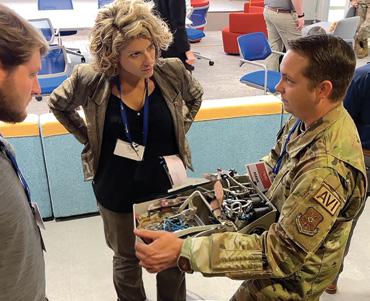
THE CYBER INNOVATION CENTER (CIC) located in Bossier City and STRIKEWERX, Air Force Global Strike Command’s innovation partners, are contracting with AEXA Aerospace to redesign B-52 testing equipment. AEXA Aerospace, a company that provides solutions for training and operational support, will produce a prototype to update the Electronic Warfare Pressurizing Test Set. The EWPTS wants to update the current equipment as its underperformance affects crew safety and mission fleet availability. “This equipment performs pressure testing for the B-52’s airborne defense system by simulating environmental conditions the aircraft encounters during actual operations. It is a vital piece of equipment on aircraft that is itself vital to our nation’s defense,” says Steven Arnold, EWPTS project manager for CIC. “I am proud to have played a part in securing a potential solution for our partners in the command.”
The largest refining catalyst plant in the world is expanding. Shell announced a $121.7 million expansion to boost output at its Port Allen catalyst manufacturing plant. The expansion is expected to create 17 direct jobs and 57 indirect jobs. Preliminary construction on the project began earlier this year, equipment installation begins in September 2024 and final product testing is expected by the end of that year.
“Shell Catalysts & Technologies has a more than 13-year history of operation at Port Allen that has provided jobs for over a decade and made the site a world-class catalyst manufacturing facility,” said Elise Nowee, vice president of Shell Catalysts & Technologies. “The company’s investment is another testament of our commitment to the state of Louisiana as a prime location for doing business.”



PICTURE THIS...Fat Tuesday in New Orleans meets an LSU vs. Alabama matchup in Death Valley on a Saturday night. That’s what Spain’s Running of the Bulls could be compared to, according to Arthur Dupre.
As many are aware, the Running of the Bulls is part of the annual San Fermín Festival in Pamplona, during which six bulls are released into the cobblestone streets to be corralled to the city’s bullring. Participating runners, like Dupre, attempt to dodge the angry bulls en route to the final destination. Without getting trampled or speared.
“I’m an adrenaline junkie,” says Dupre.
“Whether it’s skydiving in the Swiss Alps, or running with the bulls, I’m always looking for that next action adventure.”
In 2011, during his first Running of the Bulls experience, Dupre chose to run with the Spaniards, which meant being closest to the charging animals.
“What’s the point in playing it safe?” says Dupre. “I came to Pamplona to see the bulls, so I ran into the arena twice. You’re so close to them that you can feel their breath. It was awesome.”
On that same trip, Dupre travelled from Pamplona to Paris, and then to Normandy for French Independence Day celebrations. From there he went to Interlaken, Switzerland, a town nestled in the Swiss Alps, which also happens to be one of the most famous skydiving destinations in the world. Yes, he jumped.
Despite this jet-setting, Louisiana always lures Dupre home. Born and raised in Kenner,
he is the oldest boy of eleven brothers and sisters. His mother was a public-school teacher and his father was an attorney. He credits his parents for his love for travel. Growing up, the Dupre family (all thirteen of them) took road trips all over the country, “National Lampoon’s Vacation style.”
“I’ve been incredibly blessed to travel and see some of the most epic corners of the planet,” says Dupre. “But Louisiana has always been home, and that’s because of family.”
Family also is what drives Dupre in his role as president and CEO of Arete Scholars and as the 2023 LABI Emerging Leaders Council (ELC) chair. Dupre hopes under his leadership the ELC can be a catalyst for positive change across industries.

“We want Louisiana to be home, to be able to raise a family here, build a business here and feel safe. But most importantly, we want to know that we’re leaving the state in better hands for our kids.” ■

The fall elections are critical to Louisiana’s future. With significant political turnover transpiring at the state level, the opportunity for change is in the hands of the voter. Bold new leaders can buoy our state back to life and influence the future of Louisiana for generations to come. Here’s what LABI board members want voters to remember.
“I hope that the people of Louisiana keep in mind how blessed this state is with so many assets. Who will really lead and help us show the rest of the nation just how darn great we are?”
STEPHEN TOUPS, CEO, Turner Industries

“Now more than ever, it’s important to not be just a voter, but a wellinformed voter. Be patient and learn what Louisiana needs to become the economic leader of the South! Your vote matters. Make it count!"
LAUREN GIBBS, CEO, Gibbs Construction
"As Louisiana voters go to the polls this fall, it is important to remember that we need leaders who are aware of the issues that influence the success of our state. We need leadership with experience to address concerns related to workforce quality, tax reform, insurance costs, education, and crime. Positive impact in these areas will promote a business-friendly environment and enhance the quality of life for generations to come.”
ORIC WALKER, President, Atmos Energy Louisiana Division
“Growing private sector jobs is key to giving families a chance to build better lives. Choose candidates who believe in free enterprise – those who will help Louisiana-owned businesses grow.”
JOE ZANCO, President & CEO, Catalyst Bank
"Voters should consider their personal values, the needs of their local community, and make informed decisions among candidates to advance education and the creation of new jobs statewide."
MATT SAURAGE, Chairman, Community Coffee CompanyWe’ve all witnessed that when citizens, business leaders and government officials work together, Louisiana prospers. Job numbers grow, communities flourish and the economy thrives. When that partnership breaks down, those jobs and opportunities fade. There is one thing I know for sure, there isn’t a candidate or incumbent in Louisiana today that doesn’t want more jobs. And we (at Sasol) are eager to work with them to make Louisiana a place where people want to work and companies want to invest.”
KIM CUSIMANO, Director, Corporate Affairs, Sasol
“Louisiana’s industry is well-positioned to supply global energy demand and to reduce emissions in a net-zero future. The unprecedented opportunity for new investment in Louisiana will need collaboration between state and local governments, businesses, community leaders and regulatory agencies. Voters should choose a new governor who will actively champion Louisiana as a global energy leader.”
CHARLES DABADIE, Americas Regional Manufacturing Manager, Baton Rouge Refinery“Democrat or Republican, voters need to focus on candidates’ positions on issues that affect small business. Small businesses employ more Louisianians than big businesses, and we need a governor and legislators who will work together to improve the legislative and regulatory environment so that small businesses can hire more, pay our employees more, offer better benefits and invest more in training.”
JOHN OVERTON Owner and CEO, Turn Key Solutions


“Each voter should know the key policy and political positions that are being promoted and supported by the candidate and what achievable plan is being proposed to make Louisiana a better, safer and more favorable environment for job and career opportunities, with an enhanced quality of life for all citizens and future generations.”
J.H. CAMPBELL JR., Manager, Client Consulting Services“We need smart leadership that represents more than just a faction or extreme positions. We must significantly change course if we are to stop the talent exodus. Better than average educational opportunities, continued tort reform and enhancing business growth are our opportunities. All three must have fervent support from our next governor.”
SCOTT POOLE, President and COO, MARTCO
“Louisiana voters need to demand candidates give specific answers to two questions. First, what can we do to be among the businessfriendly states in the country? And second, what is it going to take for Louisiana to be among the growth states in the South?”
PHILLIP ROZEMAN, President, Willis-Knighton Cardiology
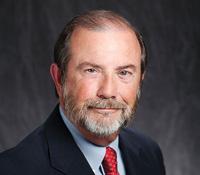

“We need the citizens of Louisiana to elect a governor who will interact, collaborate and create a synergistic relationship with the members of our legislature, so together they can provide the needed solutions and lift Louisiana to its fullest potential.”
RAY LASSEIGNE, President, TMR Exploration, Inc.“Voting is a privilege! Make sure your voice is heard so Louisiana can continue putting our best foot forward. The leaders we elect today will determine the future opportunities for our children and grandchildren. We can’t afford to be silent.”
JESSICA BREAUX, Senior Manager, Economic Development, Amazon
“I consider it critically important to elect a candidate who has the greatest likelihood of resolving many of the significant headwinds facing our economy. A vibrant and prosperous business community is a primary contributor to individual prosperity and well-being, and to the ability to keep our best and brightest talent here at home – where they would like to be and where they belong.”
TERRY BAUGH, CFO, D & J Construction Company, Inc.“When Louisiana voters step into the voting both this year, I am counting on them to remember that while their vote is personal to them – it is also impactful to our communities. They know their families, their communities, and the business and job opportunities available to them better than anyone else. Their life experiences inform their votes. Their voices matter, and I applaud them for being heard.”
DAVID AUBREY, President, AT&T Louisiana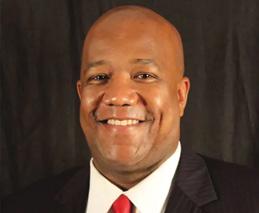
“Louisiana leads the country in supplying a clean, secure and affordable energy source across the globe via U.S. liquefied natural gas (LNG) exports. This industry supports thousands of jobs and provides long-term growth opportunities throughout our communities. This election season, voters should remember the incredible growth this industry has offered Louisiana, and we must seize the chance to continue capitalizing on this opportunity as we transform the future of energy.”
LAURA FERRELL, Government and Public Affairs, Cheniere Energy, Inc.
“Louisiana ranks last or next to last in all the bad things that other states exceed in. And nothing changes. We will come to the same conclusion that others have had, that we must have a bold change in the way Louisiana state and local government works and its economy operates. Commit to considering candidates that support bold changes for Louisiana to succeed but, furthermore, holding those candidates to their pledge.”
TIM STINE, CFO, Stine Lumber Company
“Make certain that the people you pull the levers for have the ability and the desire to fix BAD PUBLIC POLICY. Also, remember that at LABI we initiate and support GOOD PUBLIC POLICY! That is why our efforts and initiatives are so very important.”
TOM O’NEAL, President, O’Nealgas, Inc.
“I would like voters to consider which candidate will best move the state forward educationally and economically to compete with our neighboring states and allow our children the opportunity to live and prosper in Louisiana.”
 BOBBY BAROUSSE CFO, Elmer Candy Corporation
BOBBY BAROUSSE CFO, Elmer Candy Corporation
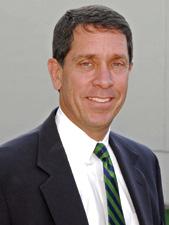
“Vote for Substance over Slogans. Consider the importance of electing a governor who can solve problems. We need a governor who can think critically, develop and articulate effective policies and deliver on initiatives that make Louisiana a better place to live, work and grow a business.”
TOM COX, President, Golfballs.com, Inc.“I would like Louisiana voters to remember to vote, and vote for candidates that will drive economic development back to our state, make our state a more competitive place for business, and fix our complicated tax code.”
SCOTT BALLARD, Founder, Ballard Brands

“Louisiana voters should step into the voting booth with an open mind, not consumed with partisan politics, but to consider which person truly has the good of the state, the people of the state and the good of our country at the top of their priorities. Not someone who is more worried about image and personal gain. Remember the words 'We The People’.”
BRYAN HANKS, President, Beta Land Services
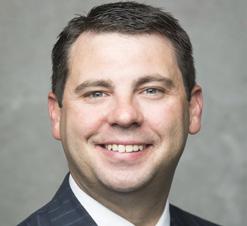
“I want voters to close their eyes and think about the Louisiana they want for their children. That is what my wife and I will do. Whether it is a job in the energy economy or a safe neighborhood to call home, we must elect public servants who will help us make our vision for our children a reality.”
TOMMY FAUCHEUX, President, Louisiana Mid-Continent Oil & Gas Association“Addressing vital matters like education, infrastructure, and economic development will bring lasting, transformative changes. Thoughtfully vote for candidates who prioritize progress and innovation, shedding outdated perceptions to reveal Louisiana's true potential. Together, let's forge a thriving state, setting an inspiring example for the entire nation.”
TYLER GRAY, Director of Government Relations, Placid Refining Company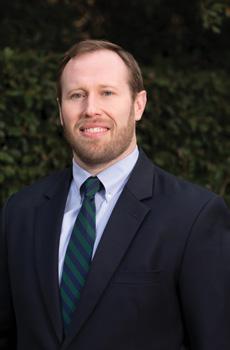
“Our voters need to embrace those individuals who are willing to be part of a holistic plan designed to address deep-rooted issues with education, taxation, top-tier job creation and retention, public safety and quality of life, outmigration and the loss of a talent pool often consisting of our family and friends.”
WAYNE FONTANA, Managing Partner, Roedel, Parsons, Blache, Fontana, Piontek & Pisano
ARE MORE IMPORTANT THAN EVER.
We craft the stories that educate, captivate, and motivate the people of the Gulf South. We have chosen to stay and build so we can speak directly to the people most important to us.




Rep. Garret Graves (R-LA) spoke on May 31 at the U.S. Capitol following the House vote on the Fiscal Responsibility Act. That day, the House voted to raise the federal debt limit, moving the country a step closer to eliminating the threat of calamitous credit default. Chair of the House Republican Conference Congresswoman Elise Stefanik, U.S. House Majority Leader Steve Scalise (R-LA), U.S. House Speaker Kevin McCarthy (R-CA) and Republican debt limit negotiator Representative Patrick McHenry (R-SC) listen on.

Congressman Garret Graves, from Baton Rouge, has been thrust into the national spotlight this year thanks to his appointment to Speaker Kevin McCarthy’s leadership team and his tackling of high-profile political dramas including
energy and federal debt. We caught up with him recently to check in on this self-described policy “nerd” on the new pace and the political possibilities.
How did you become Speaker Kevin McCarthy’s wingman?
I've had the opportunity to work with him on and off over the years. However, in January I was bothered that the American public had elected a Republican majority, but folks couldn't come together and determine a speaker. No one asked me to get involved. I just started talking to different people on my own and ultimately was able to help navigate getting the speaker over the finish line. After seeing me work with others and help to devise a path forward, Speaker McCarthy asked me to get involved with other negotiations.
There was a nearly 100-day period where the president’s team refused to have follow-up meetings with the speaker, because they wanted to use the backstop of the June 1 deadline to force us into agreeing to a deal that would continue this reckless spending spree. At the time, I was involved in daily meetings with Speaker McCarthy. One day he turned to me and said “Hey, I want you to lead these negotiations.” I think he believed that my experience in other big negotiations was something that could be very helpful, and it was an incredible experience and opportunity. The gravity of it, thinking about the fact that if we were unsuccessful, this could have caused trillions of dollars in losses in people's retirement accounts and stock portfolios, and it would have driven up the cost of borrowing for someone who wanted to buy their first car or house. That was a weight on our shoulders throughout the process. I’m very proud of where we landed.
How has this position in the House Republican Conference changed your role in Congress? What does your day-today look like now? I have multiple meetings each day with the speaker where he gives me individual tasks to work through. One of the first ones was trying to negotiate better earmarking criteria, where funds weren’t being spent on bad ideas and projects but spent on things that truly provide a return on investment to taxpayers. Another big role he's given me is to work with the different caucuses that represent a wide spectrum of ideology, as well as this group that he calls the "Five Families,” which is a larger representation of the various ideologies. We are talking with those folks on a regular basis about what's coming up, addressing their concerns, figuring out if there are any landmines and just trying to avoid stalemates, because with our small majority in the House, we can’t afford to waste time. If we get blindsided with concerns, then it can cause an entire week to be wasted.
Let's talk 2024 priorities. What are folks in your district concerned about heading into the fall? Some of the things we continue to hear about are traffic problems, flood protection, and drainage, but honestly the biggest complaints concern insurance problems. It used to be that we would hear about auto insurance rates, but now it’s property insurance because we’ve had so many insurance companies pull out of the state. The chronic crime problem is something we always hear from folks about, and it seems like it’s only getting worse. And then I think rounding the list would be inflation and high interest rates, and just how expensive it is to even buy groceries. ■
FREE ENTERPRISE AWARDS:
PRESENTED BY:
THURSDAY, NOVEMBER 9
6 PM | 500 MAIN STREET
BATON ROUGE, LA 70801
SPONSORSHIP OPPORTUNITIES AVAILABLE PLEASE CONTACT ELENA LACOUR AT ELENAL@LABI.ORG
LABI.ORG


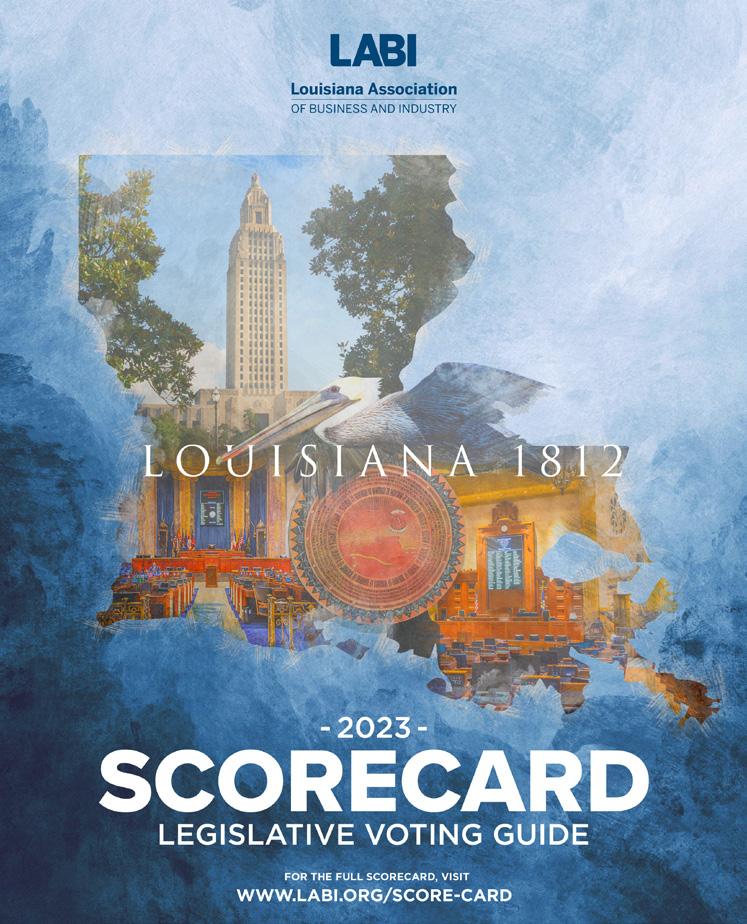
Another year, another stalemate on school choice. Education reform remains one of LABI’s top priorities and we will continue our efforts to boost outcomes for students next term. Education Savings Accounts (ESAs) were again stalled by lawmakers, leaving parents with limited options to educate their children in a manner that suits their individual needs. Despite these missed opportunities, fiscal transparency measures for schools finally became law, bringing school systems in line with other state agencies in terms of transparency and accountability to taxpayers. A bill prohibiting the promotion of third graders who failed to pass reading assessments also cleared both chambers and was signed by the governor after being derailed in the Senate last year. LABI and our partner education reform advocates successfully defended against attacks on flexible education
options, charter schools and accountability. LABI supported legislation to dedicate a portion of unspent federal COVID relief funding to expanding accelerated intervention for low-performing students in reading and math, helping to bring students who fail to achieve mastery on their statewide assessments up to speed.
Education and workforce development will be a major issue for LABI in the upcoming elections as we seek to promote the implementation of the bold policies detailed in LA23, with the ultimate goal of expanding access to early childhood education, providing parents with high quality education options that meet the needs of their children, and better alignment between high school, post-secondary education and workforce opportunities.
This bill would have created an ESA for students with exceptionalities. A vote FOR the bill was a vote WITH LABI.
House Vote: 94-3
HB 12
BY REP. RICHARD NELSON (R-MANDEVILLE)This bill prohibits the promotion of students to the fourth grade whose reading deficiencies have not been remedied by the end of the third grade, after numerous interventions. A vote FOR the bill was a vote WITH LABI.
House Vote: 88-15
Senate Vote: 28-11
This bill would have created a universal ESA program and expanded the ability of parents to enroll children in the public school of their choice. A vote FOR the bill was a vote WITH LABI.
House Vote: 61-37
This bill adds Financial Literacy as a required course for high school students. A vote FOR the bill was a vote WITH LABI.
House Vote: 97-0
Senate Vote: 35-2

This bill requires public school governing authorities to post financial information on their websites, making it easily accessible for taxpayers. A vote FOR the bill was a vote WITH LABI.

House Vote: 97-1
Senate Vote: 37-1
This bill would have placed burdensome regulations on learning pods. A vote AGAINST the bill was a vote WITH LABI.
Senate Vote: 15-23
While this was a fiscal-only session—which limits lawmakers to filing only five non-tax related bills—and tax reform was a hot-button issue prior to session, there was not much appetite in the Legislature for any major reforms given the dynamics of an election year and a hesitancy to pass additional reforms before the impact of the 2021 tax reforms are known. Efforts to reform Louisiana’s complicated and overly burdensome tax code fell flat, but sparked debate and conversation about reforms to increase our state’s competitiveness—chief among them the elimination of the state income tax. Several efforts to limit credits, exemptions and deductions were brought in an attempt to raise state revenue, but were opposed by LABI because they were not part of a holistic approach to tax reform.
The debate over whether to lift the state’s constitutionally mandated expenditure limit in light of millions in excess and surplus revenue took centerstage throughout the session and led to heated debate in the days leading up to sine die.
Higher-than-expected tax collections coupled with surplus revenue—in part arising from federal pandemic aid—provided the Legislature with a windfall to spend over the next two budget years. However, accessing these monies would require a twothirds vote of both chambers to exceed the expenditure limit. LABI coordinated with other fiscally conservative groups as a coalition in opposition to the resolution to lift the spending cap (SCR 3 by Senate President Page Cortez). Some senators and many House members were
unwilling to vote to bust the spending limit at the outset. The version of HB 1—the main budget bill for the state— sent to the Senate by the House focused on remaining within the budget cap by using dollars to pay down a portion of teacher retirement debt, setting up local school boards to provide teacher pay raises from the savings obtained as a result. Teachers objected to this approach, arguing that school boards might not provide the promised raises. Meanwhile, Senate leadership was interested in busting the cap to use the monies for infrastructure and projects back home. Thus, a contest of wills ensued between the chambers that paralyzed the budget process for close to a month. Immense pressure was exerted on legislators by the governor’s office, Senate leadership, teachers unions, and local officials.
The Legislature ultimately passed SCR 3 to bust the cap, though at a much lower level than Senate leadership originally proposed. In the waning minutes of session, legislators in both houses were rushed into approval of final versions of the budget bills HB 1 (the state operating budget), HB 2 (the state infrastructure budget), and HB 560 (the state supplemental budget) with little to no idea what was in these instruments. In the end, legislators adopted a total spending package for the 2024 fiscal year of nearly $51 billion. However, the chaotic and contentious conclusion to the session–coupled with the discovery of some unintended budget changes–left no doubt that significant adjustments must be made to the Legislature’s budgetary procedures in the next term.
This bill would have required a two-thirds vote of the Legislature to provide taxpayers with tax relief through exemptions, exclusions, deductions, credits, or rebates. A vote AGAINST the bill was a vote WITH LABI.
House Vote: 27-67
A win for transparency in the litigation process was met with the governor’s veto pen. A bill that would have required the disclosure of third-party litigation financing agreements cleared both chambers with overwhelming support. However the governor subsequently vetoed the bill, purporting that it “only requires plaintiffs to unilaterally disclose their commercial legal financing arrangements.” The bill, in fact, applies to all parties in civil litigation, not just plaintiffs. This bill would have leveled the playing field by revealing any party that may receive a percentage of the financial settlement or judgment from the litigation. LABI was disappointed by the veto of this common-sense legislation but will continue to advocate for smart reforms to our legal system.
Addressing Louisiana’s insurance crisis was a major focus for LABI this session as citizens continue to face limited availability of insurers and skyrocketing rates after being battered by natural disasters over the last two years. Most efforts to expand the market to entice insurers to write policies in Louisiana were met with fierce opposition and ultimately failed to make it through the process.
Another bill aimed at attacking insurers would have prohibited the cost of advertising—a necessary business expense—from being included in setting rates for insurance. A robust, competitive market is the best way to improve Louisiana’s insurance affordability and availability. This type of legislation would instead discourage more insurers from providing insurance in Louisiana.
LABI-supported legislation attempting to reform the bad faith statute for property insurance would have been a significant step forward to remedying Louisiana’s insurance crisis, but was gutted of critical provisions on both the House and Senate floors with poison pill amendments. The bill as originally drafted would have provided much-needed clarity for policyholders and insurers to ensure the claims process was resolved quickly and with clearly identifiable obligations for all parties. The ambiguity of the current bad faith statute only benefits attorneys who have a financial stake in the litigation and exacerbates challenges policyholders face regarding knowledge of their obligations and the insurers’ obligations, and the timeline for the claim resolution.
On the judicial front, modernizing Louisiana’s court system hit another roadblock amid opposition from clerks of court. A bill to require the creation of a unified electronic filing system for the state was parked in committee by the author after his numerous attempts to come to a resolution that was agreeable for all parties. This would have been a monumental step in modernizing our judicial system, which is largely still using fax as the primary filing method. For those courts utilizing electronic filing, few are operating on the same system, creating a hodge-podge of e-filing systems. On a positive note, one important step forward in modernizing Louisiana’s judicial system was the passage of legislation allowing for electronic signatures by judges. LABI applauds the strides made by lawmakers to modernize our judiciary, but there is still much work to be done Louisiana’s judicial system into the 21st century.
This bill would have prohibited the inclusion of insurers’ advertising expenses in the rate-setting process. A vote AGAINST the bill was a vote WITH LABI.
House Vote: 27-68

This bill in its original form by Rep. Mike Huval (R-Lafayette) would have made several changes to the bad faith statute for property insurance, making critical clarifications for policyholders and insurers on their obligations in the claims process. The amendment by Sen. Allain stripped the bill of these clarifications. A vote AGAINST the amendment was a vote WITH LABI.
Senate Vote: 25-13


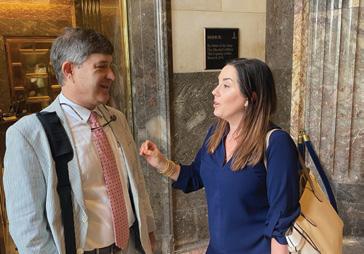
This bill provided for the disclosure of litigation financing agreements. A vote FOR the bill was a vote WITH LABI.
House Vote: 55-28
Senate Vote: 27-12
Carbon capture was the hot-button issue in the energy space this session, and one of LABI’s top priorities was killing anti-carbon capture and sequestration (CCS) legislation. There were roughly ten bills seeking to limit or prohibit carbon capture in Louisiana, sending the message to the rest of the world that Louisiana is not open for business—despite being five-plus years ahead of other states for investment in CCS technology due to favorable geological conditions, existing pipeline infrastructure and operating facilities, and a skilled energy workforce.
The majority of these measures failed to make it through the House Natural Resources and Environment Committee, with only two bills being brought to the
full House for debate. Both bills failed to pass as members supported energy innovation critical to the long-term viability of the oil and gas industry as well as bringing the potential of more than $13 billion in investment to our state.
LABI successfully defeated a variety of mandates aimed at energy employers that would have stifled competition, including real-time air monitoring for petrochemical facilities. The bill would have mandated data be collected and stored for five years and triggered alerts to the public when air quality reached certain levels— causing unnecessary fear among the public and placing a significant financial burden on industry, which already monitors for chemicals of concern.
This bill would have placed a moratorium on carbon dioxide sequestration projects on Lake Maurepas and the Maurepas Swamp Wildlife Management Area. A vote AGAINST the bill was a vote WITH LABI.
House Vote: 24-75
This bill would have prohibited the permitting of certain above-surface structures on Lake Maurepas and Lake Pontchartrain, effectively prohibiting carbon capture projects. A vote AGAINST the bill was a vote WITH LABI.
House Vote: 27-72
While the session was primarily restricted to fiscal matters, legislators could still file up to another five bills of a general nature. Often, those bills deal with issues they believe will resonate with key constituencies within their districts. Not surprisingly, this includes certain members of the workforce who want government or legal intervention on their behalf. This year saw the normal number of such bills for a legislative election year – 15 instruments. Of these, a single bill (SB 200 by Sen. Royce Duplessis regarding cancer testing) made it through to enactment, after the author accepted substantial amendments proposed by LABI to remove our opposition.

LABI effectively sidelined numerous bills this session that sought to impose new requirements on employers, including the perennial attempt to impose a statewide minimum wage—a bill that was reported without action in Committee and on the Senate Floor, a procedural move to pass the bill to third reading and final passage failed, ultimately resulting in the bill being withdrawn from the files of the Senate. That vote is among those counted in this year’s Scorecard. All other employee relations legislation harmful to job creators died or was defeated in committee.
This bill would have provided for a state minimum wage. In a procedural move, a motion was made to move the bill to third reading and final passage, rather than the bill being withdrawn from the files of the Senate. A vote to REJECT moving the bill to third reading and final passage was a vote WITH LABI.
Senate Vote: 13-25
MOST VALUABLE POLICYMAKERS (MVPS):
SEN. HEATHER CLOUD REP. JONATHAN GOUDEAU
REP. BEAU BEAULLIEU REP. WAYNE MCMAHEN
REP. RICK EDMONDS REP. THOMAS PRESSLY
REP. BARBARA FREIBERG REP. TROY ROMERO
REP. RAY GAROFALO REP. LAURIE SCHLEGEL
• MOST VALUABLE POLICYMAKERS (MVPS): SCORED 100 PERCENT ON THE LEGISLATION IMPORTANT TO LABI AND THE STATE’S EMPLOYERS.
• ALL-STARS: SCORED 90 PERCENT OR HIGHER ON THE LEGISLATION IMPORTANT TO LABI AND THE STATE’S EMPLOYERS.
• HONORABLE MENTIONS: SCORED 80 PERCENT OR HIGHER ON THE LEGISLATION IMPORTANT TO LABI AND THE STATE’S EMPLOYERS.
ALL-STARS: 90%+
PRESIDENT PAGE CORTEZ SEN. BODI WHITE REP. GABE FIRMENT REP. BUDDY MINCEY
SEN. MARK ABRAHAM SEN. GLEN WOMACK REP. BRYAN FONTENOT REP. RICHARD NELSON
SEN. BRET ALLAIN REP. BERYL AMEDEE REP. LARRY FRIEMAN REP. JOE ORGERON
SEN. LOUIE BERNARD REP. TONY BACALA REP. FOY GADBERRY REP. CHUCK OWEN
SEN. STEWART CATHEY REP. RYAN BOURRIAQUE REP. LANCE HARRIS REP. BOB OWEN
SEN. MIKE FESI REP. RHONDA BUTLER REP. DODIE HORTON REP. ALAN SEABAUGH
SEN. FRANKLIN FOIL REP. DEWITH CARRIER REP. MIKE HUVAL REP. RODNEY SCHAMERHORN
SEN. CAMERON HENRY REP. JEAN-PAUL COUSSAN REP. JOHN ILLG REP. VINNEY ST. BLANC
SEN. SHARON HEWITT REP. RAYMOND CREWS REP. MIKE JOHNSON REP. JOHN STEFANSKI
SEN. PATRICK MCMATH REP. PAULA DAVIS REP. TIM KERNER REP. PHILLIP TARVER
SEN. BARRY MILLIGAN REP. DARYL DESHOTEL REP. TANNER MAGEE REP. POLLY THOMAS
SEN. ROBERT MILLS REP. PHILLIP DEVILLIER REP. DANNY MCCORMICK REP. CHRIS TURNER
SEN. BETH MIZELL REP. MARY DUBUISSON REP. JACK MCFARLAND REP. DEBBIE VILLIO
SEN. MIKE REESE REP. MICHAEL ECHOLS REP. SCOTT MCKNIGHT REP. BILL WHEAT
SEN. BARROW PEACOCK REP. JULIE EMERSON REP. BLAKE MIGUEZ REP. ‘ZEE’ ZERINGUE
SEN. KIRK TALBOT REP. LES FARNUM REP. GREG MILLER
HONORABLE MENTIONS: 80%+
SEN. BOB HENSGENS REP. STUART BISHOP REP. BARRY IVEY REP. FRANCIS THOMPSON
SEN. JAY MORRIS REP. KATHY EDMONSTON REP. SHERMAN MACK REP. MALINDA WHITE
SPEAKER CLAY SCHEXNAYDER REP. STEPHANIE HILFERTY REP. NICHOLAS MUSCARELLO REP. MARK WRIGHT
REP. LARRY BAGLEY REP. VALARIE HODGES REP. NEIL RISER
{*} SCORES CALCULATED WITH HOUSE SCORES
A CUMULATIVE SCORE COULD NOT BE CALCULATED FOR THE FOLLOWING LEGISLATORS BECAUSE THEY WERE NOT VOTING
FOR MORE THAN TWO YEARS.
MOST VALUABLE POLICYMAKERS (MVPS):
100%
PRESIDENT PAGE CORTEZ REP. BEAU BEAULLIEU REP. RAYMOND GAROFALO REP. JOE ORGERON
SEN. LOUIE BERNARD REP. DEWITH CARRIER REP. JONATHAN GOUDEAU REP. THOMAS PRESSLY
SEN. HEATHER CLOUD REP. PAULA DAVIS REP. DODIE HORTON REP. TROY ROMERO
SEN. FRANKLIN FOIL REP. MICHAEL ECHOLS REP. MIKE HUVAL REP. LAURIE SCHLEGEL
SEN. CAMERON HENRY REP. RICK EDMONDS REP. JOHN ILLG REP. ALAN SEABAUGH
SEN. CALEB KLEINPETER REP. JULIE EMERSON REP. TIM KERNER REP. 'VINNEY' ST. BLANC
SEN. PATRICK MCMATH REP. LES FARNUM REP. JACK MCFARLAND REP. POLLY THOMAS
SEN. BARROW PEACOCK REP. GABE FIRMENT REP. SCOTT MCKNIGHT REP. DEBBIE VILLIO
SEN. KIRK TALBOT REP. BRYAN FONTENOT REP. WAYNE MCMAHEN
SEN. GLEN WOMACK REP. BARBARA FREIBERG REP. BLAKE MIGUEZ
ALL-STARS: 90%+
SEN. STEWART CATHEY REP. FOY GADBERRY REP. FRANCIS THOMPSON
REP. RAYMOND CREWS REP. MIKE JOHNSON REP. JOHN STEFANSKI
HONORABLE MENTIONS: 80%+
SEN. MARK ABRAHAM SEN. BETH MIZELL REP. JEAN-PAUL COUSSAN REP. CHUCK OWEN
SEN. BRET ALLAIN SEN. JAY MORRIS REP. DARYL DESHOTEL REP. BOB OWEN
SEN. PATRICK CONNICK SEN. MIKE REESE REP. PHILLIP DEVILLIER REP. RODNEY SCHAMERHORN
SEN. MIKE FESI SEN. JEREMY STINE REP. KATHY EDMONSTON REP. CHRIS TURNER
SEN. BOB HENSGENS REP. BERYL AMEDEE REP. LANCE HARRIS REP. MALINDA WHITE
SEN. SHARON HEWITT REP. TONY BACALA REP. VALARIE HODGES REP. 'ZEE' ZERINGUE
SEN. EDDIE LAMBERT REP. STUART BISHOP REP. JASON HUGHES
SEN. BARRY MILLIGAN REP. RYAN BOURRIAQUE REP. C. TRAVIS JOHNSON





















 BY MARK LORANDO
BY MARK LORANDO
or existing small business owner, the news headlines over the last few months could hardly be more discouraging.
The Wall Street Journal: “Rising Interest Rates Put Small Business Owners’ Plans on Hold.”
Forbes.com: “Rising Interest Rates Lead to a Small Business Credit Crunch.”
Even overseas media outlets took note. Wrote the UK-based Guardian: “The Biggest Challenge Facing U.S. Small Businesses? Rising Interest Rates.”
Lost in the midst of all that bad small business news was the glimmer of hope found in last December’s seemingly mundane announcement about the revival of an old U.S. Treasury program – the State Small Business Credit Initiative, or SSBCI.
Congress established the first SSBCI in 2010 to increase small business owners’ and entrepreneurs’ access to capital in all 50 states. The American Rescue Plan Act of 2021 reauthorized and expanded SSBCI to the tune of $10 billion. Louisiana will get up to $113 million.
Though intended as a post-pandemic economic stimulus, in Louisiana it offers a potential solution to a more recent challenge: a soaring prime interest rate that is choking the business lending pipeline.
“Louisiana’s SSBCI programs were designed to help small businesses overcome exactly this kind of obstacle,” says Louisiana Economic Development Assistant Secretary Brenda Guess, who is overseeing the administration of the program for the state. “The biggest misconception about SSBCI is that it’s a government
grant program. It’s actually a collaboration among the federal government, the state and private financial institutions. By connecting private entities to public funding, we empower borrowers and founders, and energize lenders and early-stage investors.”
Each state is responsible for setting its own program parameters. Louisiana created five separate programs: two that provide matches for private equity investments in new and early-stage ventures; three that increase small business borrowing power by reducing lender risk. (See program details on page next page.)
Which brings Guess back to those higher interest rates. “They’re going to be with us for a while,” she says. “What SSBCI does is allow a borrower to say to a lender: ‘Yes, I am short on collateral.’ Or, ‘Yes, I am seeking a loan that is larger than you would normally approve.’ And, ‘Yes, there’s a credit crunch affecting the entire banking industry. But the SSBCI program has our backs.’ That can ultimately be the difference between a small business growing, or closing.”
As with any federal program, navigating the program rules and regulations is potentially daunting for small business owners, as well as participating private sector providers. To help them make sense of it all, LED has created a website that contains detailed program pages, FAQs, approved and preferred provider lists and contact info, explainer videos and even an interactive quiz. Check it out at LouisianaSSBCI.com.
But first, explore the infographic on the following pages and get the answer to the most important question: How can SSBCI help your business? ■
SSBCI is not a grant program. It is a federal economic stimulus, administered by states, that makes it easier for entrepreneurs to borrow money or attract equity investments that can grow or launch their businesses.
Louisiana Economic Development (LED) does not process applications or distribute funds. Those functions are handled entirely by private equity funds and financial institutions, working directly with borrowers and prospective equity partners. The state, through LED, handles program oversight, provider support, and U.S. Treasury rules compliance.
Louisiana has five different sources of SSBCI funding, each offering a solution to a different kind of capital access challenge. So, the first step is identifying which program best suits your business and financial plan:
For very small businesses and startups with smaller start-up or expansion financing needs, such as workingcapital or equipment/inventory acquisition.
• Minimum Loan Amount: $1,000
• Maximum Loan Amount: $100,000
Establishes pledged cash collateral accounts for small business borrowers who need to borrow larger amounts than the Micro Loan Program offers, but have difficulty getting approved due to a collateral shortfall.
• Maximum Loan Amount: $1 million
• Maximum Collateral Support Amount: $250,000
• Minimum Equity Requirement: 10%
Reduces lender risk and increases borrowing power for new and expanding businesses seeking a major infusion of capital by providing a loan guaranty to banks and other financial institutions.

• Maximum Guaranty: 80% or $1.5 million
• Minimum Equity Requirement: 15%
Invests capital in an existing business in exchange for investor involvement in the venture.
Not all small businesses are eligible. Your application will not qualify for SSBCI funds if any of the following describes your business:
• Bar, saloon and other establishment selling/distributing alcoholic beverages
• Gaming or gambling
• Pyramid sales
• Financial services
• Speculative real estate

Invests capital in a start-up or early-stage business in exchange for investor involvement in the venture.
• Involving activities prohibited by federal law including marijuana
• Recreation park, theme park, amusement park or camping facility
• Restaurant, grill, cafe, fast food operation; motorized vehicle, trailer, curbside, sidewalk or street vendor food operations in the business less than two years
After identifying the program or programs that suit your needs, go to LouisianaSSBCI.com, click on the name of your program, and contact one of the approved or preferred providers listed there. Alternately, you can contact your regular lender and ask if they are participating in SSBCI – and if not, they can find out how to do so on the LouisianaSSBCI.com Provider FAQs page.
KAREEM ABDUL-JABBAR got itchy fingers in August. As he typed his final Substack newsletter before a vacation, he wondered: What if I don’t have a job when I came back? The source of the NBA Hallof-Famer’s fear was AI.
“The proliferation of Artificial Intelligence over the past year has turned many of us into jittery paranoids, constantly looking over our shoulder for when we will be replaced by a fancy algorithm,” he wrote.

Abdul-Jabbar is not alone. Business executives are bouncing the same existential question around their brains—to AI, or not to AI?
Consider KPMG. In March, the Big Four accounting firm surveyed 300 global executives and learned nearly 8 in 10 view AI as the most critical emerging technology they’ll adopt in the next five years.
By July, KPMG announced an expansion of its Microsoft partnership and a new $2 billion investment in AI and cloud services. The Wall Street Journal reported similar commitments by Big Four rivals: PwC ($1 billion), Deloitte ($1.4 billion), Ernst & Young ($1 billion). Accenture plans a $3 billion investment in data and AI.
Microsoft, spying the future, dwarfed those investments in early 2023 by plowing $10 billion more into OpenAI, a once-quiet research lab formed in 2015 to create safe AI tools.

On Nov. 30, 2022, OpenAI had introduced ChatGPT. The AI chatbot went viral. Millions prompted ChatGPT to compose music, pen résumés, write essays, solve tricky math problems, write and debug computer code, concoct food recipes, make jokes— even offer relationship advice. Stilted responses aside, ChatGPT handled the assignments with aplomb. And the world would never be the same.
Nine months later in North Louisiana, Craig Van Slyke pondered the AI frenzy while feeding the fish at his north Louisiana homestead. At Louisiana Tech University, he’s the Mike McAllister Eminent Scholar Chair in Information Systems. Earlier in the day, Van Slyke had prepped an AI lecture for a class taken by every junior in the College of Business. He’s also weaving AI content into the upcoming fifth edition of an information systems textbook taught in nearly 20 nations.
What precedent does Van Slyke see for the AI frenzy? His mind raced back to Christmas 1998, when e-commerce took hold with $2.4 billion in holiday sales. (By 2022, those seasonal sales soared to $212 billion). While writing a recent scholarly article, Van Slyke concluded generative AI holds the potential to be as disruptive as e-commerce in the late 1990s and early 2000s. In that era, Van Slyke recalls meeting venture capitalists who didn’t even require business plans (the investment money was flowing so freely).
“Where I see the parallel is that there were lots of bad ideas—a few good ideas—and some of the bad ideas got us to good ideas in the future,” Van Slyke says. “But at the end of the day, the world was just never the same. And I firmly believe that’s what’s going to happen with AI. It’s just not going to be the same.”
“Generative AI” processes data on a massive scale to generate text,
images, code and other content the human-user wants. That makes AI’s potential massive, Van Slyke says.
“We’ve got smart refrigerators now,” he said. “Imagine if there’s an AI that can look at what’s in your refrigerator and look at what’s a bargain in a grocery store. And you can push a button and it spits out a menu for your family for the week, optimized to your tastes and your budget—even your schedule.”
Few will think of it as AI, because the technology works in the background. In much the same way, Amazon assistant Alexa (along with Apple’s Siri and the Google Assistant) uses natural language processing to answer questions in an AI framework. After Jeff Bezos conceived of the Alexa-enabled Amazon Echo, his company struggled to perfect the technology until it acquired Polish startup Ivano for about $30 million, Wired magazine reported. A decade later, Alexa-enabled devices number more than 500 million worldwide.

Yet for every Ivano, there’s a Kite or Zume. After closing in 2022, Kite founder Adam Smith confessed his company entered the market 10 years too soon in 2014. Kite’s AI coding tools made programmers just 18% faster, and customers shrugged at the slight gain. Another Silicon Valley firm, Zume, raised nearly $500 million to empower robots and smart ovens to bake pizzas aboard delivery trucks. But before deliveries could reach customers, the chronic sliding of melted cheese off the pizzas doomed Zume. It closed in June.
Still, the first half of 2023 saw generative AI startups land $14.1 billion in equity funding, CB Insights reported, while funding across all AI stages reached $24.6 billion by mid year.
“The running joke in the valley right now is you come in with AI, and you’re going to get money,” says Andrew Schwarz, who’s a professor of information systems and decision sciences in LSU’s E.J. Ourso College of Business. Joking aside, there’s logic in why AI is emerging.
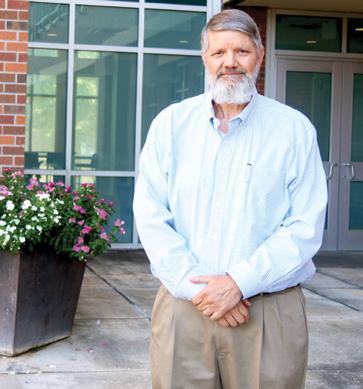

“If you look back over the past 10 to 15 years, what we saw is a heavy investment in cloud computing,” Schwarz says. “We saw organizations moving their technology from on-premises to the cloud. And we saw these huge data centers pop up from AWS and from Google, Microsoft and IBM.”

Before cloud computing, no one could access data at a scale large enough to power AI. And AI also requires graphics-intensive chips like those pioneered by Nvidia for gaming in 1999. Nvidia now dominates the AI chip market, has seen its stock price soar tenfold in four years, and boasts a market capitalization above $1 trillion. One reason: Precedence Research forecasts the AI chip market will expand from $22 billion now to $227 billion in 2032.
“Whether you’re a small business or a big business, you’re going to see AI,” says Schwarz, who joined an international team in 2021 to study what will motivate company executives to adopt AI. “In 20 years, this was the first study I’ve ever done that stopped me in my tracks, because the No. 1 driver of AI adoption for organizations was employee well-being.”
Prior studies always hewed to bottom-line gains in profitability and productivity, he says, but the AI re-

search points away from traditionally negative views of IT costs to “the bright side of technology.” Businesses will invest in AI to make work better for employees.
Innovation is something Laitram LLC has pursued for seven decades from its Harahan headquarters. With more than 3,800 employees and over $1 billion in annual revenue, Laitram is gauging AI’s potential to drive improvement, president and CEO Jay Lapeyre says.
“There’s a general confidence that the use will be significant as applied to information tools for all aspects of the business,” he says. “What’s less clear is how to organize structurally to efficiently capture the value. We plan to use a learn-by-doing and check-and-adjust approach with small steps until the picture is more clear.”
AI observers are closely watching a voluntary agreement secured by the Biden Administration in July. Seven AI heavyweights—including Google, Meta, Microsoft and Amazon—agreed to pursue safe, secure and trustworthy adoption of AI technology before releasing products.
There are geopolitical flares on the horizon, too. In June, billionaire Silicon Valley investor Marc Andreessen maintained in an essay that AI “is not going to come alive any
more than your toaster will.” But he added a darker note: “The single greatest risk of AI is that China wins global AI dominance and we, the United States and the West, do not.”
Two months later, Deputy Secretary Kathleen Hicks of the Department of Defense announced a generative AI task force and said, “The future of defense is not just about adopting cutting-edge technologies, but doing so with foresight, responsibility, and a deep understanding of the broader implications for our nation.”
--Andrew Schwarz, professor in LSU’s E.J. Ourso College of Business
LSU’s Andrew Schwarz sees high stakes for Lousiana, too. Tax and education policies must improve for the state to gain AI jobs and investment.
“I’d really like to encourage the state, at a policy level, to start to grapple with what this means for the future of workforce development,” Schwarz says, “because when I analyze the industries that I think are going to be most affected, they’re the predominant industries in our state.” ■

“Whether you’re a small business or a big business, you’re going to see AI.”
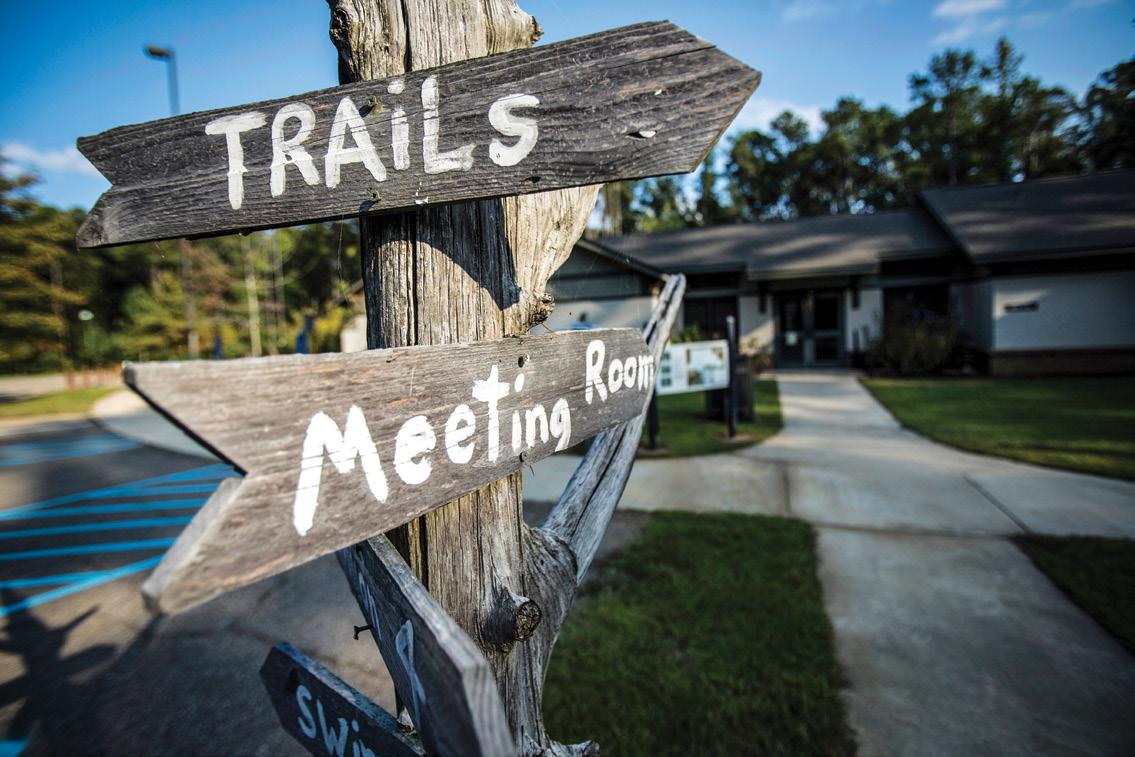



 BY SARA BONGIORNI
BY SARA BONGIORNI
THIS YEAR MARKS the 10th anniversary of Louisiana artist George Rodrigue’s death from cancer–the final page in a great American art story which featured his talent, determination, dedication and then his cultural explosion in popularity thanks to a simple blue dog on canvas, just one of many of Rodrigue’s signature subjects. His widow Wendy Rodrigue Magnus is determined to keep his spirit, and story, alive through an organization she launched in 2017—The Life & Legacy Foundation and Art Tour—to celebrate the life and art of her late husband.
Wendy piles the artist’s old truck with $1 million in paintings, then drives hundreds of miles to share his work with school children, sitting on the floor to be at eye level with the youngsters she meets. Her insistence on small gatherings—maybe 15 kids at a time—means it might take her a week to complete a visit to a single school. Wendy has visited 137 campuses across eight states so far and will add two more states this year. Since the foundation’s inception,
she’s brought the program to more than 60,000 students within schools and museums, many in Louisiana.
The outreach is greater than a simple art exhibit. Wendy wants the children to know that the artist from a small town in south Louisiana took up painting as a young boy when he was bedridden with polio. She wants his story to help them dream big, too.
“This is about inspiring children to be anything they want to be,” she says.
The foundation also organizes public exhibitions of Rodrigue’s artwork. Both endeavors involve a deeply personal mission that she shares with her second husband, artist and jewelry maker Douglas Magnus, Rodrigue’s longtime friend and artistic collaborator. The foundation grew out of an epiphany. Heartbroken and angry for years after Rodrigue’s death, Wendy realized that featuring the joy and optimistic outlook of his art could still be the focus of her life even after he was gone.
“George was magic,” she says. “It’s my responsibility to share his life and work.”
Currently, that magic is on display in the 35 original paintings that make up “The River is the Road: Paintings by George Rodrigue” at the West Baton Rouge Museum from June 17 to October 29. The focus on the Mississippi River in


works from 1969 to 2013 highlights the waterway as a metaphor for life. The exhibit is notable on several accounts. Most of the paintings have never been publicly displayed. Some hung for decades in the Rodrigue family home, including the masterpiece “Indians, Cajuns and Cowboys.” There are paintings from the last months of Rodrigue’s life and the unfinished canvas he was working on at the time of his death. One of the works is on loan from well-known Louisiana lobbyist Randy Haynie, an admirer of Rodrigue from his earliest years.
There are paintings on metal that blend in photographs of the Atchafalaya Basin. There is an enormous Blue Dog sculpture and a video display that shows Rodrigue talking with collectors and friends as he paints aboard the American Queen riverboat in 2004, the first public showing of the recording and a rare glimpse of the artist at work. Visitors will also find images of the Blue Dog that catapulted Rodrigue to fame and fortune, but most of the works feature the river to reveal it as a thread across decades of work.

The river spanned Rodrigue’s work for good reason. In high school, the New Iberia native spent his days drawing on the banks of Bayou Teche while his friends focused on football and other traditional pursuits. The waterway was central to Rodrigue family history. The artist descended from four brothers who walked from Canada to south Louisiana in the 1700s. The river functioned as the road for the Cajun people who settled in the region.
The river also functions as a metaphor for life more broadly viewed. In nearly all the paintings, it twists and turns as it makes its way toward bright yellow light of a small sky on the horizon.
“That bright yellow light is hope,” Wendy says.
The exhibit will move beyond the banks of the Mississippi in a few months. It will make a three-state, five-museum tour across Louisiana, Alabama and Tennessee after leaving the capital region in late October.
Wendy will return to Louisiana this fallfrom her home in Santa Fe, New Mexico, for more face-to-face interaction with children.

“You’ve got to engage with the children to make it meaningful,” she says. “And what’s more meaningful than bringing happiness and hope to other people?” ■
The Life & Legacy Foundation and Art Tour is a separate and distinct organization from the George Rodrigue Foundation of the Arts, which supports Louisiana art education and awards scholarships through competitions for young artists and songwriters.
For generations, Associated Benefits Consulting has focused on creating unique, optimized benefits o erings to increase memberships and accelerate association growth. Discover how, with expert guidance from ABC and your benefits broker, LABI members can access benefits and products that complement individual needs.










As one of the leading natural gas producers in the country, Southwestern Energy works to secure America’s low-carbon future, sourcing natural gas responsibly and efficiently from the two premier natural gas basins in the U.S. For us, this means minimizing impact to the environment and protecting the health and safety of our people and our communities. At Southwestern Energy, long-term value starts with everyday performance.

b1BANK has all the tools I need to make my banking experience uncomplicated. From online banking to the b1BANK mobile app, I can manage my accounts anytime, anywhere. Partner


THE WORLD is watching Louisiana. The global energy sector is on the precipice of a formidable transition— one toward cleaner, renewable energy—and Louisiana is poised to lead the charge. That’s right: Louisiana, at the top of the list for something good.
The state already has every piece of the puzzle in place to be the leader in carbon capture and sequestration thanks to a long-standing oil and gas industry. Louisiana has the infrastructure needed, the skilled workforce in place, and the geological ecology necessary to begin today on capturing and sequestering carbon for the industry needs of tomorrow.
And here’s the thing: carbon capture wells have been safely operating in Louisiana for more than a decade. But a new day has dawned. One that could ensure a $23 billion footprint on the state economy by 2030, thanks to two big pieces of the puzzle falling into place.
The first piece fell in Washington, D.C., when President Joe Biden signed an August 2022 act rewarding companies for capturing carbon dioxide, for storing CO2, and for harnessing the greenhouse gas to make industrial goods or to enhance oil production. Ten months later, the second puzzle piece fell into place in Baton

Rouge, when Governor John Bel Edwards signed a new law regulating how CO2 gets safely stored in Louisiana. Act 378 will meet or exceed federal standards for storing carbon dioxide underground. Next, a Louisiana Department of Natural Resources bid to administer those projects awaits a ruling from the U.S. Environmental Protection Agency.
These developments are drawing attention from a global audience eager to invest billions of dollars in Louisiana carbon-capture projects. But—if not for the efforts of a broad coalition of partners—that multibillion-dollar market might have derailed in the spring of 2023, when the Louisiana Legislature became a carbon capture battleground.
Bryan Hanks has worked in the oil and gas industry for four decades, the past two decades as owner of Beta Land Services in Lafayette. His company has handled mineral leases in every energy shale in the U.S., including hydraulic fracturing projects that sometimes drew ire.
But what surprised him at the Louisiana Legislature in 2023 was the odd alignment of political bedfellows. Carbon capture caught many by surprise.
“This is really unique in that you have people from the far left who hate oil and gas and see carbon capture as a way of continuing oil and gas,” he says, adding that other opponents see a climate-change boondoggle. “You have those on the far right who are against carbon sequestration completely. So, you’ve got to try to land in the middle.”
In the middle lies a pivot point for Louisiana’s energy industry. Can the state step into a new era by leveraging its energy workforce, drilling capabilities, pipeline infrastructure and petrochemical prowess to become a global energy leader—again? Eight bills in the Legislature’s 2023 Regular Session attempted to block that path. They sought, among other goals, to halt carbon capture for up to 10 years; to ban injection wells near Lake Maurepas or Lake Pontchartrain or in specific parishes; to allow carbon sequestration only under the Gulf of Mexico; to subject CO2 storage projects to unlimited legal liability; and to require parish-wide voter approval on CCS projects, or carbon capture and storage.
By the session’s final day, those bills laid fallow. But a bill by House Speaker Clay Schexnayder—signed six days later by the governor—passed 83-9 in the House
and 37-0 in the Senate. Between the session’s first gavel in April and final gavel in June, a crash course in carbon capture carried the day. Among the compromises, the law will convey 30 percent of state lease revenue on projects to parishes. Stringent quarterly monitoring reports are required, and projects must wait 50 years after CO2 injection ends (instead of 10 years) for a limited liability release.
“Throughout the session we opposed any bills that created outright moratoriums or prohibited future conversations on the best geological locations for the storage of this technology,” says LABI General Counsel Lauren Hadden. “We understand the importance of local input and we engaged heavily with local officials and residents throughout the process to find the best way forward for all.”
With governments and investors focused on reaching netzero CO2 emissions by 2050, debating climate change is fruitless,” says Dr. Mark Zappi, dean of the UL Energy Institute of Louisiana. “That train

has left the station. The issue is we’re going to have to do something with CO2.”
The 2022 federal act opened the carbon capture door wider. Though carbon credits existed in the tax code for 15 years, they’re now four to six times more valuable than in 2008.
Permanent storage of carbon can yield a credit of $85 per ton. CO2 captured for oil recovery or industrial production nets $60 per ton. Developers may claim the credit for 12 years and now have longer to qualify (with groundbreaking required by 2033, instead of 2026). Capturing carbon is critical for Louisiana, Zappi says, because global energy will move increasingly to hydrogen, a carbon-free fuel. To reach net-zero CO2 emissions by 2050—a goal embraced by the Paris climate accords and Gov. Edwards—hydrogen needs to move from less than 1 percent of the global energy mix today to 15 percent in 2050.
“For the next few decades, blue hydrogen will be the dominating source of hydrogen as we transition into the hydrogen economy,” says Zappi. “Blue hydrogen is hydrogen produced from natural gas with the resulting carbon dioxide being managed via CCS, thus making it a carbon–neutral energy and chemical source.”
Norwegian consulting firm DNV forecasts the world will fall short, attaining a hydrogen energy share of 11 percent in Europe, 6.9 percent in North America, and 5 percent globally. Still, $6.8 trillion will be spent by 2050 in the drive to get there, DNV estimates.
“If we can move to the hydrogen economy, we eliminate the issue of carbon dioxide,” Zappi says. “Carbon capture has got to be a reality for us. If not, the hydrogen economy won’t happen.”
Although Europe will skew to green hydrogen made with renewable electricity, Louisiana’s plentiful natural gas positions the state for blue hydrogen, which yields CO2. According to Zappi, even with
Information supplied by United States Enviornmental Protection Agency

carbon-capture, blue hydrogen costs are less than a third of green hydrogen.
In what would be the world’s largest blue hydrogen project, Air Products will manufacture 750 million cubic feet of hydrogen per day in Ascension Parish, transport 95 percent of CO2 emissions for storage more than a mile beneath Lake Maurepas and serve customers along the company’s Houston-to-New Orleans hydrogen pipeline.
For the $4.5 billion project, Air Products expects to complete injection test wells and start construction in early 2024, with the project coming online at the end of 2026, said company spokeswoman Christina Stephens.

Hanks, the Beta Land Services owner, says opponents of the project overlook the fact that carbon capture wells for enhanced oil recovery have operated safely in Livingston Parish for a decade. Groundwater wells rarely drill deeper than a quarter mile, while carbon is stored more than four times that deep.
Between the groundwater and carbon dioxide will be multiple layers of impermeable caprock.
Still, the state’s Department of Natural Resources will be vigilant in permitting
Class VI carbon sequestration projects, should the EPA grant that authority, called primacy. Monitoring will ensure gas doesn’t move beyond the permitted zone, says DNR spokesman Patrick Courreges. To date, Louisiana has granted 51 injection permits for enhanced oil recovery while fielding 18 applications for carbon sequestration test wells (and granting nine). If DNR gains authority over carbon capture projects in Louisiana, no CO2 would be stored in salt domes or zones touched by horizontal drilling.
“We made our best case and now it’s up to the EPA,” says Courreges, acknowledging great interest exists in the next-generation projects. “They look at Louisiana as a test case. We’re the trailblazer.”
For oil recovery, carbon capture is a mature technology. The first U.S. project dates to 1972 West Texas oilfields. Since 1986, ExxonMobil has separated natural gas into CO2, methane and helium at a LaBarge, Wyoming, oilfield. That site, the world’s largest carbon capture project, soon will store 8 million tons of CO2 annually, and ExxonMobil is rapidly decarbonizing on the Gulf Coast.
ExxonMobil announced a venture with EnLink Midstream to transport 2 million tons of CO2 annually from CF Industries in Donaldsonville to storage in Vermilion Parish. Similar CO2 offtake deals followed with Linde in Beaumont, Texas, and steelmaker Nucor in Convent. But the surest signs of carbon capture momentum arrived in July. Then, ExxonMobil agreed to pay $5.9 billion for Denbury and the nation’s largest CO2 pipeline network. That includes a nearly 1,000-mile pipeline from Jackson, Mississippi, to Houston that took a decade to develop and passes key industrial emitters across south Louisiana. Fully developed, the Denbury assets have “the potential to profitably reduce emissions by more than 100 million metric tons per year in one of the highest-emitting regions of the U.S.,” says Dan Ammann, president of ExxonMobil Low Carbon Solutions. That’s 40 percent of the world’s current CCS capacity. A day later in Shreveport, SLB and Gov. Edwards announced the oilfield services leader (formerly Schlumberger) will renovate 1 million square feet of the former GM plant. The project will build digital infrastructure for SLB’s “core mission of energy innovation for a bal-
anced planet” and result in 1,345 new direct and indirect jobs.
Statewide carbon capture momentum extends southwest from Lake Charles (where Entergy will remove 2.5 million tons of CO2 annually) to Calcasieu and Cameron Parishes (which was recently chosen as the spot for the nation’s largest-ever investment in carbon removal (up to $603,000,000 from the U.S. Department of Energy) via Project Cypress, which is expected to remove one million metric tons of carbon dioxide emissions each year and create 2,300 high wage jobs, and northwest of Alexandria (where CLECO’s 4-million-ton sequestration project would yield more than 1,000 construction jobs, an estimated $2.7 billion economic impact and $50 million in new state taxes).

Of $29 billion in energy transition investment planned on the Gulf Coast, LSU’s Center for Energy Studies estimates $23 billion will occur in Louisiana by 2030. The figures, climbing by the day, aren’t lost on State Rep. Neil Riser, R-Columbia.
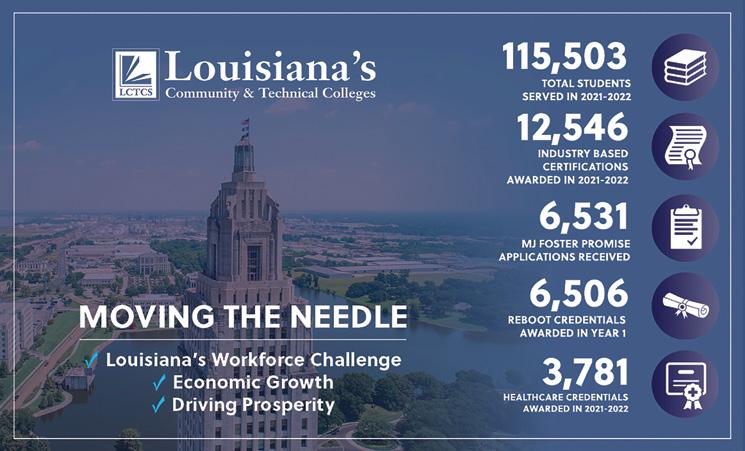
In Riser’s backyard, Louisiana Green Fuels is pursuing a $1.6 billion Department of Energy loan guarantee for a renewable diesel plant that will capture carbon and create hundreds of construction jobs, along with 150 permanent jobs paying more than twice the average household income in Caldwell Parish.
“With the carbon capture and storage industry, I feel confident this state will continue to lead the nation,” Riser says. “We have a proven record of being the most innovative and progressive workforce in the energy sector, and we will always figure out the best way to lead the world in energy opportunities.”
Decarbonization is developing a dictionary all its own. Here are some helpful terms:
• Anthropogenic refers to carbon dioxide generated by human activity, versus CO2 in nature. It’s anthropogenic CO2 that carbon-capture projects seek to remove.
• Biologic sequestration of CO2 refers to absorption of carbon dioxide by vegetation, soils, trees, oceans and wetlands.
• Carbon compounds make up 18 percent of all matter in living organisms. In the Earth’s crust, they form rock (marble, limestone, chalk) and hydrocarbons (coal, petroleum, natural gas). Too much CO2 in the atmosphere — with methane, ozone and chlorofluorocarbons — redirects excess heat to the Earth’s surface, creating a harmful greenhouse effect that overheats the environment.
• Carbon capture involves removing carbon dioxide from industrial processes — such as making chemicals, steel or cement — and from fossil fuel power generation.
• CCS refers to “carbon capture and storage,” or capturing carbon dioxide, transporting CO2 via pipeline, and storing it in deep geological formations.
• CCUS refers to “carbon capture, utilization and storage,” with utilization converting CO2 for clean energy projects. The “S” in CCS and CCUS can mean “sequestration.”
• Carbon sequestration represents the underground storage of CO2, either permanently or for retrieval in clean energy manufacturing.
• DAC or direct air capture is a more expensive system pulling CO2 directly from the air. Occidental Petroleum proposes the world’s largest DAC in West Texas, with the world’s biggest jetmaker, Airbus, buying carbon credits there to offset its emissions. Oxy also could qualify for the biggest 45Q break: $180 per ton.
• DNR is the Louisiana Department of Natural Resources, the state agency responsible for regulating underground wells through the Office of Conservation and its independent commissioner.
• EPA, the U.S. Environmental Protection Agency, is considering a DNR application to put carbon-capture permits under state oversight.
• Hydrogen is the most promising CO2 utilization. Applications in ammonia, methanol and oil refining will be augmented by electric power fuel cells, transportation fuels and less carbon-intensive cement. “Blue hydrogen” uses carbon capture for a cleaner version of steam methane reforming. Electrolysis uses renewable energy to make the more costly “green hydrogen.”
• Section 45Q is the Internal Revenue Code governing carbon sequestration tax credits worth $12 to $180 per ton. In 2027, inflation adjustments will increase their value. ■


I most appreciate LABI’s proactiveness. Many industry groups spend their time and energy focused on the negative, fighting mostly rearguard actions. LABI gets involved early, when there is still a chance to treat conversations and policy making as opportunities, not just problems to defend against.




LABI has been a great ambassador for our industry and fights to make Louisiana better for business. Without LABI, we would not have gotten tax reform done. Having LABI fight every day levels the playing field for all businesses in Louisiana!
We believe LABI is a valuable strategic partner because they give us space and opportunity to have our voices heard regarding critical like ours.
LABI is truly the glue between business and government. For a small business like ours, it is comforting to know that the team at LABI is not only looking after our needs, but the needs of all Louisiana-based businesses. We are truly blessed as a business community to have this organization in our state.
From the moment you walk into LABI, you are reminded of its unwavering commitment to free enterprise. I know those principles will enable Louisiana to be a better place, not just for our manufacturing business and growth, but for the attraction, retainment, and growth of all business and talent.
 Nathalie Simon Special Counsel to CEO, Laitram, LLC
Scott Ballard Owner, Ballard Brands Founder, Ballard Hospitality
Meryl Kennedy Farr President/Managing Partner, Kennedy Rice Mill LLC
Jude Melville CEO, b1BANK
Nathalie Simon Special Counsel to CEO, Laitram, LLC
Scott Ballard Owner, Ballard Brands Founder, Ballard Hospitality
Meryl Kennedy Farr President/Managing Partner, Kennedy Rice Mill LLC
Jude Melville CEO, b1BANK

Convicted of armed robbery when he was 22 and sentenced to nearly 50 years in prison, Jadaw Lawrence expected to be incarcerated most of his adult life. Now a homeowner and an Express Service Manager at Gerry Lane Chevrolet (he was promoted after his first month on the job), Lawrence credits the Parole Project with getting him on his feet following his release from prison in 2021.
“When you come out of incarceration, the Parole Project makes it almost impossible for you to fail,” says Lawrence. “They give you all the tools you need to succeed, but most importantly they give you what you need to help yourself.”
Founded by Andrew Hundley, LSU Law professor Robert Lancaster and Baton Rouge attorney Keith Nordyke in 2016, the Parole Project serves as a safe place to land for those coming home after incarceration. Hundley was sent to prison at the age of 15 and was the first juvenile “lifer” in Louisiana to be paroled following the U.S. Supreme Court’s Montgomery v. Louisiana decision that prohibited the mandatory sentencing of juveniles to life without parole. Upon his release from prison in 2016, Hundley got
to work in making the abstract idea of the Parole Project a reality.
“We don’t see our role as simply keeping people from going back to prison, we see it as giving people the opportunity to reach their full potential,” says Hundley.
Immediately following a person’s release from prison, the Parole Project provides them with a safe place to live in one of their nine “transitional houses” in Baton Rouge, in addition to helping them find employment, get a driver’s license and enrolling them in Parole Project classes that teach them everything they need to know about reentering society.
Since its founding, the organization has increased its staff to 25 full-time employees (two-thirds of which were formerly incarcerated) and helped over 450 people transition back into society and become valuable citizens postincarceration. Of these clients helped by the Parole Project, the recidivism rate is less than two percent.
“We firmly believe that we are improving public safety when there are fewer people in prison and more people who are employed, paying taxes and
active in their community,” says Hundley. “We’re going to keep doing what we’re doing, because it’s working.”
Last year the Parole Project secured a federal grant for a program called the Employment Enhancement Program, the goal of which is to connect soon-tobe released individuals with employers before their release from prison, so that they can immediately begin working upon their return home. So far, Hundley has been encouraged by the willingness of Louisiana businesses to take a chance on Parole Project clients.
“It’s a win-win for both employers and people coming out prison,” says Hundley. Big picture, the program aims to improve long-term collaboration with businesses and the Department of Corrections to figure out how to improve training in prisons and, in turn, expedite the hiring process.
“We don’t have the capacity to serve every single person coming home from prison, but just imagine if we did,” says Hundley. “When people are successful after prison, we all win.” ■
From taking on the risks of Louisiana businesses with stable, reliable workers' comp coverage to offering expert guidance on accident prevention for safer Louisiana workplaces, at LWCC loyalty to Louisiana drives everything we do.
is loyal to the future of our home state, because it’s more than just our job to make sure Louisiana thrives. It’s our purpose.
 Alan Adams Tower Division Supervisor at LRC Wireless, an LWCC Policyholder since 2016
Alan Adams Tower Division Supervisor at LRC Wireless, an LWCC Policyholder since 2016

THE ROADMAP IS IN HAND. IT’S TIME TO TAKE THE WHEEL.
WE’RE FLAGGING YOU DOWN FOR HELP. Louisiana is falling behind, rapidly, while our neighboring southern states are speeding past us to prosperity. We have broken parts that need fixing. We have outdated parts that need a refresh. We have complicated and disconnected parts that need retooling. And it needs to happen now. If we don’t get in gear, we’ll miss this key window of opportunity to be the Louisiana future generations will want to call home. A Louisiana where economic opportunity is within reach of every citizen, because we’ve finally left the status quo in the dust. And we can do this by the end of the decade. We can have this Louisiana, if you’re ready.
We are tossing you the keys and asking you to take the wheel. That’s right. You, personally, can make a difference in the future of Louisiana by steering our state toward a clear destination. Yes, it’s a challenging road ahead, but we’re giving you the map to get us there. We’re asking you to stick to the route, and help us make sure the right conversations are happening, the right people are paying attention, the right questions are asked, and the right expectations are laid out.
WE’RE ASKING YOU TO HELP LOUISIANA FOLLOW THIS MAP TO REACH OUR DESTINATION:
The Louisiana Association of Business and Industry believes 2023 is the year our state must plant the economic seeds that will yield better results for our citizens. Louisiana’s public and private leaders must first raise their expectations and then rally around the implementation of a well-conceived growth strategy. Change will not be easy, and results will come slower than we want. But unless we start now we will continue to fall farther behind.
We need you in the driver’s seat. But you are not hitting the road alone.
We at LABI have spent the last nine months hosting listening sessions across the state to hear the needs of everyday men and women and their thoughts on our economic future. We’ve hired outside experts to conduct statewide polling to get a clear assessment of the facts. We’ve enlisted professionals to tackle strategic solutions in the areas that emerged as true hazards in keeping Louisiana off the highway of success: workforce development, education, our tax system and crime. And we’ve created a roadmap to be used to make these changes happen.
But this is where the rubber meets the road. The planning stage is over. It’s time to put the pedal to the metal.
Take the LA23 Strategic Plan and use this roadmap as way to vet candidates, challenge leaders and policymakers, weigh decisions and measure success. And buckle up, because here we go.
The research and policy recommendations in this report were developed by Economic Leadership LLC and cover key issues to drive economic growth in Louisiana. The recommendations draw both on stakeholder feedback regarding Louisiana’s current challenges and opportunities as well as best practices from other states around the country—where Economic Leadership has worked directly with dozens of state chambers and other business organizations. Two separate reports were also prepared to offer deeper research and recommendations on the critical areas of education and tax policy. Those reports, prepared by Watershed Advisors and Advantous Consulting, respectively, are available in their full form at LA23.org.

To produce a strategic plan and specific actions that will position Louisiana as a top-tier economic leader in the South by 2030.
To produce a strategic plan and specific actions that will position Louisiana as a top-tier economic leader in the South by 2030.
Beverly Haydel, founder of Sequitur Consulting, serves as the LA23 Strategic Plan Project Director. She has more than a decade of experience working in the private, public and nonprofit sectors. Her expertise lies in project management, coalition building, stakeholder engagement, public outreach, issue advocacy, policy development and legislative strategy. Throughout her career, Beverly has demonstrated an ability to plan and execute complex projects involving multiple stakeholder groups and across numerous sectors, including health care, education, transportation and infrastructure, and economic development. Beverly applies her critical thinking and interpersonal skills to help clients plan and manage projects efficiently and to achieve positive results. Her ability to write persuasively, her vast knowledge across multiple policy areas and her in-depth knowledge of the legislative processes at both the local, state and federal levels provide her with the expertise to bring value to clients in a wide array of situations.


Ted Abernathy serves as the Managing Partner of Economic Leadership, LLC. Economic Leadership, based in Shallotte, NC, is a small group of data, strategy, and policy experts working with private and public clients to analyze competitiveness, develop strategy, support leadership, and reimagine the future. Over the past nine years, the team has worked on 146 projects in more than twenty states and internationally. Ted is the principal author of close to 100 reports on future trends, economic and workforce development, technology, and leadership, and he speaks on the economy almost every week. He currently serves as an economic advisor to the Council of State Chambers and previously held a similar position to the Southern Governor’s Association.
Pat McFerron is the President of Cole Hargrave Snodgrass & Associates and is nationally known for his polling and focus group work for corporations and political campaigns. McFerron has been involved in many successful marketing efforts, ranging from those for start-up operations, to Fortune 500 companies and charitable organizations and grassroots lobbying efforts. A veteran focus group moderator, he has directed more than 1,000 specific research projects in 41 states, as well as designed and managed national and international studies. With CHS since 1993, McFerron was Director of Survey Research for 18 years as the firm cemented its national reputation. McFerron is still very active in the day-to-day operations of the call center because he knows reliable data starts with the collection process. In addition to being president of CHS, McFerron is a founding partner of CMA Strategies, Oklahoma’s leading political campaign consulting and lobbying firm. He is a William Randolph Hearst Scholar who graduated summa cum laude from Oklahoma City University and attended graduate school at the American University.


John White, Jessica Baghian, and Merlyn Tejada of Watershed Advisors provided education research and policy recommendations for this strategic plan. Watershed Advisors supports governments to design, implement, and scale transformative education plans. Watershed was founded by former leaders of the Louisiana Department of Education, whose nearly decade-long tenure was defined by nationally recognized innovation in early childhood education, curriculum and preparation, college and career pathways, student assessment, and school accountability. Leveraging the team’s unique, vast public-sector experience, Watershed researches policies, systems, and initiatives around the world for potential scale and impact on America’s youth, families, and adults. Watershed matches high-potential ideas, visionary public sector leaders, and social impact investors to create multi-year plans for scale at the regional, state, or national levels, and manages the communications, policymaking, piloting, analytics, software development, and public financing necessary to scale and sustain implementation for a period of up to three years.

Jason Decuir and Mary Robinson with Advantous Consulting provided great tax insight and recommendations for the LA23 Strategic Plan. Advantous Consulting is a state and local tax consulting firm based in Baton Rouge and serves in multiple states across the U.S. They provide customizable end-to-end tax solutions ranging from turnkey compliance to high-level planning and advisory consulting. The owners have many years of experience with large international accounting and tax firms, and our management team has decades of relevant experience. They believe that every project has unique facts, circumstances, and business parameters. Their unmatched experience allows them to seamlessly combine the client’s specific project requirements with their proven processes to produce a successful overall strategy to maximize their client’s opportunities.
Stakeholders suggested many ways to improve the state’s competitiveness but felt that if leaders addressed the most obvious problems, the Louisiana economy could truly flourish. Here’s what we mean by our destination. This is the goal we’re working to achieve for Louisiana.
Have a fair, predictable, and stable tax system and legal climate to encourage more investment and job growth.
Improve our quality of life to be better able to attract new people to our state.
Be a state where our children are ready for adulthood, where high school graduates and college graduates are prepared for our state’s jobs.
Encourage and enable everyone to work.
Be a safe state – crime rates must come down.
Be a healthy state; more must be done to promote healthy habits and make health care available and affordable to more people. Enable all of our communities to prosper.
Encourage new businesses and their growth. Support our existing industries and help them as they face disruption and new opportunities.
Achieve alignment and collaboration among our public and private leaders in education, workforce development, community development, and economic development.
Become a national leader in energy, trade and transportation, and technology.
Enhance efforts to find and develop talent by expanding work-ready skills, providing more training for in-demand occupations, and increasing the number of Louisianans in the labor force.
Improve tax policies and the business climate, and position Louisiana in the top tier of states on national rankings.
Improve safety and resilience by reducing crime while improving health and wellness.
Improve economic development outcomes through greater alignment, enhanced tools, and more support for innovation and entrepreneurship.
ENHANCE EFFORTS TO FIND AND DEVELOP TALENT BY EXPANDING WORK-READY SKILLS, PROVIDING MORE TRAINING FOR IN-DEMAND OCCUPATIONS, AND INCREASING THE NUMBER OF LOUISIANANS IN THE LABOR FORCE
1. Establish a cabinet-level Talent Development office in Louisiana, required to be led by an individual with a private sector background, to coordinate all relevant programs and funding.
2. Continue to demand career-focused accountability for K-12 public schools and state-supported universities by measuring and rewarding performance metrics such as dual enrollment credits, credential attainment, and career exposure for students.
3. Establish a goal that every high school student in Louisiana be offered a relevant, paid internship opportunity.
4. Ensure that each of the state’s public universities works with area employers to expand paid internship offerings for college students.
5. Build a statewide pre-apprenticeship program for high school students using Kentucky’s TRACK as a possible model.
8. Build a high-quality, statewide initiative to reach every veteran separating from the military in Louisiana, to increase retention of veterans in the state and to connect them with civilian career opportunities.
9. Expand workforce training and reentry support for exoffenders to join the workforce, with a goal of preparing every individual in state prisons for employment, and a successful return to their communities and the workplace.
6. Bring the successful Be Pro Be Proud initiative to Louisiana, to increase career awareness of skilled trades and technical occupations.
7. Create a nation-leading adult upskilling and reskilling program for in-demand occupations in Louisiana, similar to Virginia’s New Economy Workforce Credential Grant Program.
10. Attract more out-of-state residents, and especially former Louisiana residents, by targeting talent in Texas, Mississippi, and the Memphis region, focusing the state’s messaging on Louisiana’s enviable cost of living and quality of life.
11. Develop a statewide home ownership initiative to attract young college graduates to remain in or relocate to Louisiana, similar to Ohio’s Grants for Grads program.
For a summary of key recommendations for education and tax policies, turn to pages 100-103.
LOUISIANA IN THE TOP TIER OF STATES ON NATIONAL RANKINGS
12. Accelerate tort reform efforts in Louisiana to reduce legal costs and payouts by insurance companies and other businesses for meritless lawsuits.
13. Require a regular review of every state agency’s regulations in order to eliminate or revise any unnecessary, duplicative or contradictory regulations. Set a goal of a 25 percent reduction in the overall volume of regulations within four years.
14. Continue to invest in infrastructure necessary for economic success, including through increasing and indexing the fuel tax along with fees on electric and hybrid vehicles, and ensuring all available funding for broadband internet access is deployed efficiently and effectively to the areas most in need.
15. Implement comprehensive insurance reform to stabilize the market, attract carriers to enter and remain in Louisiana, and reduce policy premiums.
TO IMPROVE SAFETY
16. Increase penalties for and focus more law enforcement resources on violent and habitual offenders. Expand programs to prepare these offenders for productive employment post-release.
17. Increase the transparency, efficiency, and effectiveness of the judiciary in Louisiana.
18. Increase cooperation between law enforcement professionals and mental health professionals and establish a goal to have trained Crisis Intervention Teams (CIT) in every parish of Louisiana.
19. Promote statewide health and wellness goals as a crucial aspect of a larger economic development agenda.
20. Train, attract and retain more healthcare workers, especially in hard-to-serve areas.
21. Simplify the Louisiana Industrial Tax Exemption Program (ITEP) to reduce the burden and complexity on both companies and local government.
22. Review, and adjust as necessary, the state’s incentive portfolio to ensure that it is flexible enough to encourage potentially transformational investments in research and development, innovation, automation, and talent development for desirable and valued business sectors.
23. Review existing state economic development programs with regional partners across the state to ensure alignment with regional and parish economic development efforts, and adjust as necessary.
24. Expand on regional approaches (such as the Louisiana Competes Program) to improve workforce, buildings and sites, entrepreneurial ecosystems, and marketing through annual competitive grants for collaborative multi-parish efforts.
25. Incentivize public universities in Louisiana to increase the commercialization of innovative technologies by including patent and licensing income results in funding formulas.
TO IMPROVE SAFETY AND RESILIENCY BY REDUCING CRIME WHILE IMPROVING HEALTH AND WELLNESS
Improve the state’s rankings for new job creation to the middle third by 2030.
Louisiana would have needed to create an additional 90,000 jobs over the past five years to rank in the middle third of state job growth.
Increase the working age population by one percent over the next ten years. It is currently projected to decline in Louisiana while growing by 3.3 percent nationally.
To reach the one percent growth goal Louisiana would need to increase the working age population (ages 25-64) by 153,000 more than the current projections.
Improve third graders’ reading at or above grade level to 66 percent by 2030. Currently about 55 percent of third graders read at grade level. To reach the 66 percent goal, an additional 5,500 Louisiana third graders would need to read at grade level.
Improve the state’s ranking for wage growth to the middle third by 2030.
Louisiana’s jobs would have needed to pay an additional $2,351 over the past five years to rank in the middle third of state wage growth.
Increase the Louisiana labor force participation rate, now at 59.6 percent, to exceed the national average (currently at 62.6 percent) by 2030.
Louisiana would need to have 106,412 additional people in the labor force today to meet the national average.
Ensure that 50 percent of high school students will participate in school-to-work initiatives –including a paid internship, preapprenticeship or apprenticeship – by 2030; in subsequent years the goal rises to 100 percent.
Based on recent public school enrollment numbers, 50 percent of students would equal about 22,000 students per year participating in a school-to-work program.
These targets must be revisited on a regular basis to ensure Louisiana’s progress toward increased competitiveness, as other states (and nations) continue to move the benchmark.
Secure multiple, consistent top 20 rankings among best states for business by 2030.
CNBC’s Top States for Business in 2023: 49th
U.S. News & World Report in 2023: 50th Tax Foundation, State Business Tax Climate 2023: 39th
Improve the state’s high school graduation rate to 88 percent by 2030.
The 2023 state graduation rate was 83.5 percent. To reach the 88 percent goal an additional 2,000 students would need to graduate.
Reduce the state’s violent crime rate by 15 percent and the property crime rate by 20 percent by 2030.
BASED ON 2021 LOUISIANA CRIME RATES PER 1,000: Violent crime rate of 5.94 a 15 percent reduction would equal a crime rate of 5.05.
Property crime rate 26.52 a 20 percent reduction would equal a crime rate of 21.22.
Secure a consistent top 20 ranking among the best states to start a business by 2030.
Forbes Best States to Start a Business in 2022: 37th
Wallet Hub Best States to Start a Business in 2023: 29th
Motley Fool Best States to Start a Business 2023: 32nd
All strategy development begins with an assessment of the state’s current economic reality and identifies future trends that will impact Louisiana’s businesses and people. Next, one must determine what are the most pressing issues and what stakeholders want for our state’s future. The final step is to identify, and then implement, specific actions to move Louisiana from where it is to where it wants to be.
Successful strategic action agendas are future-focused, realistic, actionable, appropriately resourced, measurable, and regularly updated.
To determine Louisiana’s current competitive conditions, one must start by answering the following questions:
What are the state’s economic trends over time and areas of inertia?
How competitive is our state today, compared to its peers?
What industries drive Louisiana’s economy today and how are those industries changing?
What industries are emerging as currently or potentially critical to the future of Louisiana?
To determine the desired future, an extensive engagement process of surveys, interviews and focus groups helped answer:
What do stakeholders want for Louisiana in the future?
What does the business community need to succeed in Louisiana?
What do the state’s economic developers need to be successful?
What regional differences need to be considered and how will a plan account for nuanced needs and desires?
What is realistic and achievable?
Where does opportunity lie and how are those sectors evolving?
To recommend what actions are needed to drive increased competitiveness for Louisiana that can lead to the desired outcomes, we considered and researched the following:
What are potential specific actions that are proven, impactful, realistic, fundable, and timely?
How do we measure success?
How do we maintain momentum?

A survey of 526 business leaders across Louisiana in the first quarter of 2023 by Cole Hargrave Snodgrass & Associates (CHS) shows the business community is worried. Just 22 percent of respondents said that the state’s economy is on the right track. Eightyseven percent believe the state’s business climate is worsening. These sentiments were shared in all regions of the state and across all industry types.
CNBC’s Top States for Business in 2023 used 88 metrics to evaluate each state’s competitive position. Louisiana placed 49th in this ranking and ranked worse than 40th in five of the 10 major categories. Of major concern were Infrastructure (46th), Economy (45th), Life, Health & Inclusion (48th), and Technology and Innovation (45th). The state ranked 48th for Workforce, down from 42nd in last year’s study. Workforce has been ranked as the most important factor in recent surveys of CEOs and site selection consultants.
Other recent multifactor, data-driven ratings confirm the state’s precarious position. In a ranking of overall best states for 2023 by U.S. News & World Report, Louisiana placed 50th. It came in last place in the categories of Economy (50th) and Crime (50th). The state fares slightly better, but still in the bottom 20, in evaluations of state business tax climate by the Tax Foundation (39th in 2023), and in Forbes’ list of the best states to start a business (37th in 2022). The publication Site Selection ranked Louisiana 25th in 2022 while Area Development gave the state a strong 12th-place rank.
The actual economic results are hard to face. Over the past decade, Louisiana has ranked 48th for job growth, 47th for population growth, and 48th for wage growth, while its growth in gross domestic product ranked 50th. Over the past 10 years, Louisiana has been the only southern state to lose jobs and see its overall economy contract.
CHANGE IN AVERAGE ANNUAL JOBS (2012-2022)
Source: US Bureau of Labor Statistics QCEW
Source: US Bureau of Economic Analysis
Source: US Bureau of Economic Analysis
Only 22% of business leaders surveyed in 2023 believe that state’s economy is on the right track and 87% think that Louisiana’s business climate is getting worse.
Only 22% of business leaders surveyed in 2023 believe that state’s economy is on the right track and 87% think that Louisiana’s business climate is getting worse.
Poor results are not new and will not improve if we stay on the current course. Over the longer term, the sluggishness of Louisiana’s economy is shown in metrics such as total employment growth. The state’s 25-year growth rate lags far behind leading Southeastern states such as Texas and Florida. During that period, employment in Louisiana and Alabama grew by 6.6 percent while Florida and Texas each grew by close to 50 percent.
Growth in the overall Louisiana economy, as measured by real gross domestic product, has stagnated for the past 15 years.
Key industries in Louisiana were hit particularly hard by the economic shutdown caused by the pandemic, as well as disruptions caused by Hurricanes Laura and Ida. The state is still trying to recover from those impacts. From 2019 to 2022, major job losses were sustained in the important sectors of oil and gas, hospitality and tourism, and construction. These were offset somewhat by some employment gains in agriculture, technology, business services, video production and distribution, and plastics. During the last five years, only two of Louisiana’s top ten employing sectors posted positive job gains. Those growing sectors were technology and business services.
Hits to leading parts of the state economy are reflected in recent change in gross domestic product (GDP) from 2019 to 2022. During that period, the average GDP in the United States rose by 2.4 percent while Louisiana’s fell by 4.3 percent, a growth rate ranking 48th in America. Meanwhile, most competing Southeastern states posted GDP growth above the national average.
One positive for the state economy is a strong rebound in the real value of exports since the fall of 2021. This may be due to the improving global energy market leading to demand for oil and gas products, including liquified natural gas (LNG).
A closer look at the industries driving the state economy helps explain the current economic inertia.
CONCERN
In addition to the quantitative analysis, input was gathered through interviews, focus groups, surveys and stakeholder meetings in Jefferson Parish, the Northshore, Baton Rouge, the Bayou region, Lafayette, Lake Charles, Alexandria, Monroe, and Shreveport. Stakeholders expressed several concerns.
Many felt that the prevailing culture of “we’re good enough” must be changed to improve competitiveness. Almost all agreed a new plan is needed, and that it must be transformative not incremental.
Everyone felt that workforce issues are holding the state back. Louisiana does not have enough people with the skills businesses need. There are too many complicated education and workforce programs. No one is in charge.
A common sentiment was that poor ratings of the education system, the lack of new affordable housing and childcare, and crime rates make it hard to convince prospective employees to move their families here.
Many suggested that the current state constitution is antiquated, the tax code too complicated and the legal environment extremely litigious. All of these contribute to uncertainty, complexity, and costs for business. If Louisiana expects to compete, it must reform the state tax code, possibly through a Constitutional Convention.
The most important industry clusters are those that export goods or services to other states or countries and thus bring additional wealth to a state; these are known as traded clusters. They can be categorized into three groups. Louisiana’s “Asset” clusters employ large numbers in the state and are generally adding jobs. “Legacy” clusters have high concentrations of employment in Louisiana but have not been increasing jobs. “Emerging” clusters employ smaller numbers of people but are growing and show the potential to be important for the state’s future.
Asset clusters in Louisiana that are important employers and growing include:
• Upstream Chemicals,
• Environmental Services,
• Wood Products,
• Video Production & Distribution, and
• Electrical Power Generation.
Legacy clusters – historically important and still critical to the state economy – are led by:
• Oil and Gas,
• Water Transportation,
• Construction, and
• Hospitality and Tourism.
As a Legacy cluster, Oil & Gas has not been adding jobs in recent years. However, diversification in the energy sector – through carbon capture, utilization, and storage (CCUS) projects and increasing energy production from renewable sources – has the potential to drive industry resurgence in Louisiana. Several carbon capture projects are under development in the state. Smaller but promising Emerging clusters include:
• Technology,
• Food Processing,
• Plastics, and
• Insurance.
The chart below lists the state’s leading traded clusters in terms of total employment. The top ten list is led by Business Services. The highest paying of these clusters are Oil & Gas, Water Transportation, and Tech, all over $100,000 in average earnings. The lowest paying are Hospitality & Tourism and Education, both averaging less than $60,000.
The chart on the right shows the five fastest growing clusters in the state, led by Technology. Of these, the largest cluster in total employment is Business Services. The highest-paying cluster is Upstream Chemicals ($172,000), but all five feature average earnings of at least $75,000.
Separate from traded clusters that export goods or services, local clusters do not typically export but are important as key employers in a regional economy. Five local clusters in Louisiana employ more than 100,000 people, led by Local Health Services which employs over 250,000. All the leading local clusters on the right have average earnings of less than $75,000.

Challenge: Enhance efforts to find and develop talent by expanding work-ready skills, training for in-demand occupations, and increasing the number of Louisianans in the labor force
Challenge: Enhance efforts to find and develop talent by expanding work-ready skills, training for in-demand occupations, and increasing the number of Louisianans in the labor force
Across America, issues of workforce quantity and quality are at the very top of business concerns. The situation is no different in Louisiana. In a 2023 survey of state business leaders by CHS & Associates, 62 percent indicated dissatisfaction with the workforce. Workforce quality concerns were the number one issue facing Louisiana businesses. Reasons for dissatisfaction were topped by 47 percent citing a lack of qualifications, skills, or education among workers. Poor soft skills was the skill deficit mentioned most often. Louisiana has taken a number of important steps to address workforce issues, but not enough to get the needed results.
A critical step to address talent supply and quality is to elevate the issue’s importance within state government, and corral fragmented funding streams and programs into a more cohesive effort. In Connecticut, the state Office of Workforce Strategy (OWS) was created by the Governor’s Workforce Council in 2020. The OWS is led by a “workforce czar” with a long industry background (a business track record is mandatory – not a government, academic, or non-profit resume). Colorado’s long-established Workforce Development Council features 22 business members on its Council board.
The Mississippi legislature approved a new agency in 2020 to coordinate talent supply and development efforts. The AccelerateMS office opened for business in 2021 to attack issues such as the disorganized patchwork of federal and state funding, and Mississippi’s low labor force participation rate. In 2023, backers of Virginia’s Workforce Development Transformation legislation vowed to break down agency silos through the creation of a state Department of Workforce Development and Advancement. Establishing the position of a business-oriented state workforce captain in Louisiana would help to coalesce various talent development efforts and support regional innovation across the state.
Louisiana’s labor force has not grown as much as competitor states in the Southeast. This 25year chart illustrates the very slow growth of one of the economy’s most critical resources, talent.
To compensate for the smaller size and slow growth of the labor force, a key strategy is to focus on reaching adults and young people who are disengaged from the workplace and the job market. As of early 2023, Louisiana’s labor force participation rate among all adults was about the same as pre-pandemic levels, but it continued a long-term trend of being well below the U.S. average.
By May 2023, the Louisiana participation rate (seasonally adjusted) was up to 59.6 percent, according to the St. Louis Fed. This was still significantly lower than the overall U.S. rate of 62.6 percent. The highest workforce participation was found in the District of Columbia (70.8%), North Dakota (69.7%), and Nebraska (69.5%), while the lowest rates were in Mississippi and West Virginia, both at 54.6 percent.
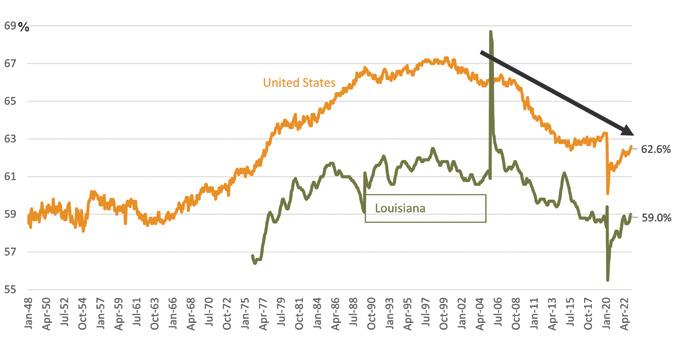
Numerous states are making concerted efforts to increase the size of the active workforce and improve applicant pools. There are media campaigns and business commitments to reduce the use of college degree requirements as an applicant screening tool. Many initiatives center on reaching adults who have been out of the workforce or who need upgraded skills. One method is to offer targeted upskilling and reskilling training, such as:
• Virginia’s New Economy Workforce Credential Grant Program, established in 2016 to improve the supply of credentialed workers in key sectors in the state’s economy. The grant program provides a pay-for-performance model for funding noncredit workforce training. In 2022, program enrollment in ten high-demand fields exceeded 11,500. The training course completion rate was 99 percent, and 77 percent of participants obtained a certificate. Median annual earnings for those getting a certificate rose by $6,120. The average participant in the New Economy Workforce Credential program was 32 years old.
• Return Utah, which is aimed at re-establishing the skills of those with an extended absence from the workplace, and placing them in “meaningful, mid-level jobs.” Through the Return Utah program, state agencies specifically target candidates with an extended absence on their resume, giving credit for life experience and breaking with the common practice of bypassing resumes with a work experience gap.
Other initiatives are targeted at younger age groups. Illinois’ Youth Career Pathways is designed for at-risk young people ages 16-24. This program increases the availability of training to develop marketable skills among those most at risk of disengaging from school and work, including youth of color and rural youth.
Some efforts combine training with support for those with substance abuse issues. One well-developed initiative is the Kentucky Transformational Employment Program (KTEP), a partnership of the Kentucky Chamber Foundation and statewide health organizations. KTEP is for those needing substance abuse treatment who also may have involvement with the criminal justice system. Companies that adopt KTEP guidelines will not be held liable for civil actions related to negligent hiring or negligent acts of their employees.
More states are developing programs to train, place, and support criminal offenders and ex-offenders to move them into the workforce. Few of these have been scaled statewide, but Indiana has successfully done so.
The Hoosier Initiative for Re-Entry (HIRE) program, run by Indiana’s Department of Corrections, was launched in 2012 and has twice won national workforce awards. The HIRE model prepares felony inmates
In the spring 2023 survey of business leaders reported by CHS & Associates, Louisiana businesses were more focused on reaching and training in-state residents for employment, rather than recruiting from outside the state. Our state also has the country’s second-lowest percentage of remote workers, 8.4 percent versus the U.S. average of 17.9 percent using 2021 data. This may be due to the large share of jobs in occupations requiring on-site attendance. However, it could also reflect an inability to effectively portray Louisiana as an attractive destination for talent in a wide variety of industries.
to enter the workplace, works with businesses to determine the skills and abilities that will make an employee successful in their organization, helps pair inmates with job opportunities, and coordinates with support organizations on clothing, housing, and transportation needs. A HIRE mentor works with each participant for one year after an initial job placement. In 2021, the HIRE program worked with 369 business partners and placed 1,120 ex-offenders in jobs at an average wage of $14.38. Participants also have lower recidivism rates.
The Texas Association of Business’ (TAB) Foundation, which is affiliated with the Texas State Chamber, has created a Second Chance Employers Coalition to spread the word about the higher retention rate of second-chance (ex-offender) hires and to help Texas businesses implement second-chance hiring practices. In states with a robust military presence like Louisiana, a final strategy to boost labor force participation is outreach to military veterans (and their families) transitioning to civilian life. Virginia’s Hire Vets Now strives to retain the 20,000 military personnel in Virginia who leave active duty each year, connecting vets with leading in-state careers like cybersecurity. Hire Vets Now conducted 24 on-base and virtual events in 2022.
“The ratings of our education system, the lack of new affordable housing and childcare and the crime rates makes it pretty hard to convince anyone that they want to move their family here. We have a lot to fix if we expect people to move to Louisiana.”
– LA Business Leader Feedback
REMOTE WORKERS BY STATE, 2021
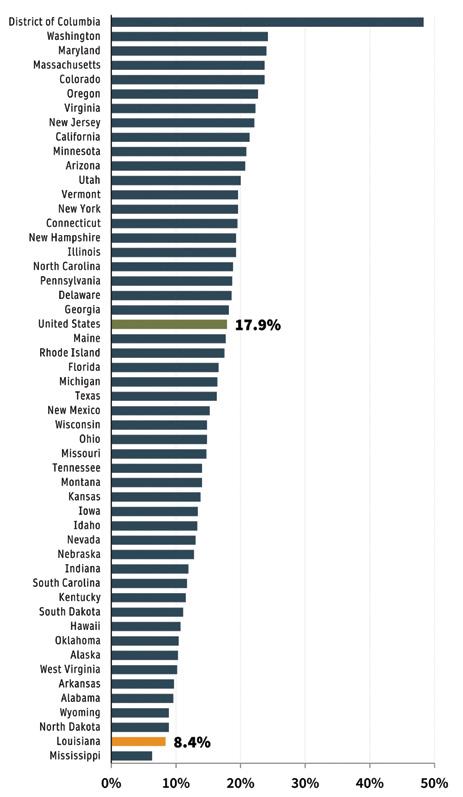
In an economy increasingly marked by technological innovation and state competition to win talent, strategies to attract people to work in Louisiana – or live in the state and work remotely – could complement efforts to retain and upskill existing residents. Since the pandemic, Americans have increasingly chosen to move due to the relative affordability of locations as well as quality of life. Louisiana’s cost of living, culture, and outdoor recreation offerings could make it attractive to remote workers and other new residents.
In a survey by the Site Selectors Guild, 78 percent of members say that talent shortages are impacting where firms will consider investing in new or expanded facilities. Forty-one percent think that skill shortages are the new normal. The report also listed six states that Guild members think are doing a good job implementing talent attraction and retention strategies. These are Alabama, Georgia, Kentucky, Tennessee, Texas, and Virginia. State talent attraction programs are often aimed at younger residents of metro areas in nearby states.
Source: US Census Bureau (2022)
In recent years, Louisiana has taken many steps to improve its education system and better prepare young people for career paths and higher education. It is supporting early-child development by increasing the quality and availability of childcare, and stressing the importance of third grade literacy. The state is also emphasizing accountability for schools and promoting a wide choice of education options. Successes include improving fourth-grade English scores, and a graduation rate that rose from 73.5 percent to 83.5 percent in 8 years.
However, more needs to be done. Third-grade reading has declined recently. Too many young people are disengaged and absent from school. More students need access to good dual enrollment, career and technical education (CTE), and workplace exposure opportunities. Many Louisianans enroll in college but do not complete a degree, or graduate with a degree that is a poor fit with in-demand career options in the state. Louisiana’s ability to become more economically competitive depends in large part on families being assured that their children will be equipped with basic foundational skills like reading and math, graduate ready and equipped for a career, and have real economic opportunity in this state.
Additional reforms to the Louisiana education system are necessary. These include solving the teacher workforce shortage, expanding quality tutoring services, and ensuring that each high school graduate has a focused post-secondary plan. LABI and the business community will continue to emphasize educational excellence as essential for improving the attractiveness of Louisiana as a destination for families, and to prepare the state’s future workforce.
A major focus for LABI and its members is the schoolto-work transition—the ability of middle-school and high-school students to succeed in the Louisiana workforce after graduation. There is a major emphasis throughout the United States on providing greater career awareness, exposure to the workplace, and actual work experience for young people. Business leaders across the nation believe the lack of workplace exposure and work experience among American youth to be highly problematic.
Arkansas’ well-regarded Be Pro Be Proud career awareness initiative was launched by the Associated Industries of Arkansas Foundation in 2016. Its Mobile Workshop travels to schools around Arkansas and this year should cross 150,000 students reached. A second Mobile Workshop will ease a lengthy waiting list. The Be Pro Be Proud program has expanded to South Carolina, Georgia and North Carolina, with Tennessee launching next.
The Work Ethic Distinction credential program started in northeastern Tennessee but is now available for any school in the state to adopt, and it is supported by the Tennessee Chamber’s foundation. Work Ethic Distinction covers standards in 13 categories. High school seniors who earn a credential are automatically granted a job interview with participating firms.
Given the importance of this issue and the serious work that remains to be done, LABI engaged a team of education experts at Watershed Advisors to develop a set of detailed policy recommendations that span from access to early childhood programs to K-12 to higher education. Watershed’s recommendations draw not only on a deep level of expertise in the most critical problems facing our education and workforce systems here in Louisiana, but also extensive experience working in states across the U.S. tackling major education reforms. Watershed's report synopsis can be found on page 103.
Rhode Island’s Prepare RI is a statewide initiative to provide every high school student with an expanded CTE curriculum and a rigorous, seven-week paid summer internship opportunity. The career awareness and readiness program started in 2015.
Work & Learn Indiana has matched 15,000 college students with business internships since 2006, and now includes high school students. Employers can be reimbursed by the state for up to 50 percent of intern wages paid.
Because middle- and high-school guidance counselors are too few and usually not trained on regional careers paths, Arkansas and Alabama have developed separate career coaching programs. These professionals are housed at community colleges in Arkansas and with regional workforce offices in Alabama. Alabama career coaches prepare data reports for school systems on in-demand careers in their area.
A particular school-to-work emphasis in much of the country is the development of more apprenticeships and pre-apprenticeships for young people to enter paid employment while being mentored in that career path. Relatively few young people move into apprenticeships in America – especially compared with countries such as Germany, Austria, and Switzerland, where over 50 percent are involved in an apprenticeship. However, the numbers here are growing significantly and with increasing evidence of success. Ninety-three percent of Registered Apprenticeship completers in the U.S. retain their employment, and at an average annual starting salary of $77,000. There are currently around 600,000 active apprentices in the U.S. and about 3,520 in Louisiana. Apprenticeships include industry-recognized programs as well as federally approved Registered Apprenticeships. They are now available in a much wider range of industry sectors, from healthcare and high tech to finance and insurance.
Alabama has been heralded for its apprenticeship programs since creating an Alabama Office of Apprenticeship (AOA) in 2019. Also, that year, it started the Alabama Industry-Recognized and Registered Apprenticeship Program (AIRRAP) to ensure that one agency (AOA) is accountable for both major types of apprenticeships. Alabama has provided an Apprenticeship Tax Credit for employers since 2016, and later expanded the per-apprentice credit and the number of apprentices for which a business can claim the credit. AOA has four regional staff persons across Alabama, and a technical staffer to manage tax credits.
Kentucky established the Tech Ready Apprentices for Careers in Kentucky (TRACK) youth apprenticeship program after finding that there were 65,400 high school students in the state with a CTE concentration, but only 4,100 of those had a job. The TRACK program has nine career pathways, provides paid job opportunities, and after high school the student transitions directly into an employer’s Registered Apprenticeship program.
The Missouri Chamber Foundation won a $6 million grant from the U.S. Department of Labor to develop apprenticeships at Missouri technology firms, an effort that has already attracted over 3,000 apprentices since 2020. The Chamber Foundation assists firms with paperwork, and companies receive a per-participant grant. Ninety-eight percent of participants complete their apprenticeship and are employed at an average salary of $63,000. Forty-eight percent of apprentices are people of color and 40 percent are women.
Different agencies in Louisiana concentrate on apprenticeships and pre-apprenticeships for youth and adults, but there is not enough coordination between the two. Meanwhile, businesses need to understand the benefits of apprenticeships and require assistance with starting these programs. It can be particularly difficult for smaller employers to develop apprenticeship programs. The Iowa Registered Apprentice Development Fund addresses this by providing training grants to new, small-scale programs in high-demand fields.
The apprenticeship option receives only a small fraction (about two percent) of the federal and state funding support that the college degree path enjoys. Louisiana can incentivize growth in apprenticeships by expanding the dollar amount of the state tax credit and including more industry-recognized apprenticeships in non-traditional fields.
Education system accountability tied to job placement and workplace success can help create the right incentives for post-secondary institutions as well. A well-established model of this is Texas State Technical College. TSTC was established in 1965 in Waco, and now has 10 campuses across the state. TSTC is the “only technical college in Texas whose funding depends on whether our graduates get jobs.” In 2009, it switched to a Returned-Value funding formula, based on the salaries of its graduates. TSTC is paid in arrears based on the workplace success of its students. For nine in-demand degree fields, it also offers a money-back guarantee if graduates don’t get a job within six months.
A current initiative of the Virginia Business Higher Education Council is Growth4VA, a campaign to make Virginia “the best at affordable talent pathways.” To spur accountability and innovation in higher education, Growth4VA calls for the development of “a new funding model for the Virginia higher education system in which innovation is incentivized, performance is measured and rewarded, and institutions are granted optimal managerial flexibility in exchange for greater outcomes-focused accountability.”
As important as efforts to improve education and school-to-career outcomes is the collection and reporting of related data. The Florida Scorecard covers 16 metrics, including education and talent supply. Scorecard data covering topics such as child poverty and third grade reading is available for every county. The Louisiana Board of Regents’ Prosperity Index is a similar and tremendous tool. However, it needs a better public interface, a simpler summary page, and widespread dissemination through the business community, community organizations, and elected officials.
4. HOUSING:
With talent attraction and retention at the very top of economic development issues across America, housing has risen rapidly as a key quality of life factor. Housing concerns include overall supply, the diversity of product types and their appeal to young workers, and affordability. Louisiana’s housing affordability is generally a strength, as it ranks among the 10 most affordable markets in America according to U.S. News & World Report.
Affordability is a positive, but sometimes points to a lack of new construction that helps to attract workforce talent. Parts of the state feature older housing stock and fewer new apartments, condos, and townhomes. In 2022, 84 percent of permitted new housing units in Louisiana were for detached single-family dwellings, while less than 12 percent were in multi-family buildings with five or more units. Buildings with five or more units made up 38 percent of the new units in Texas and 35 percent in Florida. Younger workers also favor mixed-use communities providing walkable access to shopping, restaurants, and entertainment.
States are increasingly tackling housing as a critical talent and quality-of-life issue. Some examples from around the country:
Statewide housing policy can be influenced by building coalitions with in-state subject experts. The Utah Housing Gap Coalition is one example. The Salt Lake Chamber teamed with the Kem Gardner Policy Institute at the University of Utah to study declining affordability and the reasons behind a 54,000-unit gap between housing supply and demand in Utah.
To encourage young people and young families to live in Ohio, the Ohio Housing Finance Agency operates the Grants for Grads initiative, established in 2009. Grants for Grads offers 2.5 percent to 5 percent down payment assistance for those who graduated with at least an associate degree in the past 48 months. Recipients must take free homebuyer education classes. The down payment assistance is forgiven if the homeowner remains in Ohio for five years. Nearly 200 home buyers took advantage of Grants for Grads in 2022.
South Dakota passed a $200 million workforce housing bill in 2022. Funds are used for infrastructure (streets, water and sewer lines) that will support housing development. Half of the funds from House Bill 1033 are for grants and half are in a revolving loan fund.
In addition to grants, loans, and tax credits, regulatory changes can stimulate new housing development. State and local governments are increasingly backing zoning code changes to allow greater density, a wider range of housing types, and accessory dwelling units.

Louisiana has striven to improve its business, regulatory, legal, and insurance climates (including tax policy), but these are still ranked as significant impediments to business success in the state. Working effectively with state chambers and other business organizations, some states stand out for their regulatory and legal climate, or the progress made to overhaul it.
• Every state agency in Arizona is required to review all its rules every five years, to target any that should be repealed or changed. This statute helps Arizona maintain one of the least-complex regulatory codes in the country. Arizona also created an online portal enabling people who live and work under its regulations to make recommendations, and it has exceeded its target to reduce red tape. Over a two-year period, the state removed 1,100 regulations, saving businesses an estimated $79 million. Arizona also claims status as the first state to recognize out-ofstate occupational licenses, making it easier for people to move into the state and begin working quickly.
• Virginia established a Regulatory Reduction Pilot Program in 2018, focusing on the state Department of Professional & Occupational Regulation (DPOR) and the Department of Criminal Justice Services (DCJS). After the three-year pilot, DPOR had amended or eliminated 27 percent of its regulations while DCJS altered 14 percent of its regulations. A 2022 law enacted in Virginia expanded this reform effort to other state agencies.
“In Louisiana everything starts with a parade and ends with a lawsuit.”
• On the legal front, Florida’s HB 837 in 2023 was hailed as a historic reform package to end Florida’s reputation as a “Judicial Hellhole.” The Florida Chamber aims to transform the state’s legal climate from the bottom five in America to top 12 by 2030. This legislation reduced the statute of limitations for negligence suits, increased transparency to juries, and instituted a comparative fault standard in injury claims. LABI has worked on civil justice reform for decades, but greater progress must be made.
– LA Business Leader Feedback• Twenty years ago, Texas was also regarded as one of the nation’s worst “Judicial Hellholes.” Since then, systematic tort reform has slowly but completely changed the business landscape to one providing a more stable, predictable, and reasonable environment. As a result of numerous reforms, the volume of tort lawsuits in Texas has declined by approximately 50 percent.
Louisiana made some progress in its legal climate with the Civil Justice Reform Act of 2020. However, a number of statutes and legal practices are still in need of reform. Further reforms should center on greater transparency of third-party funding of plaintiff actions and medical costs, and plaintiffs’ ability to recover phantom medical damages in excess of actual damages. LABI estimates that every Louisiana citizen still pays a “tort tax” of $1,010 annually due to lawsuit abuse and excessive tort costs.
“We operate within a state constitution and tax structure that is older than the Byzantine era.”
– LA Business Leader Feedback
Another key aspect of a positive business climate is state-level commitment to the infrastructure necessary for economic success. Louisiana’s low grades in infrastructure underscore that this is another area that must be addressed to increase overall competitiveness. LABI recognizes that a robust transportation infrastructure is paramount to the state’s economic success, and calls for ensuring the integrity and adequacy of the Transportation Trust Fund.
The North Carolina Chamber has led a coalition of groups successfully urging the passage of a number of transportation investment bills in recent years. Between 2015 and 2020 this coalition helped pass $2.2 billion in funding for transportation improvements. The chamber is currently building the Destination 2030 coalition to continue advocating for long-term transportation funding solutions.
Over the years, many state fuel taxes have been rendered inadequate by not being indexed for inflation, by greater fuel efficiency, and the rise of hybrid and electric vehicles. Louisiana has not raised its fuel tax since 1990, and the current rate is among the ten lowest in the nation. In 2020, Virginia passed its first fuel tax increase since 1986. It raised the tax by 62 percent over two years, and it will be indexed to inflation after that. In recent years, 30 states have enacted fuel tax increases, while 32 states (including Louisiana) have adopted registration fees or other revenue generators from electric and/or hybrid vehicles.
Louisiana has made strong progress in increasing access to broadband internet service and continues to make this a priority. There is more work to be done. According to BroadbandNow’s 2023 rankings, Louisiana ranks 36th in a combined evaluation of internet coverage, prices, and speeds. In June 2023, the state was awarded a $1.36 billion federal grant that will address gaps in coverage over the next five years. As the state Office of Broadband and the Legislature work together to deploy these funds, the state must avoid getting bogged down in bureaucracy and red tape. Instead, it must ensure that funds go as quickly as possible to the areas where improved access is needed most, and that companies doing the infrastructure work have the tools necessary to do so.
A major area of concern regarding Louisiana’s business climate–and the overall quality of life–revolves around the viability of our state’s insurance market, coverage availability, and costs. The 2023 business leaders survey produced by CHS & Associates showed this to be an unusually large competitiveness issue in the state. In this survey, 39 percent of respondents cited insurance issues as the first or second biggest impediment to business profitability and growth.
According to the 2023 Louisiana Market Summary for the property and casualty insurance marketplace, the state has the country’s seventh highest total cost of premiums per capita.
For personal coverage, the Louisiana per capita rank is third highest in America, and for business coverage it is 18th highest. Premiums are rising rapidly, with the value of homeowners’ premiums increasing by 15 percent in just the last year. According to the 2023 Louisiana Survey by the Reilly Center for Media and Public Affairs, 63 percent of residential policyholders said their coverage increased in the past year. Seventeen percent reported their policy was cancelled. The state faced consecutive years with severe hurricane damage, leading to a larger volume of insurance claims. But the insurance market has also been impeded by government intervention and mandates. Man-made crises in the form of legal system abuse, claims fraud, and regulatory interference are among the root causes of market instability. As a result, Louisiana has found itself in crisis, with almost a dozen insurers recently becoming insolvent – leaving businesses and families with fewer insurers to choose from. If Louisiana is to attract new business into the state, it can no longer allow insurance premiums to be the second highest expense a business must endure. Regulatory and legislative measures enacted over the last few years have led to increased volatility and cost burdens for insurers, resulting in at least 10 insurance companies withdrawing from the state since the 2020 and 2021 hurricanes, and at least five more ceasing to write new policies, according to a 2022 report by the Louisiana Department of Insurance (LDI).

Louisiana Citizens, the state-run insurer of last resort, has been increasingly called upon to fill the void. Louisiana Citizens is intended to serve as a temporary solution to help property owners when private insurance is unavailable, and its rates are significantly higher than those from the private market. Beginning January 1, 2023, for example, LDI approved a 63 percent increase for Citizens’ insurance premiums, which is unsustainable for Louisiana policyholders.
The good news is there has been recent momentum around this issue. In February of 2023, the state legislature approved a $45 million incentive program to encourage insurance companies to write new home policies and to attract new insurance companies to the market. This significant policy initiative is expected to lighten the load on Citizens and reduce costs for homeowners.
Fixing our state’s imperiled property insurance market by improving the litigation climate – thereby driving down the cost of insurance premiums – is a LABI priority, but doing so will require a focused and enduring commitment by state legislators, regulators, and all stakeholders to adopt meaningful legal reforms, attack fraud at its source, and promote regulatory stability.
Louisiana must stabilize the market, incentivize and attract insurers to remain by providing them with more flexibility to price their products, imposing fewer regulatory burdens, and revising the onerous and ambiguous laws that make it impossible for policyholders to resolve a claim with their insurers without resorting to litigation.
Stabilizing the insurance market will take comprehensive insurance reform to attract more carriers to come to and remain in Louisiana, while also ensuring that policyholders are protected. For example, by incentivizing property owners to build more resilient, weather-resistant structures and requiring that insurers take these efforts into account when calculating premiums, both parties will benefit. Doing so will take both legislative and regulatory changes, and collaboration among all stakeholders will be an absolute necessity. LABI will continue to bring parties together around this important issue.
A goal of any reform should be to provide more certainty in and to streamline the claims process for both insurers and policyholders. The process should be easy to navigate and the standards and obligations for both parties should be clear. By providing clarity and certainty, we can lessen the risk of frivolous litigation.
Insurance-related reform efforts need to increase. This should include legal system and tort reforms to control insurance-related costs, and providing market incentives for more insurers to stay in or come to Louisiana. Needed changes include:
• Reforming existing “bad faith” laws governing the good faith and fair dealing requirements for insurance companies;
• Taking measures to reduce inflated property damage claims; and
• Reducing the insurance tax burden to a level consistent with other states in the South.
Challenge: Improve safety and resiliency by reducing crime while improving health and wellness
Challenge: Improve safety and resiliency by reducing crime while improving health and wellness wellness
1. PUBLIC SAFETY:
The surge in violent crime in the United States during the COVID pandemic emphasized the difficulty of business and economic success when the public cannot rely on basic underlying conditions like public safety. Businesses are loathe to make new or continuing investments in cities and states that are regularly disrupted by violence, and when their employees feel uncomfortable merely coming to work in a location beset by crime.
“There are a lot of things to love about the state’s quality of life, but if we don’t get crime under control people will not move here or stay here.”
– LA Business Leader Feedback
Louisiana has achieved significant public safety reforms – particularly with the 2017 Justice Reform and Reinvestment legislative package – but so far these are insufficient to provide a safe and welcoming atmosphere for business investment, talent attraction and retention. As the charts below show, according to the latest national data Louisiana’s violent crime and property crime rates are among the highest in the country. Additional measures are needed to focus on the most violent and habitual offenders, incorporate mental health expertise alongside law enforcement, and reduce recidivism.
A successful example of broad sentencing and corrections reforms is South Carolina’s 2010 legislation. This package changed sentencing standards to prioritize prison space for repeat offenders and those convicted of the most serious crimes. It increased penalties for some violent crimes while allowing probation, parole, and good conduct credits for non-trafficking drug offenses. It increased the threshold for property crimes to be judged a felony. Senate Bill 1154 also strengthened probation and parole supervision and improved the decision-making process for releasing inmates. Between 2010 and 2015, South Carolina’s crime rate fell by 16 percent, and recidivism among those under supervision fell as well. The prison population declined by 16 percent from 2009 to 2016, saving an estimated $491 million. Meanwhile, the share of prison space devoted to violent offenders rose by 27 percent.
Louisiana’s 2017 reform package adopted several of these strategies and is seeing some success toward meeting its goals. It appears that a greater focus on habitual and violent offenders – their sentencing, prison space availability, and measures to reduce recidivism –may be the greatest need now. This should be paired with in-prison workforce training initiatives to get more offenders prepared for high-demand jobs when they return to their communities.
States have also had success by focusing precious resources where they are needed most through data-driven approaches and by concentrating policing efforts in crime hot spots:
The Safe Oklahoma Grant Program funds local law enforcement strategies to reduce violent crime. In 2023, a total of $2 million was awarded to develop data-driven and community-based crime reduction initiatives. Safe Oklahoma focuses on five areas for reducing violent crime:
a) evidence-based policing;
b) increased technological capacity;
c) improved analytical capacity;
d) engaging with community partners; and
e) providing victim services.
The Washington State Institute for Public Policy (WSIPP) studied hot spot policing strategies. It concluded that deploying one additional police officer in known crime hot spots would yield seven dollars in benefits for every dollar of program cost. Benefits included crime reduction, improved high school graduation, better labor market availability, and reduced healthcare costs. Recent studies suggest pairing hot spot concentration of resources with problem-oriented policing (POP), where law enforcement analyzes the particular crime issues in hot spots and tailors a different set of solutions for each one.
States increasingly recognize that a substantial percentage of law enforcement calls are directly related to mental health situations. Law enforcement professionals often lack detailed training in this arena. As a result, many states are working with organizations such as the National Alliance on Mental Illness (NAMI) to develop Crisis Intervention Teams (CITs) statewide. CITs are partnerships between public safety officers and mental health professionals, developing protocols for first responders to better manage and assist those with mental illness or addiction disorders. Ohio recently trained CIT officers in 86 of its 88 counties. It has also created a statewide CIT strategic plan with strategies such as a) having a law enforcement and a mental health coordinator in every county CIT program; b) training 911 dispatchers; and c) providing mental health crisis centers where CIT officers can take individuals for assessment and care.
In order to offer a different path than the traditional criminal justice framework for military veterans, a number of Louisiana parishes provide a Veterans Treatment Court. These are for veterans who may be dealing with addiction, mental illness, PTSD, and other disorders, and feature intensive treatment as well as supervision. Veterans Treatment Courts can be found in the state’s 21st, 22nd, and 14th judicial districts with a new model being established in East Baton Rouge Parish. These programs could be scaled up across Louisiana provided that each community carefully evaluates the services and providers available to support veterans in their district.
To slow down the revolving door of offender recidivism and to save money by avoiding recurring incarceration for individuals, states have successfully targeted recidivism among those “under supervision” – that is, on parole and probation.
Research in Arizona showed that individuals who violated conditions of their probation accounted for one-third of all prison admissions. Arizona implemented reforms to ensure that judges have better risk and needs assessment reports; to train stakeholders on the use of evidence-based practices; and to focus time and resources on people most likely to reoffend. Arizona reported a 31 percent decline in people entering prison due to probation revocations over a nine-year period. Over that same period, new felony convictions fell by 17 percent. Arizona estimates that these results saved taxpayers more than $460 million.
Pennsylvania incorporated performance-based contracts with halfway house operators after determining that parolees who stayed at halfway houses had higher recidivism rates. The 37 Community Contract Facilities (halfway houses) in the state now provide services including behavioral therapy, addiction treatment, educational and vocational programming. The CCFs are paid based on their ability to reduce recidivism. In the first year following the changes, Pennsylvania found that overall recidivism declined by more than 11 percent.
Some states are providing more complete, coherent, and timely information on crime and offender data for use by law enforcement, elected officials, and the public. The haphazard gathering and distribution of crime statistics at the local and state levels can be made much more efficient when combined into a useful statewide database.
Florida’s SB 1392 in 2018 required counties to collect data on more than 50 criminal justice system measures, and it built a statewide database available to the public. The bill included $1.75 million for database development, and offered financial incentives for every county to participate.
North Carolina created a Criminal Justice Law Enforcement Automated Data Services (CJLEADS) database to combine offender information from other databases, for use by state and local law enforcement professionals. Data involves warrants; jail, court, and prison records; supervision status; and sex offender registration.
A final area of concern in public safety is Louisiana’s judiciary–its transparency, efficiency, and effectiveness. The judiciary is a critical branch of government that should be held to the same standards of transparency and accountability to the public as the other two branches.
With respect to the criminal justice system overall, LABI also believes greater transparency is needed. Victims and members of the voting public should have access to information about what is happening inside court rooms, including how judges are handling bail and sentencing for repeat violent offenders. In 2022, the Maryland Assembly passed the Judicial Transparency Act to bring greater transparency to the sentences handed down by judges for violent crimes. The Act requires the state’s Commission on Criminal Sentencing Policy to publish and track sentences imposed for violent crime convictions.
The productivity of a state’s workforce is influenced by the health of the workforce.
Post-pandemic workforce health is a more scrutinized risk factor for new investment. By almost any measure, Louisianans’ health is a competitive disadvantage. The connections between health, wellness, and economic development are clear when reviewing the priority targets of Louisiana’s Healthy State Advisory Board:
Cancer and Chronic Conditions
Smoking Cessation
Workforce Development and Education
Broadband Internet Access
Shared Data Platform
In 2020, state leaders and Ochsner Health announced a long-term vision to improve overall health metrics. The 10-year, $100 million strategy should bring coordinated resources together to address the challenges. LA23 will coordinate with this and other efforts to engage business support.
Healthcare costs–for businesses, individuals, and the state–are an additional concern. Increasing labor force participation in Louisiana will reduce dependency on Medicaid. Tort reform, as discussed in other parts of this report, will help bring down costs for all. Greater transparency regarding the cost of hospital procedures and services will further benefit consumers.
As recommended in the 2020 Louisiana Economic Recovery (LAER) task force reports, Louisiana should continue to expand access to and coverage of telehealth throughout the state. Expansion of telehealth to rural and other underserved areas should result in better preventative care and wellness for all residents.
Nationally, attracting and retaining healthcare workers in smaller communities is a never-ending quest. Many states have incentive programs to bring more trained medical professionals into hard-to-serve locations. Oregon’s Rural Practitioner Tax credit offers income tax credits for doctors, nurses, and EMS volunteers. Oregon also subsidizes medical malpractice insurance premiums for doctors and nurses working in rural parts of the state. West Virginia’s Rural Health Service Program provides scholarships up to $25,000 to medical students in exchange for agreeing to practice in a rural area of the state for two years.

Louisiana has a targeted state loan repayment program aimed at physicians in federally designated health professional shortage areas as well as primary care providers. In 2022, the Legislature appropriated additional one-time COVID dollars to the primary care program. Louisiana has also made strides in recent years to grow its own in-state pipeline of physician talent. In 2020, the Edward Via College of Osteopathic Medicine (VCOM) launched in Monroe, training over 150 future physicians in its inaugural year. In 2022, Ochsner Health in partnership with Xavier University announced plans to establish a joint College of Medicine to train future physicians.
Louisiana must continue to invest in these types of new programs, while also working to grow Louisiana’s broader healthcare workforce pipeline over time. Health systems across the state have stepped up to develop programs and partner with both high schools and two and four-year institutions to increase the pipeline of healthcare professionals, from medical assistants to licensed professional nurses to nurse practitioners. These programs are providing results, but a more targeted strategy to develop healthcare workforce training models that can be efficiently replicated and scaled is needed. Additionally, funding for these types of public-private workforce partnerships must be deployed in a way that incentivizes educational institutions to respond to industry needs and incentivizes private sector employers to continue to bring their own resources to bear as well.
Challenge: Improve economic development outcomes through greater alignment, better tools, and more support for innovation and entrepreneurship
Challenge: Improve economic development outcomes through greater alignment, better tools, and more support for innovation and entrepreneurship
To be effective, state-level economic development efforts must have proper alignment. This means that they must be designed to impact the right industry, investment, and job targets, and to deliver the desired outcomes. They must also have alignment with regional and parish programs across Louisiana.
The design of any incentives should be refined to best mesh with desired targets and outcomes. In Louisiana, this includes the Industrial Tax Exemption Program (ITEP), which, in its current form, is seen as cumbersome for both industry and local governments. The ITEP approval process should be streamlined to ensure that manufacturers are fully incentivized to locate their capital in Louisiana and that the state and local governments can reap the maximum economic benefit from the program. A more detailed explanation of the ITEP program and recommended reforms is contained in summary on page 100 and in depth at la23.org.
Certain states are doing a good job of evolving their incentive programs to meet changing needs and statewide goals.
• Economic development incentive programs are, on one hand, more fine-tuned while on the other hand addressing a broader range of goals than they did in years past. The State of Indiana’s incentive program, which has 16 different offerings, provides a good example. It includes a traditional set of incentives based on Job Creation and Business Investment. But Indiana’s focus areas now also include a) Redevelopment and Quality of Place; b) Innovation and Entrepreneurship; c) Research and Development; and d) Skills Training.
• Too many state incentives have supported long-established industries that are no longer growing or adding jobs. A better investment strategy is to support and incentivize successful companies in growing industries. In Kentucky, the Bluegrass Economic Advancement Movement (BEAM) offers training resources and grants to help “high potential” small and mid-sized businesses within the state begin exporting. BEAM’s Regional Export Plan aims to increase exports by 50 percent within a five-year period.
In the introduction to this report, we noted Louisiana’s poor ranking in innovation and among places to start a business. According to Kauffman Foundation research, our state also ranks 33rd in the early survival rate for new businesses. The business dynamism rate in Louisiana – measuring company “births” versus “deaths” – has been in long-term decline, similar to national trends.

These challenges can be addressed by improving the business climate, tax structure, infrastructure, and talent supply. Economic development policies can also be adjusted to promote private sector investment in innovative technologies and new businesses. Another way to boost innovation and entrepreneurship is through direct investments in smaller, growing in-state companies and by promoting technology transfer and commercialization of innovative ideas from state universities.
• An outstanding model for tech transfer from research universities is the University of Utah, recently rated by the Milken Institute as the nation’s best university for tech transfer and commercialization. Utah was also ranked second in the nation for “innovation impact productivity” in a 2020 report by the George W. Bush Institute. The school’s PIVOT Center assists with the commercialization process and evaluates projects to minimize risk. In 2022 the PIVOT Center reported $22 million in licensing income, 307 patents filed, and 122 patents issued by university-related initiatives.
• The Texas Product Development and Small Business Incubator Fund provides long-term loans, typically between $1 million and $5 million each, for the commercialization of innovative products and to spur the growth of Texas small businesses. Firms must have at least a three-year track record. Targeted growth industries include biomedicine, biotechnology, semiconductors, and nanotechnology.
• More than 20 years ago, Ohio Third Frontier was started to provide early-stage investment capital to support technology innovation throughout the state. To date, Ohio Third Frontier has invested over $2 billion, with funding through voter-approved bond issues. During its first 10 years it was credited with supporting 600 businesses, adding 60,000 jobs to the state, and leveraging more than $5 billion in private investment.
• Some states have sovereign wealth funds that make direct equity investments with in-state companies. The State of New York’s Common Retirement (pension) Fund is one example. That fund’s In-State Private Equity Investment Program had $1.6 billion invested in 537 firms located in New York State as of 2022. This supports employment of 41,860 at those companies. New York reports that their exited investments have had an internal rate of return of approximately 11 percent. New York also has $200 million in the New York Credit Small Business Investment Company (SBIC) Fund.
Establishing a goal to move Louisiana from its current position – near the bottom of many metrics and rankings – to a top-tier economic leader in the South by 2030 is bold, audacious, and some might suggest impossible.
Establishing a goal to move Louisiana from its current position – near the bottom of many metrics and rankings – to a top-tier economic leader in the South by 2030 is bold, audacious, and some might suggest impossible.

But the Louisiana Association of Business and Industry believes that change requires new thinking. We believe we can provide more of our students with work-ready skills. We believe we can train or retrain more people for jobs that are in demand. We believe we can reform our tax code, restore insurance marketplace viability, and improve our legal system. We believe crime rates can go down and health outcomes can be improved. We believe new investments in our infrastructure will pay dividends. We believe we can have the best economic development programs and professionals in the country.
If we do the things that are recommended in this LA23 strategic plan, emulate those successful programs from other states that are the best fit for Louisiana, and work together, we can deliver greater opportunity and greater outcomes to the citizens of our state. We love Louisiana, and we believe 2023 is the year Louisiana will begin to make itself a national leader in economic prosperity.
“We are a state that always asks, what if this doesn’t work, rather than what if it does.”
– LA Business Leader Feedback
“When you are behind you gotta throw deep. It’s time to take risks.”
– LA Business Leader Feedback
“The prize is huge if we get this right. If we get it wrong, there is a tremendous risk to our state’s future.”
– LA Business Leader Feedback
Louisiana needs to invest in its future by building an education system for lifelong learning. It’s true that past reform efforts have elevated Louisiana as a leader in education policy: the work done in Orleans Parish post-Katrina, the increase in access to high-quality early childhood programs and services, and innovative initiatives in career and technical education like JumpStart, for example. Yet while Louisiana has seen considerable progress relative to the growth of other states—as evidenced by the Nation’s Report Card (NAEP)—no governor has systematically implemented education reform across all levels. For too long, Louisiana’s leaders have accepted an artificial fragmentation separating the different education systems from one another, rather than thinking of them as one state system of multigenerational, life-long education.
What follows is an outline of such a system of education, accessible to all Louisianans at all ages. This system would require a governor to articulate an ambitious vision for all levels, and to actively manage and lead all levels of the system in conjunction with others.
All children in Louisiana enter their first day of kindergarten ready to learn, and families have the support they need to participate in the workforce.
RECOMMENDATION: Expand and sustain offerings for our youngest Louisianans, birth to age three Louisiana needs to establish a robust and sustainably funded set of offerings for children birth to 3 years old, as Louisiana has successfully done for 4-year-olds. Without services for these children, Louisiana will continue to face workforce shortages, particularly among women, and the K-12 system will continue to receive children underprepared for kindergarten.
RECOMMENDATION: Make childcare more affordable in every community
Currently, the state sets a single, statewide daily reimbursement rate for all providers in the childcare assistance program (CCAP), regardless of where they are located. Louisiana should establish rural, suburban, and urban rates such that cities and small rural communities are reimbursed in accordance with the cost of care in their communities.
RECOMMENDATION: Expand access to licensed home-based family childcare
The option of home-based family childcare (FCCs) provides families an alternative to more formalized center-based care. Louisiana should create an optional family childcare license that would allow FCCs to serve up to 12 children after hiring additional staff. This will boost access to childcare for Louisiana’s youngest children.
RECOMMENDATION: Ensure the early childhood community has a voice at the governance table
Just as the governor has historically reserved one appointed BESE seat for a representative of Louisiana’s non-public schools, so too should one seat be reserved for the early childhood voice. BESE needs an appointee who can directly represent the early childhood community.
To view the full Education Reform Report, visit LA23.org.
Every Louisiana student can read by third grade, has strong math skills, and every graduate leaves high school with the skills they need to succeed in college, career, and life.
RECOMMENDATION: Provide every child a strong academic base – reading by grade 3 and proficient in math
Louisiana should build a strong academic plan for reading and math where every family is kept informed of and engaged in their child’s unique literacy journey and progress toward building strong math skills. This plan should ensure every teacher is given access to high-quality, evidence-based instructional resources, training, and support to help every child learn to read and develop strong mathematical skills. This plan should also empower every school district to implement high-quality, evidence-based curriculum for both reading and math and offer robust educator professional development connected to the selected curriculum and aligned to state expectations.
RECOMMENDATION: Ensure all high school students graduate with industry-valued credentials, a postsecondaryready diploma, and plan
Building on its past work, the state should continue to advance what it means to attain a high school diploma and support all graduates through their postsecondary transition. This means reimagining the high school experience beyond the simple pursuit of a high school diploma. In this new high school experience, students would be given the support they need to find a postsecondary path aligned with their interests and passions. Schools would aspire to ensure every student graduates with a high school diploma and is set up for postsecondary success.
RECOMMENDATION: Prioritize school safety
RECOMMENDATION: End the teacher workforce shortage
Louisiana schools face two related challenges: educator compensation across the state is often not competitive, and there are continued workforce shortages. Louisiana should tackle these challenges by: 1) offering a competitive salary, 2) modernizing Louisiana’s broken teacher retirement system, 3) offering maternity leave, 4) reducing barriers to entry into the profession while maintaining quality, and 5) meeting market demand for teachers.
RECOMMENDATION: Hold all schools accountable to high expectations for all students
Louisiana’s accountability system is critical to driving continued improvement in student outcomes. To ensure Louisiana’s accountability system continues to be ambitious for students, schools, and educators, the state should take two critical steps: 1) BESE must stand firm in its pre-pandemic commitment to higher expectations by 2025. BESE should always ask itself: “Is our new level of excellence good enough? Is it truly orienting our schools, teachers, and students toward the outcomes our students deserve?” 2) Elevate the high school diploma instead of eroding its requirements.
RECOMMENDATION: Expand high-quality school choice options
Louisiana’s choice policies have expanded families’ options beyond geographically-assigned public schools in many parts of the state. Louisiana should further expand high-quality school options by scaling high-dosage tutoring, education savings accounts, and high-capacity charters.
Louisiana should convene an expert commission to evaluate school safety in the state, create a plan for ensuring the physical security of students and supporting students mental health and well-being. The state should implement this plan in partnership with local districts and schools to ensure they are given the resources and support needed to help their students.
Every Louisianan is provided a pathway to postsecondary training or degrees, and a fulfilling career in Louisiana.
RECOMMENDATION: Ensure students can access the training they need for a high-quality job in their communities
It is crucial for the Board of Regents (BOR) to create a stronger and more cohesive partnership with industry, to build better alignment between training programs and workforce demands. Together, the BOR and its management boards should ensure the workforce training programs in every region meet the needs of high-demand industries. By aligning educational offerings with specific industry needs, everybody wins: Louisiana retains its best and brightest, postsecondary institutions focus efforts on areas of greatest need, students secure strong jobs, employers hire a talented workforce, and regional economies and communities thrive.
RECOMMENDATION: Maximize TOPS’ return on investment by allocating resources in alignment with state workforce needs
Louisiana should design a TOPS system with a dynamic funding model, placing greater value on students pursuing training for jobs in high-demand industries. In this redesign, Louisiana should also ensure the TOPS system more effectively considers students’ financial needs. This new TOPS should also have better incentives for recipients to graduate with a credential or degree, and build stronger accountability measures for universities to support student degree completions.
RECOMMENDATION: Create an integrated higher education system aligned with regional workforce needs Louisiana should consolidate governance with the Board of Regents (BOR) to truly manage and oversee the state’s higher education institutions, including the institutions under the current Louisiana’s Community and Technical College System (LCTCS) board. The BOR should have greater authority over the state’s higher education funding and resources, not just its policymaking.
Every Louisianan has access to and preparation for high-wage, high-growth jobs.
RECOMMENDATION: Empower every community to address its unique workforce needs
A thriving workforce development system demands strong partnerships between state- and region-level leaders. Louisiana should create a structure for local coordination, as it has done in early childhood, empowering those closest to communities, employers, and employees to develop a plan for solving their unique workforce challenges. As the leaders of the workforce development efforts within their region, these captains would act as portfolio managers and coalition builders.
RECOMMENDATION: Empower a state-level workforce captain to make state workforce opportunities and dollars work for the constituents they are intended to serve Louisiana needs to name a state-level captain for workforce development efforts. To best support the network of regional captains, the state-level leader would rally a wide coalition around a shared vision for workforce development in Louisiana—and be held accountable for executing on that vision. The captain would be charged with making Baton Rouge work for every Louisiana community, in support of regional workforce plans.
Louisiana has one of the least competitive business tax climates in the country. The state’s fiscal framework heavily relies on a comparatively large number of taxes with multiple brackets and a myriad of high rates that exceed national averages. In addition, Louisiana’s tax code is riddled with complex administrative procedures that burden taxpayers with sometimes costly compliance issues which directly hinder the state’s economic competitiveness.
While progress has been made in recent years to strategically reform the complexities of the state’s tax code, the truth remains that Louisiana’s existing tax system continues to put the state at an economic disadvantage both regionally and nationally. Rather than continuing to enact temporary, short-term solutions to fix long-term problems, Louisiana needs to strategically implement policies that encourage a tax system that is modern, fair, transparent, easy to comply with, and nationally competitive.
RECOMMENDATION: Streamline and centralize state and local sales tax collections and administration.
Louisiana must streamline and centralize state and local sales tax collections and administration by creating an independent state and local sales tax authority run jointly by appointed representatives from local tax collection bodies, the Department of Revenue, and legislative leadership.
RECOMMENDATION: Modernize sales tax code to allow for a broader, uniform base and lower rates.
Louisiana should update its antiquated sales tax code to account for the digital transaction of final-end consumer products, allowing for a broader tax base and lower rates. To avoid pyramiding, any broadening of the sales tax base should not include business-to-business transactions.
RECOMMENDATION: Lower and flatten corporate income tax rates.
Louisiana should consider moving its graduated corporate income tax structure to a single flat rate. Moving to a single rate will reduce the number of tax brackets, simplifying the corporate tax code for businesses.
RECOMMENDATION: Eliminate the corporate franchise tax.
As the Legislature continues to assess the effectiveness of automatic rate reduction triggers, they should simultaneously explore alternative methods to phase out the corporate franchise tax. Alternative statutory action may include modifying the existing trigger mechanisms so that the tax will automatically reduce in years when Louisiana has a budget surplus.
RECOMMENDATION: Flatten and eventually phase out the personal income tax.
Louisiana should move its graduated rate structure to a single flat rate with the goal of a complete repeal in the future. To do so, the Legislature should continue to utilize the automatic rate reduction triggers for individual income tax to allow for the implementation of fiscally responsible reductions to the tax based on actual collections.
RECOMMENDATION: Streamline Industrial Tax Exemption Program (ITEP) process.
To adequately serve as the state's foremost property tax abatement program, further simplification of the ITEP approval process is necessary. Louisiana should streamline the approval process at the state level and ensure that local governments have the necessary resources to properly evaluate ITEP applications to the extent they are involved in the approval process. Furthermore, if Louisiana lawmakers maintain the 80 percent abatement amount with local governments receiving 20 percent more property tax revenue from each qualifying manufacturer, they should proportionately reduce state funding to local governments.
RECOMMENDATION: Phase out the tax on business inventory. State leadership should actively support and facilitate local governments exploring alternative revenue sources while gradually phasing out the inventory tax within a reasonable timeframe. As the inventory tax is phased out, the inventory tax credit should be proportionately reduced. Furthermore, the inventory tax credit should not be restricted or repealed as long as the inventory tax exists.
RECOMMENDATION: Standardize and reduce the severance tax.
Louisiana should standardize the severance tax structure so oil and gas are both taxed by value. By moving to a value-based tax for both oil and gas, the severance tax rate will be set to align with the rise and fall of gas prices in real-time, providing the state and taxpayers more predictability and stability. This standardization will allow the state to reduce the severance tax rate to a more competitive rate with our neighboring states.
RECOMMENDATION: Create a Comptrollers Division to oversee the functions of the state’s fiscal agencies.
The creation of a Comptrollers Division comprised of Louisiana’s Department of Revenue, Department of Treasury, and Division of Administration, would provide Louisiana citizens, businesses, and policymakers with a one-stop resource to receive assistance on all fiscal matters, simplifying the overall structure and allowing for transparency between divisions.
WANT THE FULL ROADMAP FOR DRIVING LOUISIANA TO ITS ULTIMATE DESTINATION OF SUCCESS?

WE NEED YOU TO TAKE THE WHEEL
Together we can position Louisiana as an economic leader in the South by 2030
LABI PAC endorsements announced
BY ANDREE MILLERThe post-Labor Day sprint to the finish line is upon us as candidates up and down the ballot make their final appeals to voters before the Primary Election on October 14. The importance of this fall’s election cycle and what it means for the trajectory of Louisiana cannot be understated. The Political Action Committees (PACs) of LABI have been an active participant in the recruitment, vetting, training, and endorsement of candidates across the state. As Louisiana prepares to elect a new governor, new statewide elected officials and a new legislature, LABI is leading the charge to elect pro-business, pro-free enterprise candidates to help usher the state into a new era of growth and prosperity.
Following the success of LABI’s efforts last cycle in electing the most business-friendly legislature in Louisiana’s history, this year, LABI’s PACs aggressively pursued the candidate recruitment and endorsement process and made decisions early. This strategic move was made to help mount strong support from the business community for candidates who proved their pro-business, pro-free enterprise chops. These men and women are first-time candidates who have endured multiple interviews, lengthy policy-driven questionnaires, and thorough evaluation before being formally
42
Candidates Qualified for Statewide Elections

286
Candidates Qualified for Legislative Elections
17
Candidates Qualified for BESE
ENDORSEMENT PROCESS
Candidate Questionnaire
endorsed. All candidates proved to the interview committees and regional PAC Boards of Directors that they understood the challenges facing Louisiana, had thoughtful ideas for solutions, and recognized the opportunity at hand to correct Louisiana’s course in the next term.
In addition to the 19 candidates LABI PACs endorsed in open seat legislative races, another 65 incumbents received a nod of appreciation and support in recognition of their legislative efforts on behalf of the business community throughout the 2020-2024 term. As this election cycle progresses, LABI’s PACs will continue to evaluate races, assess candidates, and make additional endorsements.
The issues at play dominating the debate are not necessarily new to Louisiana, but they may be more intense than ever before. In a statewide election survey commissioned by LABI’s Louisiana Free Enterprise Institute mid-summer, an overwhelming number of respondents (80%) said they were either very or somewhat concerned about the affordability of living in Louisiana. Additionally, they noted that the growing costs of food, services and insurance are impacting their spending. Respondents recognized the importance of the oil and gas industry to our state’s economy,
Candidate Interview
PAC Board of Directors Make Final Endorsement Decision
they overwhelmingly supported school choice options, and they acknowledged that businesses are taxed too much in the state. The undertones of these opinions will drive voters to the polls this year. Candidates will need to prove their understanding of the issues and their ability to tackle these challenges to earn votes and win elections.
LABI’s PACs will continue to support candidates throughout the election cycle and stand ready to provide candidates with guidance, policy recommendations and support. However, this effort is only actualized if Louisiana voters show up at the polls in October and November. The future of Louisiana is in the hands of the people of the state, and LABI is in the trenches to prepare the future leaders for success. ■
“Thank you to the Louisiana Association of Business and Industry for your sole endorsement! I’ve spent the past 20 years advocating for the hard-working families and businesses across our District 25. Now, it’s time to turn that advocacy into action and pass legislation to create unstoppable economic growth, quality jobs, and a skilled workforce.”
25
“I am deeply honored to receive the endorsement from the local job creators and business leaders of LABI’s SOUTHPAC. Our work together to improve outcomes in our state is among the most impactful and meaningful of my professional career — but we all know the next chapter is the most important. For our future generations to be able to call Louisiana home, we must enact historic reforms and open the door to more opportunities. Whether sorting out our insurance mess, bringing in new businesses, or boosting the quality of education for our kids - each challenge demands a lawmaker who can roll up their sleeves from the get-go, ready to make a difference for the families of District 89.”
SD 33 Stewart Cathey
SD 36 Robert Mills
SD 35 Jay Morris
SD 38 Thomas Pressly
SD 30 Mike Reese
SD 31 Alan Seabaugh
SD 32 Glen Womack
HD 07 Larry Bagley
HD 05 Dennis Bamburg
HD 08 Raymond Crews
HD 28 Daryl Deshotel
HD 14 Michael Echols
HD 22 Gabe Firment
HD 15 Foy Gadberry
HD 09 Dodie Horton
HD 27 Mike Johnson
HD 25 Trish Leleux
HD 13 Jack McFarland
HD 01 Danny McCormick
HD 10 Wayne McMahen
HD 30 Chuck Owen
HD 20 Neil Riser
HD 24 Rodney Schamerhorn
HD 19 Francis Thompson
HD 12 Chris Turner
HD 21 C. Travis Johnson
SD 09 Cameron Henry
SD 11 Patrick McMath
SD 12 Beth Mizell
SD 10 Kirk Talbot
HD 76 Stephanie Berault

HD 56 Beth Billings
HD 89 Kim Carver
HD 90 Mary DuBuisson
HD 104 Jay Galle
HD 83 Kyle Green
HD 94 Stephanie Hilferty
HD 78 Big John Illg
HD 84 Tim Kerner
HD 73 Braville LeBlanc
HD 86 Nicky Muscarello

HD 82 Laurie Schlegel
HD 80 Polly Thomas
HD 79 Debbie Villio
HD 77 Mark Wright
“I am honored and excited to carry a LABI WESTPAC endorsement with me through my campaign. As a past LABI Emerging Leaders Council member, I have witnessed many of the impactful efforts and strategies put forward by this respected organization. As I seek to serve in our Louisiana House of Representatives, I will remain focused on efforts aimed at building and protecting a strong business climate that will help fuel innovation, drive growth, and empower communities to prosper. Thank you WESTPAC for placing your trust in me.”
“We need generational change to stop the outmigration that has plagued Louisiana for decades. This means reforming our tax structure, as well as the regulatory and legal climate, to build a prosperous state where residents, and future residents, want to work, play and live. I look forward to working alongside LABI to accomplish these goals for District 76 and all of Louisiana.”
SD 25 Mark Abraham
SD 28 Heather Cloud
SD 23 Jean-Paul Coussan
SD 20 Mike Fesi
SD 26 Bob Hensgens
SD 22 Blake Miguez
SD 27 Jeremy Stine
HD 51 Beryl Amedee
HD 48 Beau Beaullieu
HD 47 Ryan Bourriaque
HD 38 Rhonda Butler
HD 43 Josh Carlson
HD 32 Dewith Carrier
SD 06 Rick Edmonds
SD 16 Franklin Foil
SD 13 Valarie Hodges
SD 17 Caleb Kleinpeter
HD 41 Phillip DeVillier
HD 39 Julie Emerson
HD 33 Les Farnum
HD 55 Bryan Fontenot
HD 31 Jonathan Goudeau
HD 42 Chance Henry
HD 68 Laurie White Adams

HD 81 Jeff Wiley

HD 59 Tony Bacala
HD 69 Paula Davis
HD 45 Brach Myers
HD 54 Joseph Orgeron
HD 37 Troy Romero
HD 50 Vincent St. Blanc
HD 36 Phillip Tarver
HD 52 Zee Zeringue
HD 70 Barbara Freiberg
HD 88 Kathy Edmonston
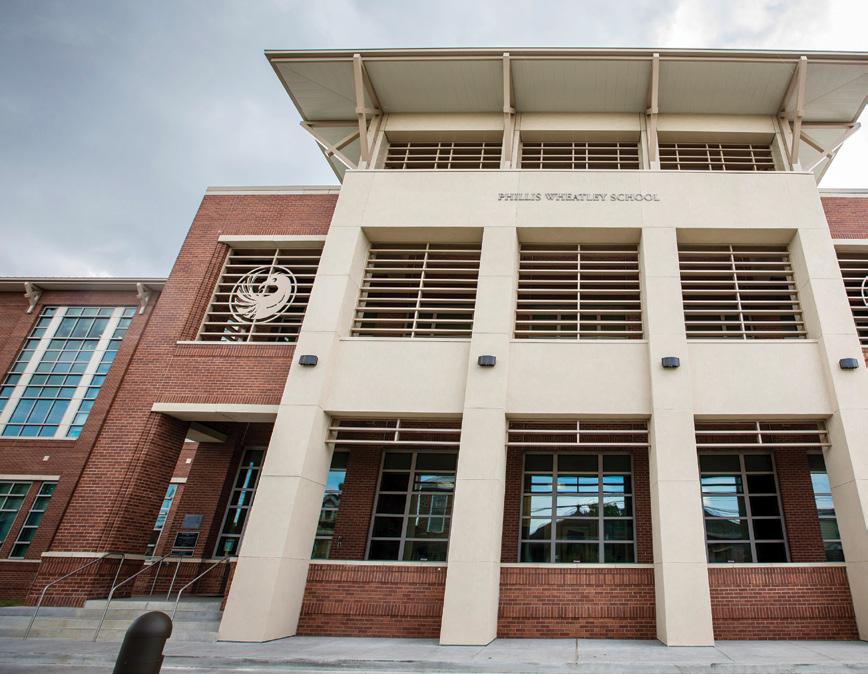
THOSE WHO LIVED through it can still smell the rot. They can still see the waterlines, hear the broken glass underfoot, feel the rough edges of the plywood as it’s nailed across a blown-out window. New Orleans residents who lived through Hurricane Katrina in 2005, and the aftermath in the city, will never forget the destruction and devastation that took place and changed their lives forever.
But eighteen years later, public-school buildings in New Orleans damaged or destroyed by the storm now have been rebuilt or restored in state-of-the-art fashion as a beacon of hope for the future.

“I had teachers tell me, even early on, that they felt like they must be in another city to see schools like this,” said Lona Edwards Hankins, director of major capital improvements for the state Recovery School District (RSD) from 2008 to 2017. “They couldn’t believe that this construc-

tion was happening in New Orleans.”
The largest school rebuilding program in U.S. history, completed in March 2023 with the opening of Dr. Alice Geoffray High School, marks a new beginning of an education system whose facilities had been deteriorating long before the levees failed. While Katrina floodwaters destroyed or severely damaged 110 of the 126 campuses, the New Orleans schools were already crumbling. Termites infested. Plumbing systems failed. Electrical and fire code violations were commonplace. And the hum of ancient air conditioners often prevented children from hearing teachers, if they worked at all. Katrina threw the final punch.
In 2008, the Orleans Parish School Board and the state Board of Elementary and Secondary Education adopted the School Facilities Master Plan as a
The largest school rebuild in U.S. history just wrapped up in New Orleans
long-term rebuilding strategy. It took 15 years, $2.1 billion in mostly FEMA funds and a change in federal disaster-response laws spearheaded by then-Senator Mary Landrieu to make it happen. It created 3 million square feet of classroom and other educational space at 32 new schools and 48 renovated or refurbished ones: 89 buildings in all. The former McDonogh 19—where Leona Tate, Gail Etienne and Tessie Provost helped integrate New Orleans public schools in 1960—became a community center with senior housing and a civil rights museum.
The RSD oversaw the entire project in collaboration with the Orleans Parish School Board, but parents, construction workers, engineers, architects and experts in everything from energy use to school design also had a hand in it. Up to six campuses would be under construction at one time, with each site employing 100 to 150 workers.
“Thousands of people were involved,” Hankins says, noting the difficulty of the logistics. “More than that, we were competing with ourselves.”
There was no easy phase in the process. Developing and revising the School Facilities Master Plan involved 200 public meetings. Downsizing the number of
schools was essential. The system had been built for 120,000 children. By Katrina, it enrolled 60,000.
Plenty of residents, scarred by years of empty promises and disregard, had little faith that new schools would be built in their neighborhoods. Doubts lingered even after then-Louisiana Education Superintendent Paul Pastorek pushed the district to quickly rebuild five new schools to demonstrate progress in the first years after the disaster.
“He wanted to give people hope,” Hankins says. “He wanted to be straight with people. “People would see other schools go up but did not believe theirs would.”
Rebuilding went into full swing after a $1.8 billion lump-sum payment from FEMA in 2010 provided funding stability and flexibility. Project managers looked to factors such as the status of historical and environmental assessments to determine construction sequence. Everybody wanted to know when the school for their neighborhood was coming.
“It was three-dimensional, ju-jitsu chess,” Hankins says.
In the midst of the construction chess game, the Orleans Parish public school district did its own drastic overhaul.
By 2019, it became the only all-charter public school system in the country—often cited nationally as the best example of the success of state takeovers, charters and choice. Before Katrina, 50 percent of public school students in New Orleans attended F-rated schools, according to Patrick Dobard, former RSD superintendent. By 2021, fewer than 10 percent fell into that category. The system’s shift to all-charter schools is widely credited with meaningful academic gains since Katrina even as the poverty rate among students has climbed. Dr. Avis Williams, superintendent of NOLA Public Schools, is convinced modernization and improvement of the school buildings themselves is having an impact, too.
“The places where our children learn matter,” says Williams, the first female leader in the district’s 181 years. “I think a lot of people don’t realize how amazing our buildings are.”
New Orleans schools today are healthy, high-tech structures where elements from lighting to classroom ventilation are designed to enhance learning. There are gyms, music rooms, science labs, 3-D printing labs, art rooms and playgrounds. State-of-the-art learning technology, energy efficiency and storm-protection are shared elements across new and renovated schools.
You can find them at New Orleans Charter Science & Mathematics High School, which opened in 2021 in the city’s biosciences corridor. Known as Sci High, the all-new campus includes engineering and science labs, flex-space classrooms and lecture halls to prepare students for study and work in science and technology fields.
In the Upper 9th Ward, Akili Academy operates out of the former William Frantz Elementary School, where 6-year-old Ruby Bridges walked up the steps of the all-white school in 1960. Its $24 million renovation combined restoration of the historic building with new elements like a black box theater, a computer lab and a garden. Bridges’ first-grade classroom was preserved and outfitted with period furniture, and there is a monument to her courage in front of the building.
New and restored buildings were built to LEED-certified standards that consider

sustainability, water savings, energy efficiency and indoor environmental quality. The schools were built with the goal of a 31 percent reduction in energy use. Technology monitors energy use and adjusts to use the least possible, explains Annie Clark, RSD chief operations officer.

Daylighting to maximize natural light was another source of energy savings, but a large body of research shows it also improves academic results. A 2003 California Energy Commission study, for instance, found that children in classrooms with high-quality daylighting progressed 20 percent faster in math and 26 percent in reading in one year compared to children whose classrooms had limited natural light.
Hardening structures against future storms was another common denominator. New windows can withstand 130 mph winds. Mechanical and electrical systems are installed above ground level to

minimize the danger of flooding. Terrazzo flooring on ground floors means schools can be cleaned and quickly put back into use.


“We wanted to be able to be back in a building within 30 days of an event,” Hankins says.
Additional storm-proofing measures were used at various sites. Andrew Wilson Elementary School’s first-floor walls are lined with three to four feet of waterproof fiberglass. Removable storm doors can be fitted onto the school’s main front doors to protect against flooding. Generators installed at some schools equip them to serve as community shelters in the event of a major storm.
There is no arguing that the rebuilding project’s completion is a milestone and something for the city and state to celebrate. Preserving the work comes next. This fall, New Orleans voters will be asked to renew for 20 years the district’s School Facilities Preservation millage, something Williams says is essential. For her part, Hankins hopes to see more investment in aging school structures across the state. She’s seen firsthand that an investment in the facilities is an investment in the children, is an investment in the future.
“The work is not done.” ■
AS LOUISIANA enters the election cycle this fall—with a spirit of inevitable change in state and local government—business leaders stand strong on their desire for a more pro-business climate in years to come. Louisiana companies invest in the state, its people, and its communities. They create jobs and invigorate the economy in significant ways. They are Louisiana Proud. Join us as we highlight some of the organizations and businesses who are dedicated to the betterment of Louisiana. Who are committed to the state and its people. Who are proud to call Louisiana home. Learn more about these LABI companies we are proud to call our own.
THERE IS PERHAPS NO BIGGER ISSUE facing economic development and education reform in Louisiana than early care and education. Businesses need reliable workforces, and economic developers around the state are reporting that more new businesses want statistics on carechildcare availability for their people before determining where to locate a new site.
While Louisiana’s youngest children are sometimes overlooked by policymakers, a new policy agenda aims to change that.
Geaux Far Louisiana is a comprehensive policy agenda that confronts poverty, racial inequality and historic under-investment in early childhood development. Led in part by the Louisiana Policy Institute for Children, a nonpartisan nonprofit, Geaux Far has developed a five-year plan calling for
transformational investment in Louisiana’s early childhood system to expand support for vulnerable Louisiana families.
Developed in partnership with parents, child care providers and advocates across the state, it lays out a detailed strategy to ensure all Louisiana families have access to well-funded early childhood care and a well-coordinated network of family-centered resources from healthcare to parenting support.
“It’s a bold plan, but we need to be bold for our children if we want them to thrive,” says Libbie Sonnier, Ph.D., executive director of the Louisiana Policy Institute for Children and co-chair of the 36-member Geaux Far Louisiana steering committee.

Geaux Far aims to overcome the state’s long-running place at or near the bottom of U.S. rankings of children’s wellbeing
through targeted investment in early childhood for its youngest children. The plan recognizes the impact of underinvestment in early childhood in Louisiana, including racial disparities such as a poverty rate among Black children that is three times that of white children. All told, just 40 percent of Louisiana children are socially and developmentally ready to succeed when they start kindergarten.
Geaux Far also acknowledges the link between child care and economic growth. Research by Nobel-prize winning economist James Heckman concluded such investment provides the best return of any use of public funds. Louisiana loses $1.3 billion annually to childcare breakdowns, including employee absences and turnover that cost businesses $762 million a year.
“This is a workforce issue,” Sonnier says.
New investment in high-quality early education for children ages six weeks to 3 years is fundamental to the plan’s strategy.
Research shows that 80 percent of brain development related to future learning and behavior occurs by age 3. Yet while more than 90 percent of atrisk 4-year-olds are enrolled in the LA4 preschool program, just one in 10 atrisk infants and toddlers is served by a publicly funded early childhood program.
The upshot is that Louisiana does not invest in early childhood when it provides the greatest benefit to young children in preparing them for success in school and life. Children with access to high-quality early education are more likely to read by third grade, graduate high school on time, and even less likely to become engaged in the juvenile or criminal justice systems.
Geaux Far also calls for a bigger voice for parents and providers in state and local policy and funding decisions. It proposes new high-level positions within
the state's Department of Education to elevate understanding of early childhood education as an essential component of the K-12 continuum.
“We need someone who understands that education doesn’t begin at age four,” says Rochelle Wilcox, executive director of Wilcox Academy for Early Learning, co-founder of For Providers By Providers and co-chair of the Geaux Far Louisiana steering committee. Wilcox was also named 2023 Early Learning Leader of the Year by the Louisiana Department of Education.
The plan articulates new ways to connect parents to a network of family-centered support that is more efficient than the current web of disjointed services.
“We have some great resources, but we need to link them to have a net that works,” Wilcox says. “Parents can’t go five places to get what they need.”
Geaux Far builds on recent advances
in early childhood education across Louisiana, including a record $52 million in new funding in the 2023-24 state budget. Bipartisan votes this year expanded maternity services and directed the Early Childhood Care and Education Commission to explore funding formulas for early childhood education.
Communities across Louisiana are investing, too, which includes the cities of New Orleans and Shreveport as well as Jefferson and Ascension Parishes. Other communities are exploring ways to make smart investments for children. A bill signed by Gov. John Bel Edwards after the 2023 legislative session authorizes the Monroe City School Board to propose a tax to fund early childhood education to local voters.

Sonnier sees reason for optimism as Geaux Far begins implementation.
“This is about dreaming big for our little people.”
ONE OF THE STATE’S OLDEST continuous law firms, Phelps may be the most uniquely Louisiana, helping businesses since 1853. The full-service law firm, founded in New Orleans, has since grown to 13 offices across the Southeast and even London with over 350 lawyers to help thousands of clients with legal matters.
“We strive to address and handle client needs wherever they arise,” says Ragan Richard, managing partner of the firm’s Baton Rouge office. “We do not grow for growth’s sake. Rather, we grow with our clients, working with them as they expand. Throughout the firm’s history, we’ve always focused on strategic growth, targeting the markets that matter to our clients across the Southeast. It’s remarkable how many large, thriving businesses incubated in Louisiana. Many of our clients have been with us since they started their business and they know that we will be there during the high and the low times, standing beside them every step of the way. We’ve become true friends with a lot of our clients, and that’s one of the most rewarding parts of our practice.”
The firm’s presence in maritime and
agriculture, a staple in Louisiana, has been deep and longstanding.
“We’ve got a big maritime and agricultural presence both in Louisiana and outside of Louisiana,“ says Richard. “We take pride in the work we get to do for the companies in these industries. You touch so many lives when you’re involved in industries like agriculture because there are so many families involved in it and so many resources that surround the industry that we can help with, like transportation and employment. It’s amazing to see Louisiana companies leading these industries and the impact our market has on the global economy.”
Phelps also supports the construction industry, which early on recognized the economic possibilities of building along the Mississippi River. “Our corridor is highly sought after and supports growth for Louisiana companies as well as companies wanting to expand operations into Louisiana,” says Dennis Blunt, vicemanaging partner of the firm’s Baton Rouge office. “Our longstanding partnership with this industry led to a different development and growth, in many aspects, than other
Louisiana-based firms, largely because of the age of the firm. We were here as this industry grew.”
The firm focuses on six core areas: admiralty, business, insurance, health care, labor and employment and litigation. With top-notch lawyers in Louisiana, Texas, Florida, Alabama, North Carolina and Mississippi, Phelps lawyers match the talent of the top law offices in New York and Houston, Richard says.

Knowing they are competing internationally, the firm is dedicated to staying abreast of the most current information using state-of-the-art technology. Through the Phelps Analytics Lab, in partnership with Tulane University, the firm has piloted programs using data analytics to identify business trends, develop litigation strategies and improve efficiency.
“We don’t just want to be good lawyers,” says Blunt. “We want to be good citizens, good family members and good community leaders.” Through measures like academic scholarships and pro bono legal services, the firm strives to make a positive contribution to the communities they serve.
purchased a dilapidated Alexandria lumber mill in 1923, he bought the plant, the office and all the equipment. At the time, he paid $32,000 and no timberlands were included. In fact, the lumber located at the mill wasn’t even part of the purchase. The Roy O. Martin Lumber Co. began without a single acre of land to its name. Today the company is the 20th largest landowner in the United States according to The Land Report publication, boasting 550,000 acres. It’s the largest private landowner in Louisiana.
“RoyOMartin is constantly looking for opportunities to acquire and upgrade our land base,” says Roy O. Martin III, chairman, CEO and CFO of RoyOMartin. “Our forestry group is world-class in silviculture and maintaining our Forest Stewardship Council certification since 2002. We are growing timber using genetically superior seedlings selected for the different soils four times faster than my grandfather, so the need for more acreage is reduced by this success for the current manufacturing facilities.”
Still headquartered in Alexandria, RoyOMartin now has two wood-product manufacturing facilities in Louisiana within 40 miles of its corporate office and will complete its third oriented strand board (OSB) plant in Corrigan, Texas this year. It is investing $9.5 million to modernize its plywood facility in Chopin. Because of RoyOMartin’s FSC certification, its customers are assured that the company responsibly sources raw materials from regional forests to produce “Made in the U.S.A.” OSB, plywood, timbers and boards in safetyaward-winning manufacturing environments. Its timberlands are available for a variety of purposes, including hunting leases and real estate purchases. In fact, the company has recently engaged in the M6 Pipeline venture, which will carry natural gas from northwest Louisiana to Lake Charles. And RoyOMartin’s commitment to excellence permeates everything the company undertakes.
“RoyOMartin is celebrating 100 years with a huge celebration in November. And we are committed to staying a privately
held, customer focused, ethically managed company for the next 100 years,” says Martin, noting that their commitment to the people and the state of Louisiana is unwavering. “We strive to be the company of choice for employees, vendors and customers.”

Martin maintains that the company’s employees—now totaling 1,300—are its number-one asset, many working for decades with RoyOMartin. To this end, its employee benefit program has been awarded a Top 5 Program for large manufacturing companies across the country. In addition, the Martin Foundation— the nonprofit arm of the company—exists to exhibit charity and philanthropy by supporting organizations whose missions are in line with those of the family business and its core values: respect, integrity, commitment, honesty and excellence (RICHES).
“These are the riches we strive for,” says Martin. “It’s a wealth that will not rust or be destroyed.”
WITH A REGULATORY
AS COMPLEX AS ITS GUMBOS, the state of Louisiana can be a challenging place for a business to tackle tax-related issues. Enter Ryan, a leading global tax services and software provider with the local expertise necessary to help Louisiana companies navigate the ever-changing tax landscape.
Founded in 1991 in Dallas, Ryan’s initial focus was on sales and use tax. In 2000, Ryan opened an office in Baton Rouge, its third outside of Texas.
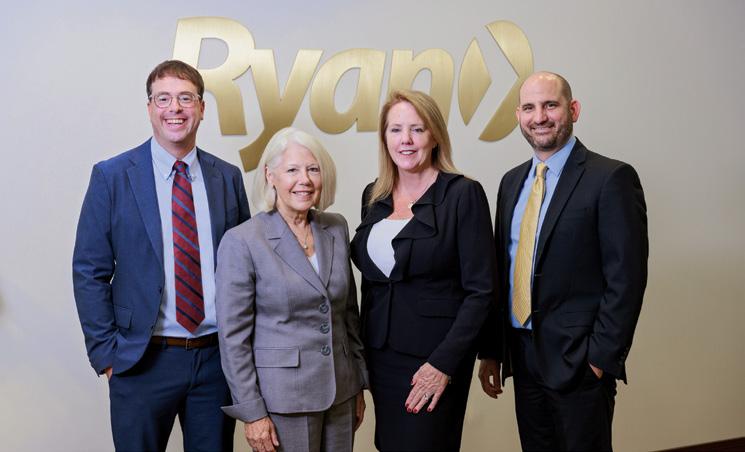
“When we first opened the Baton Rouge office, we were doing great work in Texas and a lot of our clients had similar issues in Louisiana, so we knew we needed to be where our clients were and to be able to service them locally,” says Matt Zagotti, Principal in Transaction Tax. “From a sales
tax perspective, state and local taxes can be complicated here. It’s like no other state in the U.S. So having professionals who deal with Louisiana tax matters every day is extremely valuable for our clients.”
Ryan’s Louisiana specialists provide a variety of distinct business-focused service lines: sales and use tax, property tax, credit and incentives, historic tax credits, new market tax credits, income tax, severance tax, fuels and excise tax, tax compliance, abandoned and unclaimed property, transfer pricing, and employment tax.
“Ryan is built around the concept of our team members working in structured teams under specific specialty areas,” says Susan Bittick, Principal in Controversy Resolution. It’s a concept that has proven beneficial for clients. The firm currently serves more than 600 clients in Louisiana while managing
more than 7,000 client assets. In 2022, Ryan secured more than $100 million in federal, state and local tax savings for its Louisiana clients.
“That was a major accomplishment and really showed the advancements that we’ve made,” says Sharon Roberts, Principal and Practice Leader of Credits and Incentives. “It highlights the organic growth that we’ve had here.”
Today, Ryan has more than 4,500 team members around the world, including more than 40 tax professionals locally led by four principals in its Baton Rouge and New Orleans offices. The firm’s Louisiana workforce has grown 300% over the past five years, with the New Orleans office expanding so quickly that the team is now moving into its fourth office in the past decade.
Much of that growth stems from the company’s ability to address multiple taxrelated needs. “One of the things that sets our firm apart is that we aim to be a holistic tax advisor and partner—a one-stop shop for our clients,” says Kevin Murphy, Director of Transaction Tax.
In October 2022, Ryan rolled out a Pledge to Taxing Authorities across the country, committing to work respectively and collaboratively. “We work every day with state and parish tax administrators, and we value those relationships,” says Karl Kehoe, Principal in Property Tax. “This feedback is important to ensure we are working effectively with tax administrators while representing our clients.” Tax administrators can access the online survey and submit comments that Ryan uses to improve its services. The desire to listen and address the feedback provided by government agencies makes Ryan a bestin-class firm, its leaders note.
With “Generosity Matters” as one of its
values, Ryan also seeks to give back to the local communities in which it operates. Once each quarter, employees in the Baton Rouge office gather in a conference room on a workday to prepare brown-bag meals for St. Vincent De Paul. Ryan team members in New Orleans and Baton Rouge also recently partnered to volunteer with the Junior League of Baton Rouge’s Diaper Bank. But the list of community partnerships doesn’t stop there; Ryan has helped with
Habitat for Humanity builds, Martin Luther King Jr. Service Day events, New Orleans’ Bugs & Brew contest benefitting cancer care, and disaster response initiatives.
Building upon Ryan’s Louisiana success, the firm is in the midst of a three-year partnership with the New Orleans Saints, making Ryan the team’s “Official Tax Partner.” Ryan and the Benson organization team up for community outreach initiatives, and the firm donates a portion of its Superdome suite to Louisiana nonprofits.
Whether watching a Saints game together, swinging hammers for Habitat, or leading a tax-themed discussion tour in partnership with local chambers of commerce, Ryan remains focused on building its presence in the Pelican State.
“Ryan is proud to be part of the Louisiana community and is committed to our Louisiana clients,” Zagotti says. “We might be a global tax firm, but our focus on Louisiana is the number one priority for our regional team members.”


NEW ORLEANS-BASED hospitality group Ballard Brands is bringing jobs to Louisiana through its expansion of brands like PJ’s Coffee, WOW American Eats, New Orleans Roast, Ballard Logistics and Ideation Hospitality. With the acquisition of Garces Restaurant Group, the company is bringing Garces Trading Company and Buena Onda featuring James Beard Award winner and Iron Chef Jose Garces, to Louisiana.
Ballard Brands was formed by brothers Paul, Steven and Scott Ballard. In addition to restaurant operations, management and franchising, it has a catering and special events business and a coffee and tea business. These four primary lines of business are managed from its headquarters in Mandeville.
The success of PJ’s Coffee has been an especially high point. In 2022, PJ’s Coffee was ranked #108 in Fastest Growing Franchises and #175 in the Entrepreneur Franchise 500 in 2023! Additionally, PJ’s ranked #48 for Fast Casual’s Movers and Shakers Awards in 2022, and it received the Satisfaction Award for Top Franchises with Franchise Business Review.
The retail coffeehouse chain was
founded in 1978 with a single shop in the Carrollton neighborhood of New Orleans. Today, there are more than 163 units in operation within the United States, as well as four international units, and the average unit volume is approximately $910,000.
New Orleans Roast also got its start in New Orleans, just blocks from the French Quarter, in 2008. It offers products and services to a wide variety of customers— restaurants, food service management companies, hotels and lodging, convenience and petroleum stores, offices and more. There are agreements underway to bring the brand into new areas of the country in 2023.
WOW American Eats, mainly positioned on college campuses, continues to be a fan favorite. The concept features fresh, neverfrozen chicken, with wings, tenders, burgers, salads and wraps highlighting the menu. With roughly 35 locations, the brand anticipates opening more combined locations of WOW American Eats and PJ’s Coffee across Louisiana campuses in the upcoming year.
In 2018, Ballard Brands expanded its restaurant holding through the acquisition of Garces Restaurant Group which includes several successful Latin-American
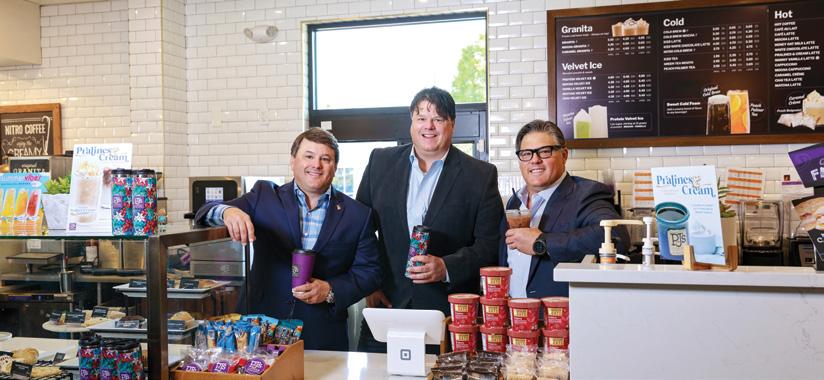
concepts in the northeast, including Amada, Distrito, Village Whiskey, JG Domestic, Volvér, The Olde Bar, Buena Onda, Amada, Distrito and Garces Trading Company, a collection of casual cafes.
Last year, Ideation Hospitality announced the franchising of Buena Onda Baja Taqueria. After opening five new flagship Buena Onda locations in Philadelphia in the past six months, Ideation Hospitality will bring the concept to Louisiana soon. Louisiana locations are also expected for Garces Trading Company.
Over the years, Ballard Logistics has focused on disaster relief efforts, becoming a leader in mass care/emergency response and remote site hospitality solutions. Formed in 2005 as a result of Hurricane Katrina and expanded upon in 2010 following the BP oil spill in the Gulf of Mexico, Ballard Logistics provided nearly 50,000 meals across several parishes for emergency responders and residents in the aftermath of Hurricane Ida last year. In 2021, Ballard Brands was honored with the Oscar J. Tolmas Charitable Trust Business of the Year Award by Junior Achievement.
THE BATON ROUGE ALLIANCE FOR STUDENTS ACTION is working to invest Baton Rouge’s leaders in public education quality. The organization, whose work focuses on what is best for students, instead of what is best for the system, ensures that a student-centered approach takes priority. In developing and training education advocates, the Alliance encourages them to ask how a particular decision affects children and use the answer as a guiding North Star when crafting education policies.
“Policy is our bread and butter, but we think of ourselves as less of a ‘think-tank’ and more of an ‘action-tank,’” says Baton Rouge Alliance for Students Action’s CEO Adonica Pelichet Duggan. “Coming off a successful election cycle in which we supported candidates in winning a supermajority of seats on the East Baton Rouge School Board, we continue to recognize the value of cultivating a cross-section of student-centered, and highly-motivated civic leaders.
The Alliance was formed in 2021,
with the vision of empowering families, elevating community voices and engaging both current and future leaders. Duggan says the politics of education are challenging, but that a desire to do what’s best for children can unite a diverse group of leaders. “Our key theory of action is to develop and support a pipeline of strong leaders who understand what it means to be student-centered, who are representative of their communities, and who are courageous enough to take on the challenge of elected leadership.”
Through CHANGEMAKERS, the Alliance’s 9-month long education-focused leadership development program, and TORCH, the organization’s candidate and campaign staff training academy, the Alliance homegrows the capital region’s next set of elected leaders, civic atdvocates, and political supporters.
“Both programs are no cost and nonpartisan,” says Liz Smith, the Alliance’s Chief Strategy Officer. “We need everybody from all political lenses and all backgrounds to be doing the right things

for kids.” The programs are just the start of the Alliance’s work, which includes not only leadership development, candidate training, and campaign support, but also board stewardship. “We believe an intentional and genuine relationship that both supports elected leaders and holds them accountable is critical for our work to be successful,” Smith says.
Baton Rouge’s education system is set up for progress, and with the right leadership and policies that give every child access to a high-quality school that fits their needs, the newly-elected school board can ensure a better economic future for Baton Rouge. The state is making great strides in issues like literacy and school finance transparency, and it’s critical that local leaders pick up the mantle to do their part. “That progress isn’t yet fully realized in Baton Rouge,” says Duggan. “But it will be. With the right set of leaders and policies, we can ensure every student in our city has access to their birthright of an excellent education.”
LAUNCHED IN 1935 to service the energy industry, Liskow’s founding attorneys had a significant impact in matters establishing Louisiana’s mineral and conservation case law.
Though its past is threaded directly to oil and gas production throughout Louisiana and Texas, new innovation for Liskow energy clients includes wind, solar, and carbon capture utilization and storage (CCUS) as the energy sources and low carbon technologies of the future.
Through generations, Liskow has not only evolved with renewable resources, it has been a dynamic driver of these alternative energy efforts as a leader in helping businesses make environmental and economic change here in Louisiana, across the Gulf Coast, and beyond.
CCUS can be a complex process, but Liskow prides itself in being a onestop shop for carbon capture solutions, crafting and negotiating property agreements with landowners, guiding clients through the developing regulatory maze, and navigating the state legislative process to update CCUS laws.

Future focused, Liskow’s foundation was laid almost a century ago, but its current roster of 150 attorneys across four offices in New Orleans, Baton Rouge, Lafayette and Houston has a progressive, inclusive and business-minded culture today. Fifty percent of its attorneys are diverse, and the firm services clients in the energy, environmental, and maritime sectors, as well as local and regional businesses in virtually all industries.
“As a mid-size, full-service firm with local history, we are able to provide high-quality legal services at a better value than our big law peers,” says Mark Latham, managing partner at Liskow, and an attorney with more than 30 years of experience in representing companies involved in the oil and gas and petrochemical industries.
Always willing to reevaluate itself, Liskow recently reassessed what its longstanding brand conveys to the public, leading to a complete rebrand in late 2022.
“As our clients across all industries undergo significant evolutions in their businesses, we believe our new brand authentically positions us as a progressive and cutting-edge law firm for all our clients’ needs,
|
now and in the future,” says Liskow Marketing Director Rachael Schilling.
In addition to a more navigable website, the firm rolled out a fresh visual identity and a crisp logo featuring a shorter name—dropping “Lewis” for the rebrand, though Liskow & Lewis remains the official name of the firm.
Along with a new look and timetested expertise with a vast array of business initiatives, Liskow’s comprehensive capabilities are even stronger with the addition of a government relations practice.
“We’re not down at the Capitol just reporting back on what transpired,” says Liskow environmental litigator Neil Abramson, a former member of the Louisiana House of Representatives and now a registered Louisiana Lobbyist. “We are proactively pushing legislation and advancing specific projects for our clients,
which really sets us apart.” Abramson’s experience serving as Chairman of both the House Ways & Means Committee and the House Civil Law Committee allows Liskow to develop and implement precise strategies, knowing in advance how to best position those plans for advancing or safeguarding client interests. In the past two legislative sessions, Abramson drafted and lobbied specifically on CCUS legislation, paving the way for Louisiana to become a national leader in CCUS projects.
This is evidence that Liskow is not just a law partner for its clients, but a dependable, cutting-edge business partner, too, Schilling emphasizes. This focus on client service and sustainability has been key to the firm’s expansion and its impact locally.
“We want to help Louisiana grow economically,” says Bob Angelico, leader

of Liskow’s tax practice who has worked closely with Fortune 500 companies and small start-ups for decades. Liskow carries a legacy of mentorship and handeddown expertise with a consistency that, in some cases, surpasses that of the state’s regulatory departments, which can experience more frequent turnover than the firm.
Many Liskow employees have spent their entire careers there, some for as long as 50 years. It is this stability of varied, high-level competencies inside and outside of the energy sector that Liskow has maintained for generations and that clients value most.
“Our expansion and our evolution have been very deliberate,” Latham says. “And through all of that, we have stayed true to our roots. Liskow has not lost its deep connection and commitment to the state of Louisiana.”
WITH MORE THAN 300 years of combined experience in K-12 and early childhood education, The Center for Literacy & Learning’s staff has an unwavering belief that it can help shift the trajectory of poor literacy outcomes for our state’s youngest learners, and it is hoping to move the discussion from the classroom to the community.
Only 28 percent of Louisiana’s fourth-grade students are reading proficiently, ranking the state 41st in the nation, according to the 2022 National Assessment of Educational Progress, the latest results available. Low literacy rates are linked to lasting consequences affecting our communities.

“We know from research that from birth to 8 years old, or third grade, is a critical stage in life for reading and language development. It is in these formative years
that we learn to read, so that, beyond third grade, we can read to learn,” says Dr. John Wyble, CEO for The Center. “We understand the implications of low literacy rates are much broader; and the solutions are not merely academic, but they’re collaborative.”
Students struggling in literacy at that third-grade marker are less likely to graduate high school, which then affects their lifetime earning potential, as well as business and industry’s ability to have an employable workforce, Wyble says.
The Center for Literacy & Learning, previously the Center for Development and Learning, is an educational nonprofit focused on closing the achievement gap among students by increasing teacher effectiveness and reaching families through community efforts. The agency is celebrating its 31st anniversary this year, as well as the 29th anniversary of
its annual conference, Plain Talk About Literacy and Learning® Institute, hosted in New Orleans. The conference is one of the largest gatherings of its kind, attracting the top experts on literacy research, instruction and early childhood development, as well as educators from 40 states and numerous countries.
The Center’s staff understands that it is critically important to get the latest research on literacy and the science of reading into the hands of Louisiana educators. Last year’s Plain Talk conference attracted 2,734 participants, with 26 percent of the attendees coming from Louisiana which is up from 1 percent prior to 2019, says DeJunné Clark Jackson, recently named President for The Center.
“The caliber of information that flows through the conference is top-notch,” Clark Jackson says. “When educators are
being trained on structured literacy, or the science of reading, and they open a manual or read a book or a research paper, those writers and those contributors are the presenters at the Plain Talk conference.”
Additionally, The Center is working to ensure it has the data to track its progress, and that there is accountability regarding the access to, and spending of, historic levels of funding made available to the state for education following the COVID-19 pandemic. The Center also works to lead change and reform at the legislative level, by supporting policy that is research and data informed.
“We believe one of the best things that we can do as a leader for Louisiana and beyond is to ensure that those decision makers are being held accountable through data and a discipline to models that we know work,” Wyble says.

A 360-degree approach – involving educators, families, business, industry and the community as a whole – is what is going to be necessary to make sustainable, impactful improvements in the area of
literacy. Wyble says his agency has spent time building models and mechanisms to look at data, to collect data that wasn’t being collected otherwise, and to be able to answer the tough questions that decision makers are asking.
families. To date, Louisiana Reads! has distributed more than 5,100 books and educated thousands of families, mainly in the Baton Rouge and New Orleans areas due to the location of funders. The hope is to gain more funding to answer the calls to bring the program into other parts of the state, Clark Jackson says.
Through community partnerships, The Center can also help to ensure that teachers in a specific area or region are getting the latest innovative instructional support and guidance.
Dr. John Wyble, The Center for Literacy & Learning CEOFor business and industry, there are opportunities to partner with The Center at any level of investment, including through The Center’s Louisiana Reads! program, which promotes at-home reading through book distribution and direct service to
“Time is of the essence,” Wyble says. “For that family of a child who is struggling to read, it’s their whole life we’re talking about, it’s their whole world. When you put it in that perspective, and view it through that lens, we must do ourvery best to get it right.”

“We believe one of the best things that we can do as a leader for Louisiana and beyond is to ensure that those decision makers are being held accountable through data and a discipline to models that we know work.”
FRANCISCAN MISSIONARIES of Our Lady University marked its centennial year with the June opening of St. Francis Hall, its first-ever major construction project and one that creates a 75,000-square-foot building to anchor an identifiable campus.
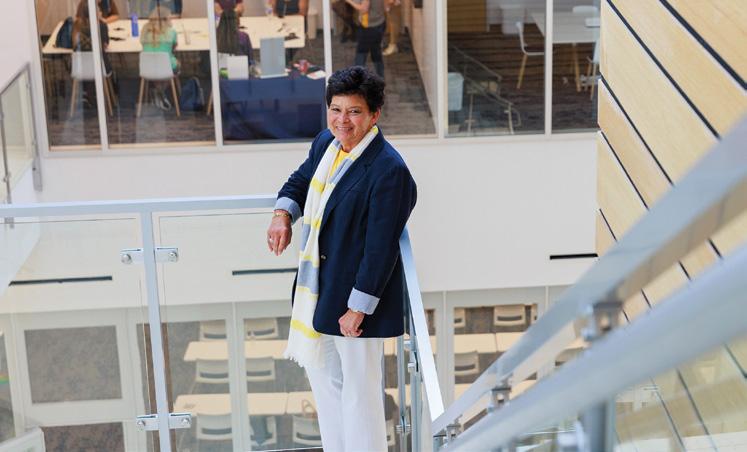
The $28-million building at Brittany Drive and Picardy Avenue is the initial element of a master plan to consolidate FranU into a smaller, unified campus for its nearly 1,300 students.
St. Francis Hall provides an unprecedented sense of place— academic, spiritual, communal—for a university that began as a nursing school in downtown Baton Rouge in 1923.
The three-story building hosts interdisciplinary academic and medicaltraining programs, student services and classrooms for graduate and
undergraduate students that make it a center of daily campus life.
It also contains the library, a chapel, a café and a world-class simulated training hospital on the second and third floors.
“St. Francis Hall has multiple uses so every student will use it,” says Tina Holland, Ph.D., FranU president.
The building also supports academic and medical-training programs that have expanded to include associate-to-doctorate degrees in health-focused fields and eight bachelor’s degree programs.
The first FranU building designed and built specifically for education, it brings together instruction and operations that had been scattered across a dozen refurbished medical buildings in the Picardy/Essen Lane corridor.
The 20,000-square-foot Simulated
Environment Teaching Hospital on the second and third floors, for instance, provides space for hands-on clinical practice in areas as varied as phlebotomy, surgery, home health and obstetrics.
Set up like a real hospital and roughly four times the size of FranU’s previous simulated training space, SETH’s clinical areas include emergency and operating rooms, an ICU, a NICU, a medical laboratory and a childbirth center.
Medical mannequins and trained volunteers replicate conditions and injuries that allow students to safely gain experience diagnosing and treating patients. Instructors observe from separate rooms so they can provide feedback to students about the simulated-care sessions.
Notably, St. Francis Hall’s design combines the human and the high tech.
Three modular, glass-walled classrooms on the first floor, for example, can be opened up to create a large space for ceremonies and other gatherings, including student welcome events that in the past were held under tents in a parking lot.
“We had no indoor space for anything like that in the past, so this is wonderful,” Dr. Holland says.
The building’s light-filled atrium will play an important if informal role in student life. The soaring space features sofas and over-sized steps where students can gather, study or take a break. Massive windows overlook an inviting outdoor green space—another FranU first.
The building is distinctly Franciscan, too. A laser-cut metal screen with the image of St. Francis rises three stories on the front of the building along Picardy. An enormous San Damiano cross handcarved in Germany hangs in the chapel.
A cherished symbol for Franciscans, the cross will be lighted and visible at night to passersby on Picardy and Brittany.
The chapel itself was funded in part with a $1-million gift from the Franciscan Missionaries of Our Lady Sisters, the founders of the university, and the Franciscan Missionaries of Our Lady Health System, the university’s parent organization.
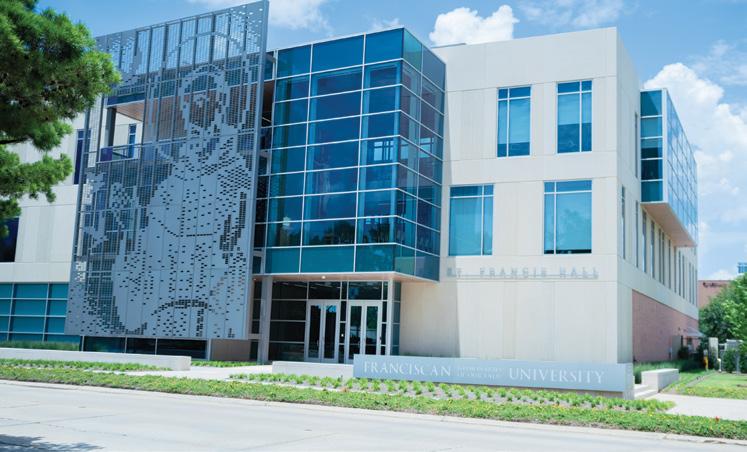
The building’s multi-use design is also in step with the Catholic intellectual tradition of interdisciplinary study of the human experience, including through art and literature, Dr. Holland explained.
The goal is to educate and form students, not just impart information and skills, she said.
“The idea is that having a clear understanding of the human condition will make you a better nurse or physician’s assistant,” says Dr. Holland, noting that FranU students take theology and liberal arts classes along with health-focused courses
The next phase of the campus master plan is the renovation of the School of Health Professions building on Picardy, work that will add 4,000 square feet of classroom and other space. University officials will evaluate the future of other buildings in view of their potential for multiple uses and the goal of a smaller campus footprint.
Construction of one additional large building to consolidate all levels of the nursing program at a single site is a longer-term element of the master plan.
For now, Dr. Holland describes St. Francis Hall as a blessing that aligns with the student-centered, multidisciplinary tradition of the Franciscan education model.
“At a very high level, it’s a physical symbol of preparing for the future for our students, for the university and for education that prepares well-formed students to serve in healthcare fields,” Dr. Holland says. “It helps our culture match our mission.”
A PLASTIC BOTTLE filled with rocks and sand helped set Pamela Granger on the path to a career as a civil engineer.

She was in sixth grade at the time, and the water filtration system that she and a partner created with an empty bottle of Sunny Delight wound up taking them to the regional science fair. “That really inspired me,” Granger recalls. Two years later, a career aptitude test confirmed her enthusiasm when it suggested she might make a good lawyer or engineer.
“My dad was a mechanic, and I used to help him fix things,” the Youngsville native says. “So in my mind, by becoming a civil engineer, I could fix things much like I had enjoyed doing with my dad. That has inspired
me throughout my entire career.”
Working primarily with government clients, Granger has embraced the role of problem solver through the work of her company, McBade Engineers and Consultants. She launched the business in her hometown in April 2016 after more than two decades spent rising through the ranks at engineering firms in Lafayette and Florida and back in Louisiana again.
“I had traveled around the country and loved getting to see bigger-picture projects and different perspectives, and when I came back, I realized that I wanted to start bringing some of that here,” she says, noting that drainage has been a particular focus. “I decided
to go out on my own so that I could bring my large-firm perspective while helping some of the local municipalities truly change and grow responsibly.”
That focus was called into action immediately after the firm’s launch, as the August 2016 floods hit Youngsville especially hard. While working to rebuild her own flooded home, Granger set her sights on helping the city recover as quickly as possible. “I had already been screaming from the rooftops about drainage when a lot of people didn’t think there was an issue, and then we had this historic flood,” she says. “It catapulted our company into the center of that effort. Everybody’s quality of life in Youngsville was dependent on us, and that was a lot
of weight, but we rose to that challenge.”
What started as a team of five people has grown to 15 employees, and McBade is now responsible for some of the biggest flood retention projects in the state. Of more than 130 projects approved through FEMA’s Hazard Mitigation Grant Program after the 2016 flood, Granger says the two detention ponds that McBade is building are the only ponds that have made it to the construction phase. “We take great pride in the fact that we’ve navigated the state and federal systems, worked with our clients, and are getting projects finished,” she says. “We’ve made a name for ourselves. With all of the detention projects we currently have, McBade alone is responsible for moving 7 million cubic yards of dirt to create 7 million cubic yards of storage for water.”
Granger came up with her firm’s name by combining the initials of her six nieces and nephews. The moniker is indicative of McBade’s company culture, which she sums up in a single word: family. One of her nephews now serves as a project assistant, and two of Granger’s siblings also work for the firm, but the family focus extends to each of her employees. The group eats lunch together each day, and Granger
brings in breakfast every Friday as the team discusses projects and challenges. A robust holiday office closure calendar, flexible schedules, complimentary office snacks and soft drinks, onsite fitness equipment, and company-paid medical and dental insurance are among the other benefits that Granger deems important for her team.
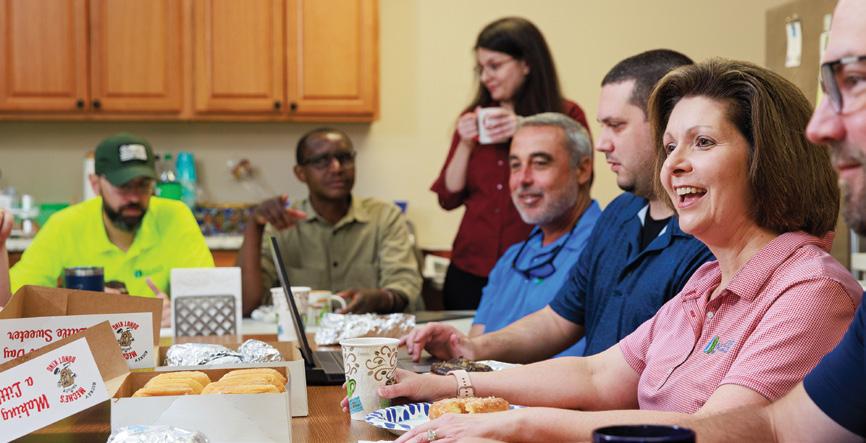
“We didn’t let the flood define us. What the flood did instead was make us get more creative, and make us work harder and faster and do things differently.”
--Pamela Granger“I don’t treat anybody any differently than I would treat my own siblings,” she says. “We have a very, very close culture. What I have found is that if you have a family-oriented and understanding environment, you have productivity and you have great brainstorming and networking. I don’t think any one person holds the solution to any project; it takes the whole firm to provide the services that we provide to our clients.”
In addition to its high-profile drainage projects, McBade helps its clients— which include Lafayette Consolidated Government, the city of St. Martinville, the town of Church Point and several
independent water districts, among other entities—with water, sewer and roadway initiatives. “We are truly consultants, able to give them advice and be there for the areas that they might not have expertise in internally,” she says. “That involves understanding what every mayor, every parish president or county manager goes through so that we can help them. I go out of my way to help my government clients find funding, show them how they can do things in phases, and then truly present the value of the project to them.”
Looking forward, Granger’s goals are to take on more state and federal work, as well as to help other areas of Louisiana find solutions to their repetitive drainage issues. Meanwhile, her team is working on the widening and reconstruction of Youngsville Highway 89, to meet the needs of what is now Louisiana’s fastest-growing city. For Granger, it’s simply the latest effort in a lifetime spent overcoming obstacles.
“I get a lot out of driving around and seeing people enjoy some of the things that I’ve helped to build with a client,” she says, “but also seeing people get back their quality of life when we fix a problem.” ■
LWCC bucks the basic office standards with a wellness-centered working space that meshes with its mission
 BY KELLI BOZEMAN
BY KELLI BOZEMAN
MONDAY BLUES? Not when your workday begins with a stroll along an outdoor walking path. A morning break or quick meeting might be spent in a sun-filled lounge area overlooking the oaks.


No need to battle Baton Rouge traffic during lunch hour, when a chef-prepared rosemary-balsamic pork loin is the special of the day right here. Need to shift gears after a busy day? Just head down to the onsite fitness center, where the toughest decision is whether to hop on one of the three types of stationary bikes, meet with a personal trainer for a cardiovascular evaluation, or join your colleagues for an exercise or meditation class.
Amenities like these might not be typical for a corporate office building outside of Silicon Valley, but they’re part of the new norm for the Louisiana Workers’ Compensation Corporation’s renovated headquarters. Located on busy Acadian Thruway in the Capital City, the facility underwent an overhaul aimed at aligning the private nonprofit mutual insurance company’s physical space with its overall mission of “bettering Louisiana one business and one worker at a time.”
LWCC purchased this 130,000-square-foot building in 1994, a decade after it was constructed. The company inherited a cobbled-together assortment of suites on different floors and expanded its footprint to fill most of them over the ensuing decades. “The spaces weren’t really connected at all,” explains LWCC senior vice president and CFO Gretchen Hofeling, who served as the lead on the renovation project. “Most of them hadn’t been updated in many years.” What ultimately sparked the push for a major remodel was the need for a new HVAC system to replace elements that were original to the building. With such a major project looming, the company’s leadership team decided to broaden their scope in order to update the building as a whole. “We looked at redesigning
the building to really be the space of the future for our employees, but also to improve our little area of the community,” Hofeling says. With the company’s tagline of “Louisiana Loyal” in mind, LWCC selected New Orleans firm EskewDumezRipple to take the lead with the architecture and interior design. The project team also included general contractor Milton J. Womack Inc. and landscape architecture firm Suzanne Turner Associates. MKE Architects served as construction manager, while Thompson Building Energy Solutions acted as LEED consultant. Associated Design Group handled mechanical, electrical and plumbing engineering, and Fox-Nesbit Engineering oversaw civil and structural engineering. Audiovisual and security elements were the responsibility of HMA Consulting.
For LWCC executives, being mindful of their employees’ wellness went hand in hand with being mindful of the environmental impacts of the renovation.


Using a floor-by-floor approach that allowed LWCC to occupy the building throughout the construction process, the renovation team carefully separated materials removed during demolition so that they could be reused or recycled. The new design also included an emphasis on “daylight harvesting” in which natural light helps to reduce the amount of electricity used from artificial lighting, and environmentally friendly LED lighting took the place of less-efficient older lighting systems.
Wood floors were finished with environmentally friendly sealants, and materials with low or no-VOCs were used throughout each area. An electric vehicle charging station was added to the parking garage, and water bottle refill stations were installed throughout the building. All these efforts resulted in the facility being awarded a LEED silver certification.
Indoor air quality was another important consideration, even as the project began before the COVID
pandemic prompted companies around the country to consider ventilation and air purification. A new dedicated outdoor air system with energy recovery ventilation pumps the building full of more than twice the amount of fresh air that a typical HVAC system provides. While things like air quality and lighting enhanced the building behind the scenes, EskewDumezRipple was also busy creating an aesthetically pleasing atmosphere in which LWCC’s 200-plus employees could be comfortable and
productive. The new color palette pulls from the natural environment with a range of neutral tones punctuated by soothing blues and greens. “We also asked them to do research on the natural light, and they came back and said that it provides a lot of health and wellness benefits to employees,” Hofeling says. “So that became one of our non-negotiables; we wanted all of our employees to have access to natural light.”

The former layout included private offices along the perimeter of each
floor and cubicles in the center, but in pursuit of their new goal, LWCC flipped that concept to put glass-fronted offices on the interior, workstations nearer to the windows, and a perimeter walking path closest to the windows around each space. “It just makes it feel really light and bright and open,” says Hofeling. “It encourages cooperation, and everyone is able to enjoy the views of all of the trees outside.”
Open stairwells on opposite sides of the building connect floors and encourage movement throughout each space. When employees need privacy, they can seek out the new chat rooms, small soundproof spaces with frostedglass windows that were designed in two styles: one with a comfortable chair and just enough room to make a confidential call, and another with a built-in desk that allows for a quieter work environment. AOS Interior Environments provided sleek sofas and chairs for lounge areas, as well as workstations with sit-stand desks and task chairs. “We let employees in each department vote on the style of the workstations and chairs,” Hofeling says. “So they actually picked which pieces we ultimately selected.”

The contemporary-leaning design is dotted with details indicative of the Bayou State, from a massive live oak graphic in the entryway to a wall of reclaimed Louisiana barn wood in the first-floor Foster Learning and Conference Center. Baton Rouge-based interior designer Ty Larkins took on the task of furnishing that learning and conference center space with an emphasis on flexibility to accommodate different types of events, from team-building activities and a speaker series to coffee talks with company president and CEO Kristin Wall. LWCC is also working with Baton Rouge ceramic artist Michaelene Walsh and the Baton Rouge Gallery to create and curate a series of artworks highlighting Louisiana workers and industries, which are slated to fill these walls by year’s end.
The 4,000-square-foot onsite fitness center welcomes employees between the hours of 6 a.m. and 6 p.m. each day.

Offerings include treadmills, elliptical machines, free weights, a rowing machine and more, and more than 70% of employees take advantage of these amenities. “It has best-in-class equipment and really amazing trainers who encourage and help employees,” Hofeling says. “Employees are encouraged to go to the fitness center whenever they want to, including during work hours.”
Beyond fitness, LWCC offers its employees wellness classes on a range of topics in categories from physical and financial to mental wellness. “We’ve put a lot of thought into that,” Hofeling says. “We wanted to include a variety of programs to try to encourage our employees to be healthy. If we treat our employees well, they’re going to treat our customers well, and that’s making Louisiana a better place to be. It all starts with taking care of those employees.”
Having a hot and healthy meal
accessible onsite is another tangible employee benefit. Baton Rouge General delivers meals to the onsite café Monday through Friday, with an ever-changing menu that balances taste, nutrition, convenience and affordability. A recent week’s offerings included garlicrosemary-balsamic pork loin served with a side of cauliflower, tomatoes and cucumbers; chicken enchilada bowls with cauliflower Spanish rice, peppers and onions; and New Orleans-style shrimp and grits with a Cajun cream sauce and braised greens. Employees can enjoy these meals in booths in the café or perhaps head outside to the expansive plaza, which offers another impromptu meeting space option, while doubling as a venue for larger company events like the crawfish boils that took place this past spring.
The proof that all of these resources are truly resonating with the company’s
workforce is shown in the number of employees who choose to come in to the office even on days when remote work is allowed. “A lot of that is the wellness aspect,” Hofeling says. “They also enjoy their coworkers and having the ability to collaborate in the building, and all of these spaces allow us to really learn and grow together.”


That collaboration bears fruit in the
innovations that Hofeling says are helping to push the company forward in its service to stakeholders. “We are focused on our core business and the Louisiana Loyal initiative, and the new design helps with both of those,” she says. “These spaces are allowing us to make connections while we’re also trying to improve, elevate and celebrate Louisiana.” ■

AT LABI, we know how to throw a party, and our 2023 Annual Meeting festivities were no exception. To kick off the 2023 LABI Annual Meeting we held our Member and Legislative Reception at the LABI Center for Free Enterprise for our friends, legislators and LABI members from all over the state. Following the reception, on March 2nd we hosted one of the largest LABI annual meetings in history at the Crowne Plaza Hotel in Baton Rouge! It was a great success and we’re already looking forward to next year.













to
LABI held its 2nd Annual Back to Business party to kickstart the 2023 Legislative Session on April 10. The event featured the band After8 and was sponsored by AT&T, Origin Bank, Air Products and Louisiana Internet & Television.












LABI’s Emerging Leaders Council convened in Baton Rouge for two days earlier this summer, May 18–19. The group received updates and insight from the LABI staff during lunch before heading to the Capitol to visit the House and Senate chambers and be recognized on the Senate floor.





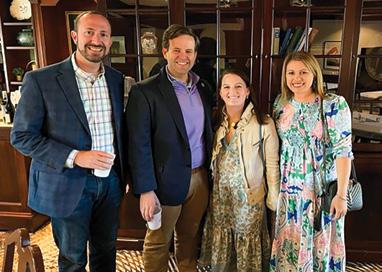


Nineteen teams bundled up and faced a 27-degree morning at Squire Creek Country Club in Choudrant for LABI’s 2023 PAC Golf Tournament. No surprise, there was a frost delay. But that didn’t slow down the fun, which started the night before at the “cowboy casual” cocktail party featuring fan favorite, Parish County Line.
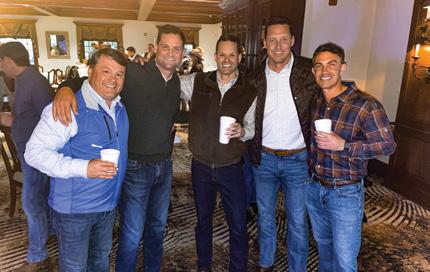
Our 2023 LIC Tour was one for the books as we traveled across the state visiting with our local chamber partners ahead of the 2023 Legislative Session to talk about LABI’s policy priorities and LA23. Check out just a few of our stops!









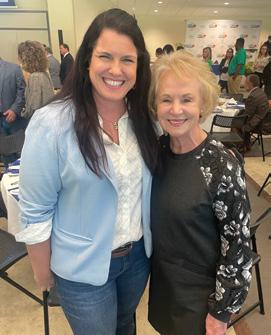



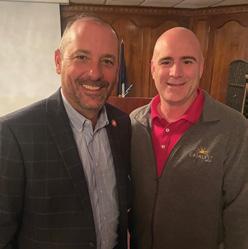
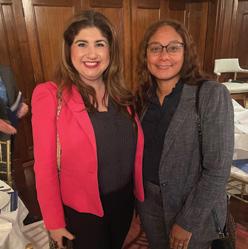

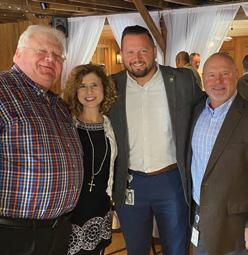










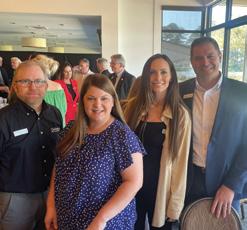





On Wednesday, May 10, members of the Louisiana Association of Chamber of Commerce Executives (LACCE) gathered at the LABI headquarters to get updates on the Legislative Session before attending the Grow Louisiana gubernatorial panel followed by a reception.


EVEN DURING THE PRE-SHOW networking hour, there’s a palpable, expectant energy in the room, one that looks like a well-designed entrepreneurs’ playground, and a little bit like prom for thirtysomethings. The message everywhere is clear. Anything can happen once guests walk under the balloon arches and into the forward-thinking world of Assembly Required—a series of non-profit, civic-minded business summits in Baton Rouge curated by creative agency ThreeSixtyEight and two of its principals, CEO/Co-founder Kenny Nguyen and Chief Growth Officer, Adrian Owen Jones.
“The real value I see in Assembly Required is the mix of people that gather at these, and that it’s a lot of younger Baton Rougeans getting engaged,”
Adam Knapp, president and CEO of the Baton Rouge Area Chamber says over appetizers and small talk. “Usually, I go to an event, and I immediately know 30 percent of everyone there. Here, it’s more like 5 percent. And everyone is genuinely interested in making their business and their community better.”
Orbiting a bar, leather couches and an extensive swag table, there’s a chill DJ, a letterpress cranking out vivid prints, towers of giant Jenga blocks, and a pingpong table. Branded in Matisse-like cutout colors, prompt cards are scattered on tabletops asking beyond-business questions like, “How can we cultivate empathy and understanding through our interactions?”
Tacos and bruschetta are hand-passed as guests mingle and cloudy white billows curl into the room from a hidden fog machine. Later, Alison Lands will raise awareness of the intersection of AI and business, a local panel will discuss the future of talent, and Justin Harlan, founder of Tulsa Remote, will muse on the evolution of work spaces and workflows. And yet Assembly Required displays its propulsive essence early on when Nguyen first bounds on stage.
“Holy s***, Baton Rouge! What’s Up!” the CEO says to a thunder of applause. “This event is meant to bridge and build relationships, especially with people you would not normally meet, because that’s when real innovation can happen. We

are really about seeing problems with new eyes because there are different folks at your table helping you to solve them. So, we need you in this room. This is the room where change happens.”
Nguyen and Jones believe Baton Rouge has the potential to be a real creative capital in the South, one that can attract a deep talent base and a thriving community. That’s why they’ve given this year’s events the theme “Underdogs,” and they want to build more interactivity into each Assembly Required.
“Underdogs’ just resonates,” Jones says. “Because it’s not just ‘At least we aren’t last place.’ It’s saying ‘No, we’re going to rise up.’ And that intention with community and confidence is why we always end the event by saying ‘Why not us?’.”
Assembly Required returns Sept. 21 with an event focused on “How to build an uncommon brand,” says Jones, who currently is working to secure speakers from Reddit and Apple. Tickets go on sale roughly three weeks prior to the event. For updates and more details, visit assemblyrequiredla.com. ■














MAJORITY OF OUR FUEL IS SOLD IN LOUISIANA AND MISSISSIPPI

OVER 1 BILLION GALLONS OF GASOLINE AND DIESEL
1 OF EVERY 4 GALLONS AT LOUISIANA PUMPS IS SUPPLIED BY PLACID PRIMARY SUPPLIER OF 95% OF EMERGENCY FUEL
PLACID FIVE YEAR ECONOMIC IMPACT
82,000 BPD PROCESSING CAPABILITY

$2.5 BILLION IN FEDERAL, STATE & LOCAL TAXES
1,000 DIRECT, INDIRECT & INDUCED ANNUAL JOBS

NEARLY $175 MILLION IN WAGES
